Roadmap Video Series: Person-Centered Care: Chapter 2
- September 23, 2019
- Posted by:
- Categories:
With an extensive background in health care leadership and policy, Andy brings a wealth of experience advancing innovation and value-based care to improve Americans’ health. Andy holds key leadership positions in the private and non-profit sectors, including as a commissioner on the National Academy of Medicine’s Commission on Investment Imperatives for a Healthy Nation. He is a founder and Board Chair Emeritus of United States of Care, a national non-profit health advocacy organization, as well as a founding partner of Town Hall Ventures, a healthcare firm that invests in underrepresented communities. He has also co-chaired a national initiative on the future of health care at the Bipartisan Policy Center.
Andy’s experience includes serving as President Obama’s head of Medicare and Medicaid, were he led many of the nation’s most important health care initiatives and oversaw the turnaround and implementation of the Affordable Care Act. He was also a member of President Biden’s President’s Council of Advisors on Science and Technology (PCAST) working group on public health and the White House Senior Advisor for the COVID-19 response.
Government Regulation and Guidance
Updated Centers for Medicare & Medicaid Services Health Equity Framework
Initiative Description: The Centers for Medicare & Medicaid Services (CMS) has updated the agency’s Framework for Health Equity, expanding upon its initial 2022-2032 priorities. The five priorities for reducing disparities in health include: expanding the collection, reporting, and analysis of standardized data; assessing causes of disparities within CMS programs, and addressing inequities in policies and operations to close gaps; building capacity of health care organizations and the workforce to reduce disparities in health and health care; advancing language access, health literacy, and the provision of culturally tailored services; and increasing all forms of accessibility to health care services and coverage.
Strategic and Tactical Uses: The Framework offers insight on alignment priorities for health equity data collection, sharing, and use to reduce observed health disparities.
Multi-payer Alignment Foundational Element: Whole Person Care
Timeframe: Active
For additional information, please visit https://www.cms.gov/About-CMS/Agency-Information/OMH/health-equity-programs/cms-framework-for-health-equity
Who Might Use This: ![]() Health Plans |
Health Plans | ![]() Purchasers |
Purchasers | ![]() Providers |
Providers | ![]() Policy Makers |
Policy Makers | ![]() Enabling Organizations |
Enabling Organizations | ![]() Community-Based Organizations
Community-Based Organizations
Alignment Resources and Helpful Documents
The Maternal Health Hub’s Maternal Health Quality Report
Initiative Description: The Maternal Health Hub was a forum to share learnings and best practices, payment reform evidence, and resources to accelerate the identification and dissemination of effective value-based care delivery and payment strategies for maternity care. The Hub produced guidance on the development and implementation of maternity patient reported experience measures (PREMs) and patient reported outcome measures (PROMs) by identifying innovative patient-focused measures to fill existing measure gaps.
Strategic and Tactical Uses: While the hub no longer meets regularly, this framework was one of the first to focus specifically on a priority area like maternal health/birth outcomes and can serve as a model for other prioritized public health domains with implications for quality measure alignment and health equity.
Multi-payer Alignment Foundational Element: Whole Person Care, Performance Measurement and Reporting
Timeframe: Archived
For additional information, please visit https://maternalhealthhub.org/wp-content/uploads/2023/04/Evolving-the-Quality-Measurement-Enterprise_Final-Brief.pdf
Who Might Use This: ![]() Health Plans
Health Plans
Collaboratives and Innovative Partnerships
The Gravity Project
Initiative Description: The Gravity Project advances equitable health and social care by developing consensus-driven standards on social determinants of health (SDOH). The Gravity Project focuses on: (1) creating universal definitions of different social needs to be used in the health care space, (2) improving standards for recording, documenting, and exchanging SDOH information, and (3) testing evolving terminology and data exchange standards through affinity groups.
Strategic and Tactical Uses: Individuals and organizations can join the Gravity Project to work toward the shared goal of health equity across cultural, institutional, and social contexts. Interested parties can implement the shared technical and terminology standards to streamline data sharing for SDOH screening questions. Doing so can reduce inefficiencies from using different standards across different health care and social service organizations.
Multi-payer Alignment Foundational Element: Timely and Consistent Data Sharing, Whole Person Care
Timeframe: Active
For additional information, please visit https://thegravityproject.net/overview/
Who Might Use This: ![]() Health Plans |
Health Plans | ![]() Providers |
Providers | ![]() Community-Based Organizations
Community-Based Organizations
Collaboratives and Innovative Partnerships
The Center for Medicare & Medicaid Innovation Models
Initiative Description: The Center for Medicare and Medicaid Innovation develops new payment and service delivery models in accordance with the requirements of section 1115A of the Social Security Act. In 2021, the Innovation Center set a strategic goal for its next ten years: to transform the health system into one that achieves equitable outcomes through high-quality, affordable, person-centered care. As part of this, the Innovation Center aims to design models that are inclusive of a variety of providers to increase beneficiaries’ access to high-quality care. Model categories include accountable care models, disease-specific and episode-based models, health plan models, prescription drug models, state and community-based models, and statutory models.
Strategic and Tactical Uses: Innovation Center models have implications for multi-payer alignment efforts across several priority areas, including increased integration of specialists and safety-net providers in value-based care, integration of behavioral health services, alignment of quality measures, and health equity initiatives.
Multi-payer Alignment Foundational Element: Aligning Key Payment Model Components, Performance Measurement and Reporting, Whole Person Care, Timely and Consistent Data Sharing, Providing and Leveraging Technical Assistance
Timeframe: Active
For additional information, please visit https://www.cms.gov/priorities/innovation/models#views=models
Who Might Use This: ![]() Health Plans |
Health Plans | ![]() Purchasers |
Purchasers | ![]() Providers |
Providers | ![]() Policy Makers |
Policy Makers | ![]() Enabling Organizations |
Enabling Organizations | ![]() Community-Based Organizations
Community-Based Organizations
Collaboratives and Innovative Partnerships
Partnership to Align Social Care
Initiative Description: The Partnership to Align Social Care convenes health stakeholders to develop strategies that enable partnerships between health care organizations and networks of community-based organizations (CBOs) delivering social care services. The Partnership provides thought leadership on ways to address health-related social needs with CBOs, contracting and billing guidance between health care and community care networks, and how to integrate health equity into clinical care.
Strategic and Tactical Uses: Value-based care provides an opportunity for organizations to develop payment arrangements that include services related to health equity. Organizations should look to the Partnership to determine how to work with CBOs and better integrate health and social care in their contracts.
Multi-payer Alignment Foundational Element: Aligning Key Payment Model Components, Whole Person Care
Timeframe: Active
For additional information, please visit https://www.partnership2asc.org/
Who Might Use This: ![]() Health Plans |
Health Plans | ![]() Providers |
Providers | ![]() Community-Based Organizations
Community-Based Organizations
Collaboratives and Innovative Partnerships
North Carolina Healthy Opportunities Pilots
Initiative Description: The North Carolina Health Opportunities Pilots (HOP), part of NC’s Section 1115 waiver, is a comprehensive program dedicated to solving non-medical needs for Medicaid enrollees. HOP covers the cost of 29 interventions defined and priced in the Department of Health and Human Services’ Pilot Fee Schedule, including housing navigation and move-in fees, food and nutrition access care, transportation reimbursement, and violence intervention services. The North Carolina Department of Health and Human Services intends to expand HOP services to new populations beginning with those eligible for Tailored Care Management.
Strategic and Tactical Uses: HOP is the country’s first comprehensive program to reimburse for such a broad set of services and, unlike traditional Medicaid services, supports the enrollee and their family (e.g., an enrollee who is food insecure will receive a food box covering the entire family). Other states can use North Carolina’s HOP program to evaluate the benefits of non-medical interventions. Based on the reports from the Department of Health and Human Services, similar programs can be implemented across other states, helping to reduce health care costs and improve population health.
Multi-payer Alignment Foundational Element: Whole Person Care
Timeframe: Active
For additional information, please visit https://www.ncdhhs.gov/about/department-initiatives/healthy-opportunities/healthy-opportunities-pilots and https://ncmedicaljournal.com/article/94844-reflecting-on-nearly-two-years-of-north-carolina-s-healthy-opportunities-pilots
Who Might Use This: ![]() Health Plans |
Health Plans | ![]() Providers |
Providers | ![]() Community-based Organizations
Community-based Organizations
Collaboratives and Innovative Partnerships
NCCARE360
Initiative Description: NCCARE360 is a statewide network that unites health care and human services organizations with a shared technology. The NCCARE360 implementation team includes United Way of North Carolina/NC 211, Unite Us, and Expound Decision Systems. These organizations link people and families to free and local health and human services resources, offer a platform for secure and timely care coordination and outcomes, and create a data repository model to manage social determinants of health resources in North Carolina.
Strategic and Tactical Uses: North Carolina community-based organizations, health plans, and health systems can join the NCCARE360 network and gain access to the resources that they provide. Outside of North Carolina, organizations can look to form a public-private partnership like NCCARE360 and create a similar cross-sectoral referral technology platform or expand their current platforms to a statewide scale.
Multi-payer Alignment Foundational Element: Timely and Consistent Data Sharing, Whole Person Care
Timeframe: Active
For additional information, please visit https://nccare360.org/
Who Might Use This: ![]() Health Plans |
Health Plans | ![]() Providers |
Providers | ![]() Enabling Organizations |
Enabling Organizations | ![]() Community-Based Organizations
Community-Based Organizations
Collaboratives and Innovative Partnerships
National Committee for Quality Assurance Health Equity Accreditation Programs
Initiative Description: National Committee for Quality Assurance’s (NCQA) Health Equity Accreditation and Health Equity Accreditation Plus are a guide to help health systems, health plans and other care organizations advance health equity. The programs assist organizations in meeting their health equity related goals by building an internal culture that supports the organization’s external health equity work, identifying opportunities to reduce health inequities and improve care, collecting data on community social risk factors and patients’ social needs, and establishing partnerships that support community-based organizations.
Strategic and Tactical Uses: Many organizations are pursuing NCQA’s Accreditation to realize their health equity goals, and Accreditations are increasingly required by state Medicaid agencies for participating plans. Widespread adoption of NCQA’s Accreditation will help accelerate the shift toward more equitable, effective, and sustainable health care practices. The collective effort also supports a cultural shift within the health care industry, prioritizing and normalizing equity as a fundamental aspect of quality care.
Multi-payer Alignment Foundational Element: Whole Person Care
Timeframe: Active
For additional information, please visit https://www.ncqa.org/programs/health-equity-accreditation/
Who Might Use This: ![]() Health Plans |
Health Plans | ![]() Providers |
Providers | ![]() Policy Makers
Policy Makers
Alignment Resources and Helpful Documents
HCPLAN’s Guidance on Social Risk Adjustment
Initiative Description: The HCPLAN’s Health Equity Advisory Team (HEAT) meets regularly to identify and prioritize opportunities to advance health equity through alternative payment models (APMs). The HEAT’s Advancing Health Equity Through APMs Guidance on Social Risk Adjustment provides health care entities with a starting point for action by offering guidance on three core components of social risk adjustment: data collection (e.g., tools to social risk factors such as housing, food security, and transportation needs), payment incentives and mechanisms, and care transformation.
Strategic and Tactical Uses: For organizations collecting data on social risk factors, the HEAT guidance offers recommendations and considerations on how to incorporate those factors in social risk adjustments. By doing so, organizations can explore how to allocate health care resources more equitably and facilitate increased APM participation by safety net providers. The recommendations also include suggested actions so that the data collection, quality measurement, payment, and care transformation strategies that support social risk adjustment are aligned between groups.
Multi-payer Alignment Foundational Element: Aligning Key Payment Model Components, Whole Person Care
Timeframe: Active
For additional information, please visit https://hcp-lan.org/workproducts/APM-Guidance/Advancing-Health-Equity-Through-APMs-Social-Risk-Adjustment.pdf
Who Might Use This: ![]() Health Plans |
Health Plans | ![]() Purchasers |
Purchasers | ![]() Policy Makers |
Policy Makers | ![]() Community-Based Organizations
Community-Based Organizations
Alignment Resources and Helpful Documents
HCPLAN’s Guidance for Health Care Entities
Partnering with Community-Based Organizations
Initiative Description: The HCPLAN’s Health Equity Advisory Team (HEAT) meets regularly to identify and prioritize opportunities to advance health equity through alternative payment models (APMs). The HEAT’s Guidance for Health Care Entities Partnering with Community-Based Organizations (CBOs) provides interested parties with recommendations and examples of health policy and payment mechanisms utilized to address health-related social needs (HRSNs), with a focus on collaboration between CBOs and health care entities involved in APM design and delivery.
Strategic and Tactical Uses: Advancing health equity is becoming a key priority in APMs and should be directly integrated into the design, implementation, and evaluation of innovative payment and delivery models. This guidance explains how involving CBOs as participants in payment models and including them in design and implementation helps health care partners move closer to achieving value-based care by addressing HRSNs. Partnerships with CBOs and health plans must be grounded in mutual respect, shared decision-making, and opportunities to build CBO capacity and financing.
Multi-payer Alignment Foundational Element: Aligning Key Payment Model Components, Whole Person Care
Timeframe: Active
For additional information, please visit https://hcp-lan.org/workproducts/APM-Guidance/HEAT-CBO-Partnership-Guidance.pdf
Who Might Use This: ![]() Health Plans |
Health Plans | ![]() Community-Based Organizations
Community-Based Organizations
Collaboratives and Innovative Partnerships
Colorado Social Health Information Exchange (SHIE)
Initiative Description: The Colorado State Health Information Exchange (SHIE) will be a network of social health data, insights, and resources that helps people understand and access the best path to positive health outcomes. The state is actively building a unifying architecture that provides a secure overarching network for the sharing of health information between providers. Regional hubs are also part of the SHIE program and will ensure that SHIE development is driven by the needs and priorities of people in Colorado.
Strategic and Tactical Uses: Colorado providers will be able to use SHIE to meet their patients’ holistic needs more effectively, reduce administrative burden, and improve care utilization. The Office of eHealth Innovation (OeHI) is developing their regional health approach and will be soliciting applications from community care organizations seeking to share data through the architecture. Organizations across the health care industry can stay informed on OeHI’s progress by attending webinars and reviewing the Office’s helpful resources.
Multi-payer Alignment Foundational Element: Timely and Consistent Data Sharing, Whole Person Care
Timeframe: Upcoming
For additional information, please visit https://oehi.colorado.gov/SHIE
Who Might Use This: ![]() Health Plans |
Health Plans | ![]() Providers |
Providers | ![]() Policy Makers |
Policy Makers | ![]() Enabling Organizations
Enabling Organizations
Collaboratives and Innovative Partnerships
Colorado Primary Care Payment Reform Collaborative
Initiative Description: Created through HB 19-1233 and convened by the Division of Insurance (DOI), the Colorado Primary Care Payment Reform Collaborative (PCPRC) has been meeting since July of 2019. The PCPRC focuses on developing strategies for increased investments in primary care and advises on the development of affordability standards and targets for carrier investments in primary care. The PCPRC is also working on strategies to reduce health care costs, implement evidence- and value-based incentives, direct resources to the patients and practices that need increased capacity, and sustain advanced primary care delivery models.
Strategic and Tactical Uses: The Collaborative has open meetings for members of the health care community to join and advocate for primary care strategies. Active members of the Colorado health care community are encouraged to join the Collective and influence the future of primary care payment reform in Colorado. Health plans, providers, and other organizations from other states can build a group like Colorado’s to align on primary care payment goals in their state.
Multi-payer Alignment Foundational Element: Aligning Key Payment Model Components, Performance Measurement and Reporting, Whole Person Care, Providing and Leveraging Technical Assistance
Timeframe: Active
For additional information, please visit https://doi.colorado.gov/insurance-products/health-insurance/health-insurance-initiatives/primary-care-payment-reform
Who Might Use This: ![]() Health Plans |
Health Plans | ![]() Purchasers |
Purchasers | ![]() Providers |
Providers | ![]() Policy Makers |
Policy Makers | ![]() Enabling Organizations |
Enabling Organizations | ![]() Community-Based Organizations
Community-Based Organizations
Government Regulation and Guidance
California Medi-Cal Managed Care Plan Requirements
Initiative Description: Beginning in 2024, the Department of Health Care Services (DHCS) is requiring plans to identify health disparities and inequities in access, utilization, and outcomes by race, ethnicity, language (including limited English proficiency), sexual orientation, and gender identity. Based on these disparities, managed care plans are required to have focused efforts to improve health outcomes within the most impacted groups and communities.
Strategic and Tactical Uses: California managed care plans have to implement new rules and policies in order to meet the requirements of DHCS. Medicaid agencies in other states may consider including similar requirements in their managed care plan requirements to advance health equity. Non-Medicaid plans may also consider adopting similar requirements to improve health equity among their own members. Interested organizations can also draw lessons from their approach to data collection and measure stratification.
Multi-payer Alignment Foundational Element: Whole Person Care
Timeframe: Active
For additional information, please visit https://www.dhcs.ca.gov/CalAIM/Pages/MCP-RFP.aspx
Who Might Use This: ![]() Health Plans |
Health Plans | ![]() Policy Makers
Policy Makers
Collaboratives and Innovative Partnerships
Arkansas’s Multi-state, Multi-payer Collaborative
Initiative Description: Since 2011, Arkansas Blue Cross and Blue Shield, Blue Cross and Blue Shield of Kansas City, and Blue Cross and Blue Shield of Oklahoma (BCBS health plans) have engaged in a regional, multi-payer learning and technical assistance effort. The effort started as an initiative to stay connected, share lessons learned, and demonstrate best practices related to the Comprehensive Primary Care Initiative, but now the Collaborative has spanned two additional Innovation Center models (Comprehensive Primary Care Plus and Primary Care First). The multi-state effort has continued to grow organically beyond the models and BCBS health plans.
Strategic and Tactical Uses: Regional health plans in Arkansas, Oklahoma, and the Kansas City area participate in the multi-state, multi-payer Collaborative and are involved in alignment efforts for quality measures, technical assistance, and information exchange. Health plans outside of the area can use the collaborative as an example of regional plans coming together to align and can explore forming a Collaborative in their own region.
Multi-payer Alignment Foundational Element: Performance Measurement and Reporting, Whole Person Care, Timely and Consistent Data Sharing, Providing and Leveraging Technical Assistance
Timeframe: Active
For additional information, please email Alicia Berkemeyer (amberkemeyer@arkbluecross.com) or Adam Whitlock (mawhitlock@arkbluecross.com).
Who Might Use This: ![]() Health Plans
Health Plans
Government Regulation and Guidance
Updates to the Office of Management and Budget’s
Race and Ethnicity Statistical Standards
Initiative Description: The Office of Management and Budget (OMB) is charged with developing and overseeing the implementation of Government-wide principles, policies, standards, and guidelines concerning the development, presentation, and dissemination of statistical information. Since 1977, race and ethnicity data questions and categories have been revised one time, resulting in the 1997 Standards for Maintaining, Collecting, and Presenting Federal Data on Race and Ethnicity. In 2023, OMB announced updates to the categories and requested that the public review and submit comments on revisions. OMB released its updated set of questions and categories in March 2024.
Strategic and Tactical Uses: The updated questions and categories are more comprehensive and will better reflect various patient identities. Implementing OMB standards for race and ethnicity data collection helps promote consistent and accurate data collection within and across organizations, which is critical to advancing health equity initiatives that measure disparities.
Multi-payer Alignment Foundational Element: Timely and Consistent Data Sharing, Whole Person Care
Timeframe: Active
For additional information, please visit https://www.federalregister.gov/documents/2024/03/29/2024-06469/revisions-to-ombs-statistical-policy-directive-no-15-standards-for-maintaining-collecting-and
Who Might Use This: ![]() Health Plans |
Health Plans | ![]() Purchasers |
Purchasers | ![]() Providers |
Providers | ![]() Policy Makers
Policy Makers
Collaboratives and Innovative Partnerships
Alignment Proposal for the North Carolina State Transformation Collaborative
Initiative Description: The North Carolina State Transformation Collaborative (NC STC), launched by the NC Department of Health and Human Services, HCPLAN, the Centers for Medicare & Medicaid Services, and the Duke-Margolis Institute for Health Policy, is a public-private initiative designed to promote high-value and whole-person health care. Since its launch, the NC STC has convened a broad coalition of health care industry groups, conducted landscape analysis, established working groups, and gathered feedback to identify areas to advance NC STC goals of improving population health, advancing health equity, enhancing patient experience, relieving provider burden, and reducing cost. The Alignment Proposal for the NC STC outlines strategies and action areas to advance health care transformation and address common challenges NC stakeholders were trying to address independently. The Alignment Proposal is intended to be a starting point for multi-stakeholder alignment in NC. Future efforts can expand areas for action and measure impact on key goals and strategies for the state.
Strategic and Tactical Uses: The Alignment Proposal for the NC STC outlines a set of actions to address shared challenges across key NC STC strategies — aligning quality measures, improving data infrastructure, and enhancing health equity data to enable advanced, coordinated care models, starting with primary care. The Alignment Proposal also describes the focused efforts, use cases, and partnerships needed to make progress on broader health care transformation and advance the goals of the NC STC.
Multi-payer Alignment Foundational Element: Timely and Consistent Data Sharing, Performance Measurement and Reporting, Whole Person Care
Timeframe: Active
For additional information, please visit https://healthpolicy.duke.edu/events/advancing-whole-person-health-care-through-north-carolinas-state-
Who Might Use This: ![]() Health Plans |
Health Plans | ![]() Providers
Providers
Government Regulation and Guidance
NEW
2025 Physician Fee Schedule: Medicare
Shared Savings Program Final Rule
Initiative Description:On November 1, 2024, the Centers for Medicare & Medicaid Services (CMS) finalized new policies in the calendar year (CY) 2025 Medicare Physician Fee Schedule (PFS) final rule that includes changes to the Shared Savings Program to further advance Medicare’s value-based care strategy of growth, alignment, and equity.
Strategic and Tactical Uses: The final rule establishes a new “prepaid shared savings” option to assist eligible Accountable Care Organizations (ACOs) with a history of earning shared savings to encourage investments that would aid beneficiaries, such as investments in direct beneficiary services and investments to improve care coordination through staffing or health care infrastructure. The rule also includes modifications to the Shared Savings Program’s financial methodology to encourage ACO participation in the Shared Savings Program by removing barriers for ACOs serving underserved communities and increasing incentives to enter and remain in the program through the application of a proposed health equity benchmark adjustment. New policies also better align quality measure reporting with the Universal Foundation.
Multi-payer Alignment Foundational Element: Performance Measurement and Reporting, Aligning Key Payment Model Components, Whole Person Care
Timeframe: Active
For additional information, please visit https://www.cms.gov/newsroom/fact-sheets/fact-sheet-calendar-year-cy-2025-medicare-physician-fee-schedule-proposed-rule-cms-1807-p-medicare
Who Might Use This: ![]() Health Plans |
Health Plans | ![]() Providers
Providers
Ellie Hallen serves as Allina Health’s director of care transformation, population health, and the Allina Integrated Medical Network. Across the health system and clinically integrated network, she builds the strategy and capabilities required to optimize patient outcomes and overall value-based care performance. Ms. Hallen drives exceptional population health and well-being outcomes, overseeing operations, strategy, performance, data analysis and insights, budgeting, and project implementation to scale transformative, human-centered, and value-based care models. Ms. Hallen has led in operations and strategic health care roles in settings ranging from a rural community hospital to a regional safety-net hospital to large integrated health care delivery systems. She is a convener, mentor, and influencer dedicated to fostering a culture of trust, engagement, and continuous improvement across the market, organization, patient populations, strategic partnerships, and the larger community.
Ms. Hallen achieved her Master of Healthcare Administration from the University of Minnesota in 2015 and an undergraduate degree from Boston College in economics and psychology in 2012. She was recognized in 2023 as a TRUST Women in Healthcare Leadership annual awardee for health and well-being leadership, and by Becker’s Healthcare as a “40 Under 40” emerging health care leader.
Tori Bratcher serves as president of Trinity Integrated Care, LLC, and system director of alternative payment models for Trinity Health. In this role, Ms. Bratcher has accountability for Trinity Health’s national alternative payment models, including serving as the president for one of the nation’s largest Medicare Shared Savings Program (MSSP) ACOs. She also has system accountability for several of Trinity Health’s clinically integrated networks. She is a member of the system team accountable for $11 billion of medical expense for two million lives in Medicare ACOs, Medicare Advantage, Medicaid, and commercial alternative payment models. Trinity Health has been a top performer on quality and affordability in its MSSP and Next Generation ACOs.
Ms. Bratcher joined Trinity Health from Indiana University (IU) Health, the largest academic health system in the state of Indiana, where she last served as executive director of population health services. In this role, she managed a portfolio of risk contracts while building and operating the capabilities required to achieve strong financial and clinical outcomes within population health for over seven years. Prior to her role at IU Health, Ms. Bratcher spent time in other operational and strategic positions within clinically integrated networks and physician group practices throughout the Midwest.
Ms. Bratcher received her Bachelor of Science from Indiana Wesleyan University and Master of Health Administration from University of Illinois Chicago. She lives with her husband and two daughters in Indianapolis, where they enjoy being outdoors and playing soccer.
From a young age, Libby Hoy became a family caregiver to her mother while she battled breast cancer. Shortly after her death, Ms. Hoy became a parent to three sons who live with mitochondrial dysfunction, and in 2016 Ms. Hoy was diagnosed with stage IV salivary gland cancer. These experiences over the course of decades have shaped her passion for creating a person-centered health system. She strives to build the infrastructure and capacity for health care organizations to engage every patient and family member.
In 2010, Ms. Hoy founded PFCCpartners to create a community of patients, families, and health care stakeholders committed to the shared learning of Patient & Family Centered Care practice. PFCCpartners also supports the PFANetwork, inclusive of more than 1000 patient family advisors in active partnership with health systems, measure developers, policy, quality improvement teams, and researchers across the country to improve the quality, safety, experience, and design of health care.
PFCCpartners serves multiple CMS contractors to implement effective patient family engagement strategies across CMS quality improvement programs.
Karen M. Dale is the market president for AmeriHealth Caritas’ Medicaid managed care organization (MCO) in Washington, D.C. She is responsible for leading key initiatives to strategically position the MCO as a market leader offering innovative solutions for the critical challenges faced by its members.
In addition to her role as market president, Ms. Dale was appointed to AmeriHealth Caritas’ newly created position of chief diversity, equity, and inclusion officer (CDEIO). As CDEIO, Dale leads the planning and implementation of diversity and inclusion strategies across the organization to link workforce, workplace, health equity, and supplier diversity with measurable business and cultural outcomes.
Having held multiple positions of leadership during the past two decades, Ms. Dale has worked with a broad group of stakeholders to address policies and other key factors impacting the delivery of health care services. In addressing the range of needs experienced by the nation’s vulnerable populations, Ms. Dale has cultivated a focus that has helped AmeriHealth Caritas concurrently innovate, while meeting the highest levels of quality and service. These efforts include the use of digital tools to aid in the management of chronic diseases, peer-to-peer outreach using community health workers and peer specialists, and the use of a human-centered design member engagement approach. Ms. Dale’s vision is notably reflected in key programs addressing Black maternal health, racism, housing, transportation, violence interruption, and food insecurity. In addition, her philosophy that health care must evolve into a health ecosystem that promotes wellness without barriers, starting where people are, has led to several collaborative relationships with providers, community partners, philanthropists, and businesses to implement sustainable, scalable solutions with high impact.
Ms. Dale holds a Master of Science degree in psychiatric mental health nursing from The Catholic University of America, Washington, D.C., and a Bachelor of Science degree in nursing from George Mason University, Fairfax, Virginia. She was a member of the Leadership Greater Washington Class of 2003. She serves as a board member for both Volunteers of America National Services and the Volunteers of America National Board and the Access to Justice Commission.
Richard Parrillo Family Distinguished Service Professor of Healthcare Ethics, University of Chicago Department of Medicine
Marshall H. Chin, M.D., M.P.H., is the Richard Parrillo Family Professor of Healthcare Ethics in the University of Chicago’s Department of Medicine. Dr. Chin is a practicing general internist and health services researcher who has dedicated his career to reducing health disparities through interventions at individual, organizational, community, and policy levels.
Dr. Chin co-chairs the HCPLAN’s Health Equity Advisory Team. He also co-directs the Robert Wood Johnson Foundation’s Advancing Health Equity: Leading Care, Payment, and Systems Transformation national program office and collaborates with teams of state Medicaid agencies, Medicaid managed care organizations, and frontline health care organizations to implement payment reforms to support and incentivize care transformations that advance health equity. He partners with eight urban and rural communities to integrate medical and social care to reduce diabetes disparities through the Merck Foundation’s Bridging the Gap program.
Dr. Chin is a graduate of Harvard College and the University of California San Francisco School of Medicine. He completed residency and fellowship training in general internal medicine at Brigham and Women’s Hospital, Harvard Medical School. He is a former president of the Society of General Internal Medicine. He was elected to the National Academy of Medicine in 2017 and is currently a member of its council.
Market President, AmeriHealth Caritas District of Columbia
Karen M. Dale is the market president for AmeriHealth Caritas’ Medicaid managed care organization (MCO) in Washington, D.C. She is responsible for leading key initiatives to strategically position the MCO as a market leader offering innovative solutions for the critical challenges faced by its members.
In addition to her role as market president, Ms. Dale was appointed to AmeriHealth Caritas’ newly created position of chief diversity, equity, and inclusion officer (CDEIO). As CDEIO, Dale leads the planning and implementation of diversity and inclusion strategies across the organization to link workforce, workplace, health equity, and supplier diversity with measurable business and cultural outcomes.
Having held multiple positions of leadership during the past two decades, Ms. Dale has worked with a broad group of stakeholders to address policies and other key factors impacting the delivery of health care services. In addressing the range of needs experienced by the nation’s vulnerable populations, Ms. Dale has cultivated a focus that has helped AmeriHealth Caritas concurrently innovate, while meeting the highest levels of quality and service. These efforts include the use of digital tools to aid in the management of chronic diseases, peer-to-peer outreach using community health workers and peer specialists, and the use of a human-centered design member engagement approach. Ms. Dale’s vision is notably reflected in key programs addressing Black maternal health, racism, housing, transportation, violence interruption, and food insecurity. In addition, her philosophy that health care must evolve into a health ecosystem that promotes wellness without barriers, starting where people are, has led to several collaborative relationships with providers, community partners, philanthropists, and businesses to implement sustainable, scalable solutions with high impact.
Ms. Dale holds a Master of Science degree in psychiatric mental health nursing from The Catholic University of America, Washington, D.C., and a Bachelor of Science degree in nursing from George Mason University, Fairfax, Virginia. She was a member of the Leadership Greater Washington Class of 2003. She serves as a board member for both Volunteers of America National Services and the Volunteers of America National Board and the Access to Justice Commission.
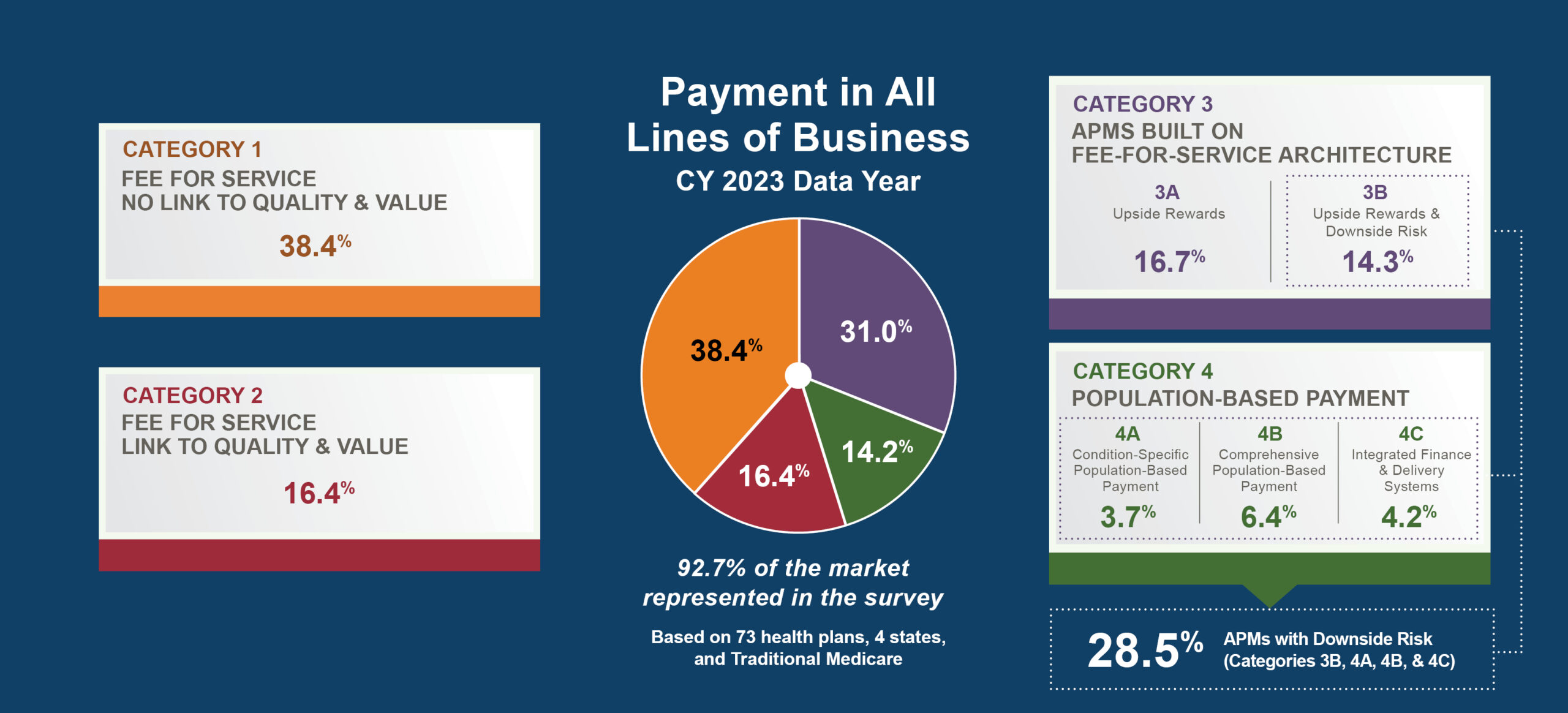
Collaboratives and Innovative Partnerships
Vermont’s All-Payer Accountable Care Organization Model
Initiative Description: The Vermont All-Payer Accountable Care Organization (ACO) Model (VTAPM) began on January 1, 2017 and is scheduled to end on December 31, 2024. It is a culmination of Vermont’s commitment to health care transformation, building from Vermont’s Global Commitment to Health Section 1115 waiver, the Blueprint for Health, and a multi-payer ACO Shared Savings Program (SSP) pilot under Vermont’s State Innovation Models (SIM) Testing Grant. Medicare, Medicaid, BlueCross BlueShield of Vermont (BCBSVT), MVP Health Care, and the State Employees’ Health Care Plan — a self-insured plan administered by BCBSVT — participate in the model, representing the majority of covered lives in the state. The Model is administered by OneCare Vermont, which coordinates all funding from all VTAPM payment mechanisms — all-inclusive population-based payment, fixed prospective payment, and traditional fee-for-service (FFS). The Model aims to use this ACO structure to reduce statewide spending and improve population health outcomes.
Strategic and Tactical Uses: The VTAPM has been linked to reductions in Medicare spending, decreases in acute hospital and specialty visits, and efforts to improve care coordination and strengthen primary care. Despite these successes, the Model had mixed success related to payment reform, with FFS as the primary funding mechanism by participating commercial plans, and mixed quality measure alignment, with only 7 of the 18 OneCare measures in common among participating health plans. Other states can look to the VTAPM model to understand how decades of work toward health care payment reform efforts can be used to develop a statewide model with successful cost and quality outcomes. Lessons learned from the evaluation report — including the need to align financial incentives and attribution, and the importance of goal setting for aligned payment mechanisms (see additional information below) — should also be reviewed for states looking to leverage findings from Vermont.
Multi-payer Alignment Foundational Element: Aligning Key Payment Model Components
Timeframe: Active
For additional information, please visit https://www.cms.gov/priorities/innovation/data-and-reports/2023/vtapm-3rd-eval-full-report
Who Might Use This: ![]() Health Plans
Health Plans
Government Regulation and Guidance
Medicaid and Children’s Health Insurance Program
Managed Care Access, Finance and Quality Final Rule
Initiative Description: On April 22, 2024, Medicaid and Children’s Health Insurance Program (CHIP) finalized two key regulations: “Ensuring Access to Medicaid Services” (Access Rule) and “Medicaid, CHIP Managed Care Access, Finance, and Quality” (Managed Care Rule), aimed at improving access to care in Medicaid across delivery systems (fee-for-service and managed care) and authorities (state plan and waiver services). The Managed Care Rule addresses five primary areas: (1) access in managed care, including network adequacy, (2) state directed payments, (3) medical loss ratio standards, (4) in lieu of services and settings (ILOSs), and (5) quality and performance assessment.
Strategic and Tactical Uses: The new rule will improve how managed care plans serve their members. Plans will need to collaborate closely with providers to implement the requirements of the rule.
Multi-payer Alignment Foundational Element: Aligning Key Payment Model Components, Timely and Consistent Data Sharing
Timeframe: Active
For additional information, please visit https://www.medicaid.gov/medicaid/managed-care/guidance/medicaid-and-chip-managed-care-final-rules/index.html
Who Might Use This: ![]() Health Plans |
Health Plans | ![]() Providers |
Providers | ![]() Policy Makers
Policy Makers
Government Regulation and Guidance
2025 Hospital Inpatient Prospective Payment System and Long-Term
Care Hospital Prospective Payment System Final Rule
Initiative Description: On August 1, 2024, the Centers for Medicare & Medicaid Services (CMS) issued the fiscal year (FY) 2025 Medicare hospital inpatient prospective payment system (IPPS) and long-term care hospital prospective payment system (LTCH PPS) final rule.
Strategic and Tactical Use: The new rule will update Medicare fee-for-service payment rates and policies for inpatient hospitals and LTCHs for FY 2025. CMS is publishing this final rule to meet the legal requirements to update Medicare payment policies for IPPS hospitals and LTCHs on an annual basis.
Multi-payer Alignment Foundational Element: Aligning Key Payment Model Components
Timeframe: Active
For additional information, please visit https://www.cms.gov/newsroom/fact-sheets/fy-2025-hospital-inpatient-prospective-payment-system-ipps-and-long-term-care-hospital-prospective
Who Might Use This: ![]() Health Plans |
Health Plans | ![]() Providers
Providers
Government Regulation and Guidance
Contract Year 2025 Medicare
Advantage and Part D Final Rule
Initiative Description: In April 2024, the Centers for Medicare & Medicaid Services (CMS) issued a final rule that revises the Medicare Advantage Program, Medicare Prescription Drug Benefit Program (Medicare Part D), Medicare Cost Plan Program, Programs of All-Inclusive Care for the Elderly (PACE), and Health Information Technology Standards and Implementation Specifications. The changes strengthen protections and guardrails for prospective enrollees, encourage healthy competition, ensure Medicare Advantage and Part D plans best meet the needs of enrollees, and promote access to behavioral health care providers, equity in coverage, and improved supplemental benefits.
Strategic and Tactical Uses: The final rule is designed to provide a more flexible, transparent, and equitable framework for beneficiaries to receive high-quality, affordable health care. For other organizations, these changes represent important areas to monitor for compliance, strategic adjustments, and opportunities to deliver improved patient care through innovative plan offerings.
Multi-payer Alignment Foundational Elements: Aligning Key Payment Model Components
Timeframe: Active
For additional information, please visit https://www.cms.gov/newsroom/fact-sheets/contract-year-2025-medicare-advantage-and-part-d-final-rule-cms-4205-f
Who Might Use This: ![]() Health Plans |
Health Plans | ![]() Providers
Providers
Collaboratives and Innovative Partnerships
Michigan Multipayer Initiatives
Initiative Description: Michigan Multipayer Initiatives (MMI) serves as a convening and policy alignment hub that brings together stakeholders to develop, implement, evaluate, and spread effective models that sustain high-quality, comprehensive, accountable primary care. MMI has a history of convening large statewide multi-payer demonstrations, including several Innovation Center demonstrations and voluntary multi-payer efforts. MMI’s 2023-2025 Priority Focus Areas include advancing alternative payment models, improving health equity, reducing provider burden, and advancing performance measure alignment.
Strategic and Tactical Uses: MMI publishes resources that organizations can use to understand how Michigan stakeholders are aligning, including evaluations of multi-payer advanced primary care demonstrations. Michigan stakeholders interested in learning more or sharing their ideas can reach out to the MMI team.
Multi-payer Alignment Foundational Element: Providing and Leveraging Technical Assistance
Timeframe: Active
For additional information, please visit https://mimultipayerinitiatives.org/about/
Who Might Use This: ![]() Health Plans
Health Plans
Collaboratives and Innovative Partnerships
Kentuckiana Health Collaborative
Initiative Description: The Kentuckiana Health Collaborative (KHC) is a coalition of businesses and health care stakeholders focused on improving health care quality, making health care more affordable, and promoting equitable health care. KHC leads efforts for consolidated measurement and reporting by working with health plans to collect claims data that informs a quality measure list and reporting.
Strategic and Tactical Uses: KHC releases the Kentucky Core Healthcare Measures Set (KCHMS) bi-yearly. The measure set includes 42 primary care quality measures that serve as the foundation for KHC’s consolidated reporting. The set aims to reduce provider reporting complexity and align Kentucky’s health care organizations around a common set of quality measures. Other states can look to KHC for how to publicly report on quality measures.
Multi-payer Alignment Foundational Element: Performance Measurement and Reporting
Timeframe: Active
For additional information, please visit https://khcollaborative.org
Who Might Use This: ![]() Health Plans |
Health Plans | ![]() Purchasers
Purchasers
Alignment Resources and Helpful Documents
The Future of Sustainable Value-Based Payment:
Voluntary Best Pracrices to Advance Data Sharing
Initiative Description: The National Association of Accountable Care Organizations (NAACOs), American Medical Association (AMA), and AHIP created a playbook that presents voluntary guidelines and best practices to advance data sharing, which includes data privacy, data infrastructure, value-based care participant readiness, federal health information technology requirements, and financial investment. The playbook is based on findings from an advisory workgroup comprising members from each partner association, a managing committee of association leaders, a literature review, an environmental scan, and interviews with subject matter experts.
Strategic and Tactical Uses: Organizations can use the playbook to develop or refine their own value-based care strategy, especially with regard to data and infrastructure practices.
Multi-payer Alignment Foundational Element: Timely and Consistent Data Sharing
Timeframe: Active
For additional information, please visit https://www.aurrerahealth.com/wp-content/uploads/2023/07/Voluntary-Best-Practices-to-Advance-Data-Sharing.pdf
Who Might Use This:![]() Health Plans |
Health Plans | ![]() Purchasers |
Purchasers | ![]() Providers |
Providers | ![]() Policy Makers |
Policy Makers | ![]() Enabling Organizations |
Enabling Organizations | ![]() Community-Based Organizations
Community-Based Organizations
Collaboratives and Innovative Partnerships
Massachusetts Quality Measure Alignment Taskforce
Initiative Description: Massachusetts began convening the Taskforce in 2017 in order to: (1) build consensus on an aligned measure set for voluntary adoption by health plans in global budget-based risk contracts, (2) identify strategic priority areas for measure development, and (3) advise on the measurement and reporting of health inequities. Since 2017, the Taskforce has released annually updated measure sets for shared implementation. The Taskforce also maintains “Developmental Set measure topics,” which lists topics and measures that may be implemented in the future.
Strategic and Tactical Uses: The state releases a yearly Massachusetts Aligned Measure Set for health plan uptake and alignment. The Taskforce publicly tracks uptake of the measure set and reports findings. Adherence to the Aligned Measure Set among insurers that report to the Task Force has steadily increased from 65% in 2019 to 93% in 2023. Other states can look to the Taskforce to pursue and track measure alignment or expand the work to create a cross-state approach to quality measure alignment.
Multi-payer Alignment Foundational Element: Performance Measurement and Reporting
Timeframe: Active
For additional information, please visit https://www.mass.gov/info-details/eohhs-quality-measure-alignment-taskforce
Who Might Use This: ![]() Health Plans
Health Plans
Collaboratives and Innovative Partnerships
Covered California’s Quality Transformation Initiative
Initiative Description: Covered California’s Quality Transformation Initiative (QTI) is focused on improving care for a small number of clinically important conditions for which there are major opportunities for improvement and established measures in current use. The four clinical areas of focus for improvement that are subject to Quality Transformation Fund payments are Controlling High Blood Pressure, Comprehensive Diabetes Care: Hemoglobin A1c Control, Colorectal Cancer Screening, and Childhood Immunization Status. Qualified Health Plan (QHP) issuers that fail to meet specified measure benchmarks will be required to make payments to the Quality Transformation Fund. For Measurement Year 2023, QHP final scores will be confirmed in September 2024, and issuer performance will be finalized and published by Spring 2025.
Strategic and Tactical Uses: QHP issuers in California can join the QTI to benefit from the financial incentives and quality measure improvements. For QHP issuers outside of California or other state agencies, this initiative can be used to set a baseline for financial incentives and quality measure alignment.
Multi-payer Alignment Foundational Element: Aligning Key Payment Model Components, Performance Measurement and Reporting
Timeframe: Active
For additional information, please visit https://hbex.coveredca.com/stakeholders/plan-management/qti/
Who Might Use This: ![]() Health Plans |
Health Plans | ![]() Providers
Providers
Government Regulation and Guidance
2024 Hospital Inpatient Prospective Payment System and
Long-Term Care Hospital Prospective Payment System Final Rule
Initiative Description: The final rule includes the required annual updates on Medicare payment policies for Inpatient Prospective Payment System (IPPS) hospitals and long-term care hospitals (LTCHs). The updates include changes to the payment structure of IPPS and LTCHs and updates to social determinants of health diagnoses codes, including requiring screening for social drivers of health and promoting health equity and patient safety. Mandatory reporting went into effect in October 2023.
Strategic and Tactical Uses: IPPS provides opportunities for alignment, primarily through investments in health equity. The rule includes healthy equity adjustments to the Hospital Value-Based Purchasing Program to reward delivery of excellent care in underserved populations. These adjustments include incentives to hospitals that provide care to populations with a high proportion of underserved individuals, as defined by dual eligibility status. The rule also changed the definition of three diagnosis codes describing homelessness to accurately reflect the use of hospital resources during treatment: the severity of a patient’s illness, the complexity of service, and the consumption of resources.
Multi-payer Alignment Foundational Element: Advancing Health Equity, Aligning Key Payment Model Components
Timeframe: Active
For additional information, please visit https://www.cms.gov/newsroom/fact-sheets/fy-2024-hospital-inpatient-prospective-payment-system-ipps-and-long-term-care-hospital-prospective-0
Who Might Use This: ![]() Health Plans |
Health Plans | ![]() Providers
Providers
Collaboratives and Innovative Partnerships
Washington Multi-Payer Collaborative
Initiative Description: The Washington State Health Care Authority formed a Multi-Payer Collaborative (MPC) to increase access to high-quality comprehensive primary care to improve health care outcomes. The MPC aims to improve primary care by enhancing the patient experience, improving population health outcomes, reducing costs, and improving the work life of health care providers. Part of the work being done by the MPC is the introduction of the MPC Learning Cohort, which will be an avenue for providers to shape where payers align their efforts to create primary care provider supports.
Strategic and Tactical Uses: Practices that are good candidates and meet certain characteristics can join an MPC Learning Cohort and help guide health plan alignment. Those that are not involved in the Washington MPC can use the strategies and direction of the MPC to help shape their own guiding principles. Practices in Washington that are participating in the Centers for Medicare & Medicaid Services’ new Making Care Primary model can benefit from the lessons of MPC’s current Learning Cohort to enable greater success in the new model.
Multi-payer Alignment Foundational Element: Providing and Leveraging Technical Assistance
Timeframe: Active
For additional information, please visit https://www.hca.wa.gov/about-hca/programs-and-initiatives/value-based-purchasing/primary-care-transformation
Stakeholders can reach out to the Multi-payer Collaborative directly with questions wampc-cebpstaff@ohsu.edu
Who Might Use This: ![]() Health Plans
Health Plans
Alignment Resources and Helpful Documents
Oregon Regional Multi-Payer Global Budget Model: Aligning 4 Health
Initiative Description: The Oregon Health Authority developed a report that provides recommendations for a global budget health care delivery pilot. The proposed model, Aligning 4 Health (A4H), is designed to change incentives for health plans and providers to improve health. The model establishes an annual, predetermined total budget for a defined population, which offers new flexibility for how health services are reimbursed, so that providers can focus their services on keeping people healthy. The model also includes shared expectations around promoting high-quality care, paying for outcomes, and addressing health inequities. Features of the model include centering health equity; shared accountability to quality and health equity; containing costs; building on and advancing health system transformation; seeking alignment and promoting broad participation and partnership; and flexibility, scalability, and resiliency in the model.
Strategic and Tactical Uses: As Oregon takes steps to develop and launch the pilot, health plans, providers, and other health care organizations can educate themselves on the model design and requirements and take preliminary steps in strategic planning. States interested in using a global budget model can leverage the key elements from this report as a roadmap for their own analysis and planning efforts.
Multi-payer Alignment Foundational Element: Aligning Key Payment Model Components
Timeframe: Active
For additional information, please visit https://www.oregon.gov/oha/hpa/hp/docs/HB-2010-Global-Budget.pdf
Who Might Use This: ![]() Health Plans |
Health Plans | ![]() Providers
Providers
Collaboratives and Innovative Partnerships
National Quality Forum Aligned Innovation
Initiative Description: Aligned Innovation is a multi-stakeholder initiative from the National Quality Forum (NQF) that advances quality measures for behavioral health and maternal health outcomes. The recent new measures prioritized by the Coalition include outcomes for mild to moderate behavioral health conditions and the reduction of severe maternal morbidity. The program is differentiated by a rapid-cycle measure development process, rather than the multi-year timeframe that’s typical of traditional measure development.
Strategic and Tactical Uses: These measures are outcome-oriented and patient-centered and can be used to support prospective measure alignment across the industry. Health plans not participating in Aligned Innovation can look to the initiative for lessons on measure development and achieving shared implementation.
Multi-payer Alignment Foundational Element: Performance Measurement and Reporting
Timeframe: Active
For additional information, please visit https://www.qualityforum.org/News_And_Resources/Press_Releases/2023/NQF_s_Aligned_Innovation_Initiative
_to_Advance_Next_Generation_Measures_of_Outcomes_for_Behavioral_Health_and_Maternity_Care.aspx
Who Might Use This: ![]() Health Plans
Health Plans
Collaboratives and Innovative Partnerships
National Committee for Quality Assurance Bulk FHIR Coalition
Initiative Description: The Bulk FHIR Quality Coalition is a National Committee for Quality Assurance (NCQA) and public-private sector collaboration focused on leveraging regulated Fast Healthcare Interoperability Resources (FHIR) data for NCQA’s Healthcare Effectiveness Data and Information Set (HEDIS) measures. Phase 1 of the Coalition involves health plans, providers, and accountable care organization cohorts that create pipelines from clinical data and claims data, which are tested and validated against specific HEDIS FHIR Implementation Guides from NCQA.
Strategic and Tactical Uses: By participating in NCQA’s Bulk FHIR Coalition, organizations can be at the forefront of health care technology and data management, as well as support the broader goals of enhancing health care quality, efficiency, and patient outcomes. Organizations not yet ready to participate can follow the results of the Coalition for future implementation.
Multi-payer Alignment Foundational Element: Timely and Consistent Data Sharing
Timeframe: Active
For additional information, please visit https://www.ncqa.org/bulk-fhir-api-quality-coalition/
Who Might Use This: ![]() Health Plans |
Health Plans | ![]() Providers |
Providers | ![]() Policy Makers
Policy Makers
Collaboratives and Innovative Partnerships
Delaware Primary Care Reform Collaborative
Initiative Description: The Delaware Health Care Commission created the Delaware Primary Care Reform Collaborative as part of a statewide effort to expand value-based care delivery models. The Collaborative develops recommendations to strengthen the primary care system in Delaware and includes health plans, providers, and Delaware state health leaders. The Collaborative also creates annual reports that provide insight into the primary care workforce and other relevant trends.
Strategic and Tactical Uses: The Delaware Primary Care Reform Collaborative hosts open meetings and posts the schedule, along with meeting minutes and materials, to their website for the public to review. The Collaborative also publishes trends and guidelines that result from their meetings. Other state agencies and collaboratives can learn from and collaborate with the Delaware Primary Care Reform Collaborative to draw larger, nationwide alignment on value-based care solutions.
Multi-payer Alignment Foundational Element: Aligning Key Payment Model Components, Performance Measurement and Reporting
Timeframe: Active
For additional information, please visit https://dhss.delaware.gov/dhss/dhcc/collab.html
Who Might Use This: ![]() Health Plans |
Health Plans | ![]() Purchasers |
Purchasers | ![]() Providers |
Providers | ![]() Policy Makers |
Policy Makers | ![]() Enabling Organizations |
Enabling Organizations | ![]() Community-Based Organizations
Community-Based Organizations
Government Regulation and Guidance
Cures Act Final Rule for Data Sharing
Initiative Description: The Office of the National Coordinator for Health Information Technology’s (ONC) Cures Act Final Rule aims to promote secure access, exchange, and use of electronic health information. The Act accelerates the uptake of standardized application programming interfaces (APIs), requires IT developers to provide API capabilities for population health management, and increases patient access to electronic health information.
Strategic and Tactical Uses: This rule helps to standardize the measure reporting process by promoting interoperability and enabling access to patient-level data from health plans, providers, and patients. Organizations should continue to track ongoing updates to the data sharing infrastructure.
Multi-payer Alignment Foundational Element: Timely and Consistent Data Sharing
Timeframe: Active
For additional information, please visit https://www.healthit.gov/buzz-blog/category/21st-century-cures-act
Who Might Use This: ![]() Health Plans |
Health Plans | ![]() Purchasers |
Purchasers | ![]() Providers |
Providers | ![]() Policy Makers |
Policy Makers | ![]() Enabling Organizations |
Enabling Organizations | ![]() Community-Based Organizations
Community-Based Organizations
Collaboratives and Innovative Partnerships
Core Quality Measures Collaborative Measure Sets
Initiative Description: The Core Quality Measures Collaborative (CQMC) develops and releases core sets of quality measures for 10 clinical focus areas (primary care, behavioral health, cardiology, gastroenterology, Human Immunodeficiency Virus/Hepatitis C, medical oncology, neurology, obstetrics and gynecology, orthopedics, and pediatrics). CQMC Workgroups convene on an annual basis to update the existing core sets, conduct yearly maintenance, and hear from a broad-based coalition of health care leaders to gain different perspectives on the measures and consider new ones.
Strategic and Tactical Uses: Organizations can compare the CQMC measure sets with other aligned sets to identify overlap and prioritize measures for multi-payer implementation initiatives. Organizations should also look to CQMC’s non-primary care measure sets with partners to increase industry alignment in specialty care.
Multi-payer Alignment Foundational Element: Performance Measurement and Reporting
Timeframe: Active
For additional information, please visit https://www.qualityforum.org/CQMC_Core_Sets.aspx
Who Might Use This: ![]() Health Plans |
Health Plans | ![]() Providers |
Providers | ![]() Purchasers
Purchasers
Collaboratives and Innovative Partnerships
Colorado Regulation 4-2-96 Concerning Primary Care Alternative Payment Model Parameters
Initiative Description: Colorado’s recent Regulation 4-2-96 directs the Division of Insurance (DOI) to establish aligned parameters for primary care alternative payment models (APMs). Regulation 4-2-96 aims to improve health care quality and outcomes in a manner that reduces health disparities, actively advances health equity, and increases the number of Coloradans who receive the right care at the right time and place at an affordable cost. The DOI engaged a broad array of organizations in order to gather feedback and insight prior to developing and promulgating a rule on quality measures, patient attribution, risk adjustment, and core competencies.
Strategic and Tactical Uses: Health insurance carriers must annually report on their use of the aligned APM parameters for primary care services. For plans issued or renewed on or after January 1, 2025, the APM Implementation Plan must conform to the alignment parameters in the new regulation. DOI will continue to engage organizations as the alignment parameters are reviewed and updated on an annual basis. Other state agencies can monitor Colorado’s experience with using regulation to drive alignment and consider adopting a similar strategy.
Multi-payer Alignment Foundational Element: Aligning Key Payment Model Components, Performance Measurement and Reporting
Timeframe: Upcoming
For additional information, please visit https://doi.colorado.gov/hb22-1325-primary-care-alternative-payment-models/
Who Might Use This: ![]() Health Plans
Health Plans
Government Regulation and Guidance
Centers for Medicare & Medicaid Services Medicaid Child Core Sets
Initiative Description: The Children’s Health Insurance Program Reauthorization Act of 2009 (CHIPRA) included provisions to strengthen the quality of care provided to and health outcomes of children in Medicaid and the Children’s Health Insurance Program (CHIP). It required the Department of Health and Human Services (HHS) to identify and publish a core measure set of children’s health care quality measures for voluntary use by state Medicaid and CHIP programs and to review and update the list annually. Beginning in 2024, all states are required to report on the Child Core Set, which will continue to be updated annually.
Strategic and Tactical Uses: Organizations can compare the Medicaid Child Core Set with other aligned measure sets in use, to identify overlap and prioritize measures for multi-stakeholder implementation initiatives.
Multi-payer Alignment Foundational Element: Performance Measurement and Reporting
Timeframe: Active
For additional information, please visit https://www.medicaid.gov/medicaid/quality-of-care/performance-measurement/adult-and-child-health-care-quality-measures/childrens-health-care-quality-measures/index.html
Who Might Use This: ![]() Health Plans |
Health Plans | ![]() Providers |
Providers | ![]() Enabling Organizations |
Enabling Organizations | ![]() Policy Makers
Policy Makers
Government Regulation and Guidance
Centers for Medicare & Medicaid Services Medicaid Adult Core Sets
Initiative Description: The Social Security Act (Section 1139B) requires the Department of Health and Human Services (HHS) to identify and publish a core set of health care quality measures for adult Medicaid enrollees and to review and update the list annually. The Adult Core Set includes a range of quality measures encompassing both physical and behavioral health. Beginning in 2024, all states are required to report on the behavioral health measures of the Adult Core Set, which will continue to be updated annually.
Strategic and Tactical Uses: Organizations can compare the Medicaid Adult Core Sets with other aligned measure sets in use, to identify commonalities and prioritize measures for multi-stakeholder implementation initiatives.
Multi-payer Alignment Foundational Element: Performance Measurement and Reporting
Timeframe: Active
For additional information, please visit https://www.medicaid.gov/medicaid/quality-of-care/performance-measurement/adult-and-child-health-care-quality-measures/adult-health-care-quality-measures/index.html
Who Might Use This: ![]() Health Plans |
Health Plans | ![]() Providers |
Providers | ![]() Policy Makers |
Policy Makers | ![]() Enabling Organizations
Enabling Organizations
Collaboratives and Innovative Partnerships
California Advanced Primary Care Initiative
Initiative Description: The California Quality Collaborative (led by the Purchaser Business Group on Health) and the Integrated Healthcare Association convene purchasers, health plans, and providers in California to strengthen the primary care delivery system. As part of this effort, health plans signed a Memorandum of Understanding (MOU) that commits them to shared primary care measures and a roadmap to advancing primary care in California. The Initiative culminates with the Payment Model Demonstration Project (July 2024-December 2025) to test a common value-based payment model with approximately 30 independent practices.
Strategic and Tactical Uses: The Initiative represents a multifaceted pilot that requires coordinated measure implementation, data sharing, and trust. In order to further statewide alignment, additional organizations in California are encouraged to sign the MOU and join the Initiative. Non-California health plans can use the MOU as a blueprint to build similar collaboratives in their state. The Advanced Primary Care Measure Set and Roadmap to Advanced Primary Care are also available for organizations looking to better align their primary care services.
Multi-payer Alignment Foundational Element: Aligning Key Payment Model Components, Performance Measurement and Reporting, Technical Assistance, Timely and Consistent Data Sharing
Timeframe: Active
For additional information, please visit https://www.pbgh.org/initiative/ca-advanced-primary-care-initiative/
Who Might Use This: ![]() Health Plans |
Health Plans | ![]() Purchasers |
Purchasers | ![]() Providers
Providers
Government Regulation and Guidance
2024 Physician Fee Schedule: Medicare
Shared Savings Program Final Rule
Initiative Description: The Centers for Medicare & Medicaid Services (CMS) issued the calendar year 2024 Medicare Physician Fee Schedule (PFS) final rule that includes changes to the Medicare Shared Savings Program (MSSP). The final rule establishes a new Medicare Clinical Quality Measure (CQM) collection type for accountable care organizations (ACOs) and aligns standards for data completeness, benchmarking, and scoring ACOs with the Merit-based Incentive Payment System (MIPS). The rule applies a health equity adjustment to an ACO’s MIPS Quality performance category score when calculating shared savings payments. It also reduces barriers in the adoption of digital measurement to allow the Shared Savings Program to align with the Universal Foundation for adults in 2025.
Strategic and Tactical Uses: The 2024 Physician Fee Schedule final rule advances CMS’s overall value-based care strategy of growth, alignment, and equity. Organizations can apply model design components to other alternative payment model arrangements. Data and infrastructure changes that support the move to digital quality measures will benefit value-based care programs across the health plan landscape and reduce provider burden. The health equity adjustment in shared savings payment calculations will support and encourage ACOs to deliver high-quality care while also serving a high proportion of underserved individuals.
Multi-payer Alignment Foundational Element(s): Performance Measurement and Reporting, Aligning Key Payment Model Components, Advancing Health Equity
Timeframe: Active
For additional information, please visit https://www.cms.gov/newsroom/fact-sheets/calendar-year-cy-2024-medicare-physician-fee-schedule-final-rule-medicare-shared-savings-program
Who Might Use This: ![]() Health Plans |
Health Plans | ![]() Providers
Providers
The Alignment Landscape includes a search bar and three filters to help narrow down items that are relevant to your alignment goals.
Filters:
![]() The Timeframe section
The Timeframe section
filters by upcoming, active and archived opportunities and resources:

![]() The Resource or Opportunity Type section filters by initiatives and resources which are categorized into the following three groups:
The Resource or Opportunity Type section filters by initiatives and resources which are categorized into the following three groups:
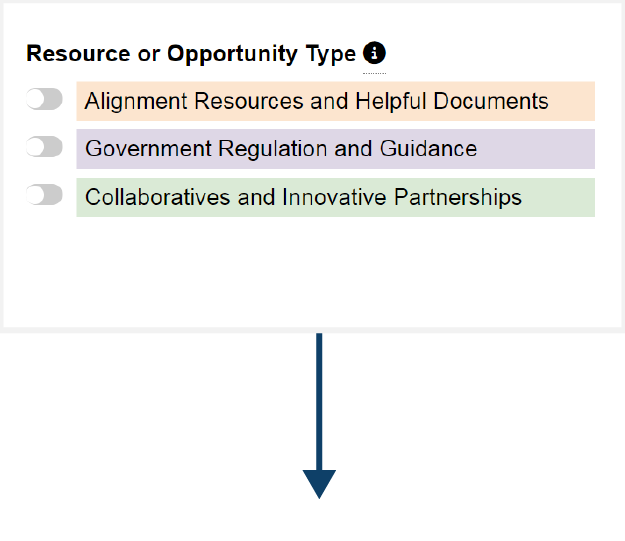
![]() The Multi-Payer Alignment Foundational Elements section filters by key features of multi-payer initiatives, defined by the Duke-Margolis Institute for Health Policy.
The Multi-Payer Alignment Foundational Elements section filters by key features of multi-payer initiatives, defined by the Duke-Margolis Institute for Health Policy.
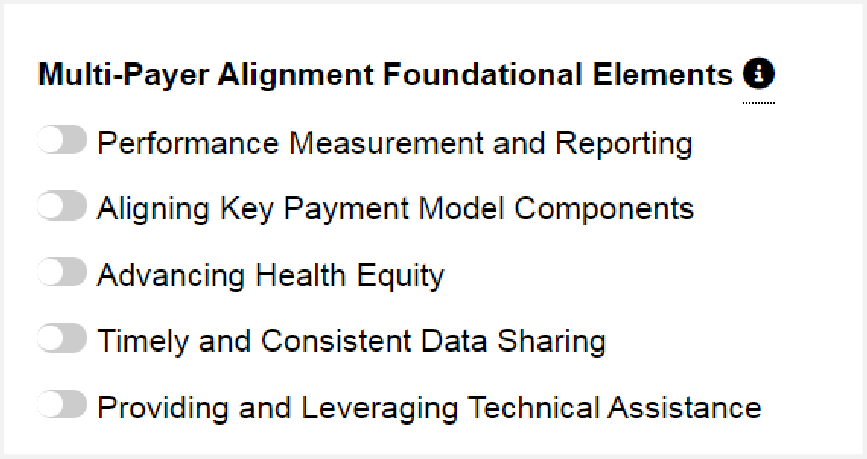



Each card includes background information on the alignment opportunity, including anticipated strategic and tactical uses and audience, associated foundational element(s), timeframe, and where to find additional information.
The Alignment Landscape includes a search bar and three filters to help narrow down items that are relevant to your alignment goals.
Filters:
![]()
The Timeframe section filters by new, upcoming and archived opportunities and resources:

![]()
The Resource or Opportunity Type section filters by initiatives and resources which are categorized into the three following groups:




![]()
The Multi-payer Alignment Foundational Elements section filters by the Accountable Care Curve Measurement.

Collaboratives and Innovative Partnerships
Minnesota Community Measurement
Initiative Description: Minnesota Community Measurement (MCM) is using data to improve health care in the region. They work with doctors, hospitals, clinics, insurance companies, purchasers, and state agencies to design measures, and then collect, analyze, and share actionable data on health care quality and cost. MCM releases a variety of annual public reports, including cost and utilization, health care quality, disparities by plan and demographics, and spotlight reports. These reports help consumers compare and choose clinics based on quality and cost ratings, understand the care they should receive, and learn how to save money on their care.
Strategic and Tactical Uses: MCM hosts public meetings and forums in order to gather community feedback on upcoming measures, guiding principles, specifications, and priorities. Entities in Minnesota are also encouraged to become members of MCM and help further their mission of using data to improve the health care industry.
Multi-payer Alignment Foundational Element: Performance Measurement and Reporting, Timely and Consistent Data Sharing
Timeframe: Active
For additional information, please visit https://mncm.org/
Who Might Use This: ![]() Health Plans |
Health Plans | ![]() Providers |
Providers | ![]() Purchasers
Purchasers
Alignment Resources and Helpful Documents
The Health Care Transformation Task Force’s Resources and Perspectives
Initiative Description: The Health Care Transformation Task Force is a nonprofit, private-sector consortium comprising patient advocacy organizations, providers, payers, and health care purchasers dedicated to creating a health care delivery system that achieves equitable outcomes through high-quality, affordable, and person-centered care. The Task Force has developed best practices and toolkits for implementing value-based payment models and identified actionable policy recommendations.
Strategic and Tactical Uses: The Task Force’s compendium of resources on value-based care topics — including accountable care, bundled payments, maternal health, and health equity — is a great way to learn about emerging topics, particularly for organizations new to value-based care.
Multi-payer Alignment Foundational Element: Providing and Leveraging Technical Assistance
Timeframe: Active
For additional information, please visit https://hcttf.org/resources-perspectives/
Who Might Use This: ![]() Health Plans |
Health Plans | ![]() Purchasers |
Purchasers | ![]() Providers |
Providers | ![]() Policy Makers |
Policy Makers | ![]() Enabling Organizations |
Enabling Organizations | ![]() Community-Based Organizations
Community-Based Organizations
Alignment Resources and Helpful Documents
Integrated Healthcare Association’s Align. Measure. Perform. Program
Initiative Description: The Integrated Healthcare Association’s (IHA) Align. Measure. Perform. (AMP) program is an initiative designed to improve health care quality and reduce costs through a coordinated approach in California. The program seeks to align incentives, measure performance, and reward high-quality, cost-effective care. AMP has four program components: an aligned measure set and benchmarking, incentive design, public reporting, and public recognition. Today, 16 health plans and more than 200 physician organizations participate in AMP.
Strategic and Tactical Uses: Plans, providers, and patients in California can participate in AMP programs by implementing measures, identifying improvement opportunities, and reviewing publicly reported results to make decisions about their health care providers. Other states or convening organizations can look to the AMP program for guidance on collective action toward value-based payment and quality measure improvement.
Multi-payer Alignment Foundational Element: Aligning Key Payment Model Components, Timely and Consistent Data Sharing, Performance Measurement and Reporting
Timeframe: Active
For additional information, please visit https://iha.org/performance-measurement/amp-program/
Who Might Use This: ![]() Health Plans |
Health Plans | ![]() Providers
Providers
Government Regulation and Guidance
Final Rule to Expand Access to Health Information and Improve the Prior Authorization Process
Initiative Description: The final rule requires Medicare Advantage (MA) organizations, Medicaid and the Children’s Health Insurance Program (CHIP) fee-for-service (FFS) programs, Medicaid managed care plans, CHIP managed care entities, and issuers of Qualified Health Plans (QHPs) offered on the Federally-Facilitated Exchanges (FFEs) to improve the electronic exchange of health information and prior authorization processes for medical items and services. It also requires the same entities to implement a Health Level 7 (HL7) Fast Healthcare Interoperability Resources (FHIR) prior authorization application programming interface (API), which can be used to facilitate a more efficient electronic prior authorization process between providers and health plans by automating the end-to-end prior authorization process. Compliance requirements will begin in January 2027.
Strategic and Tactical Uses: Medicare FFS has already implemented an electronic prior authorization API, demonstrating the efficiencies other health plans could realize by implementing such an API. By implementing the requirements, the prior authorization process will reduce administrative burden on the healthcare workforce, empower clinicians to spend more time with patients, and prevent avoidable delays in care for patients. Health plans can prepare for compliance ahead of the start date January 1, 2027.
Multi-payer Alignment Foundational Element: Timely and Consistent Data Sharing
Timeframe: Upcoming
For additional information, please visit https://www.cms.gov/newsroom/press-releases/cms-finalizes-rule-expand-access-health-information-and-improve-prior-authorization-process
Who Might Use This: ![]() Health Plans |
Health Plans | ![]() Providers |
Providers | ![]() Enabling Organizations
Enabling Organizations
Government Regulation and Guidance
Civitas Networks for Health
Initiative Description: Civitas Networks for Health (Civitas) brings together organizations that focus on improving health in communities throughout the country through data-led multi-stakeholder collaboration. Civitas focuses on increasing collaboration and shared learning, providing thought leadership and technical expertise, and educating public and private entities about the benefits, functions, and roles of Civitas’ community. Members and topics include all-payer claims databases, health information exchanges, regional health improvement collaboratives, quality improvement organizations, and the emerging Health Data Utility model.
Strategic and Tactical Uses: Organizations can become members of Civitas to participate in multi-site workgroups and projects alongside organizations in pursuit of advancing interoperability and data-sharing alignment. Organizations can also learn about relevant reports, resources, and policy briefings.
Multi-payer Alignment Foundational Element: Timely and Consistent Data Sharing
Timeframe: Active
For additional information, please visit https://www.civitasforhealth.org/
Who Might Use This: ![]() Health Plans |
Health Plans | ![]() Purchasers |
Purchasers | ![]() Enabling Organizations |
Enabling Organizations | ![]() Policy Makers
Policy Makers
Government Regulation and Guidance
Centers for Medicare & Medicaid Services Meaningful Measures Initiative
Initiative Description: The Meaningful Measures Initiative addresses measurement gaps, reduces burden, and increases efficiency by: (1) Using only high-value quality measures impacting key quality domains; (2) Aligning measures across value-based programs and across partners, including the Centers for Medicare & Medicaid (CMS), federal, and private entities; (3) Prioritizing outcome and patient-reported measures; (4) Transforming measures to be fully digital and incorporating all-payer data; (5) Developing and implementing measures reflecting social drivers/determinants of health (SDOH).
Strategic and Tactical Uses: Organizations can look toward the Meaningful Measures Initiative when developing their measure strategy. Industry movement toward similar goals (e.g., digital quality measurement) helps reduce fragmentation.
Multi-payer Alignment Foundational Element: Performance Measurement and Reporting
Timeframe: Active
For additional information, please visit https://www.cms.gov/medicare/quality/meaningful-measures-initiative
Who Might Use This: ![]() Health Plans
Health Plans
Collaboratives and Innovative Partnerships
California Health and Human Services
Data Exchange Framework
Initiative Description: The Data Exchange Framework (DxF) is an agreement across health and human services systems and providers to share information safely and effectively. The Framework aims to make data available to drive decisions and outcomes, promote individual data access, reinforce data privacy and security, and establish clear and transparent terms and conditions for data collection, exchange, and use. Starting January 2024, health care entities are required to exchange real-time information with each other and with public health and social services for treatment, payment, and health care operations.
Strategic and Tactical Uses: California organizations are required to use the Framework to communicate with each other regarding the sharing of patient data. States outside of California can apply a similar data exchange framework to improve data sharing for their own populations.
Multi-payer Alignment Foundational Element: Timely and Consistent Data Sharing
Timeframe: Active
For additional information, please visit https://www.cdii.ca.gov/committees-and-advisory-groups/data-exchange-framework/
Who Might Use This: ![]() Health Plans |
Health Plans | ![]() Purchasers |
Purchasers | ![]() Providers |
Providers | ![]() Policy Makers |
Policy Makers | ![]() Community-Based Organizations |
Community-Based Organizations | ![]() Enabling Organizations
Enabling Organizations
Government Regulation and Guidance
Alternative Payment Model Performance Pathway
Initiative Description: The Alternative Payment Model (APM) Performance Pathway (APP) is an optional Merit-based Incentive Payment System (MIPS) reporting and scoring pathway for MIPS-eligible clinicians who are also participants in MIPS APMs. Performance is measured across three areas: quality, improvement activities, and promoting interoperability. The idea behind the measure set is to reduce burden, create new scoring opportunities for participants in MIPS APMs, and encourage participation in APMs through alignment.
Strategic and Tactical Uses: APM entities in a MIPS APM may report the APP on behalf of their MIPS-eligible clinicians. Accountable Care Organizations (ACOs) participating in the Medicare Shared Savings Program are required to report the APP for the purpose of assessing their quality performance for that program. Groups and individuals may also report the APP on behalf of their MIPS-eligible clinicians.
Multi-payer Alignment Foundational Element: Aligning Key Payment Model Components, Performance Measurement and Reporting
Timeframe: Active
For additional information, please visit https://qpp.cms.gov/mips/apm-performance-pathway
Who Might Use This: ![]() Providers
Providers
Government Regulation and Guidance
Trusted Exchange Framework Common Agreement Standards
Initiative Description: The Trusted Exchange Framework Common Agreement (TEFCA) was published by the Office of the National Coordinator for Health Information Technology (ONC) to establish the infrastructure model and governing approach for users in different networks to securely share basic clinical information with each other, all under commonly agreed-to expectations and rules. TEFCA describes a common set of non-binding, foundational principles for trust policies and practices that can help facilitate an exchange among organizations. These principles include standardization, transparency, cooperation and non-discrimination, privacy, security, patient safety, access, and data-driven accountability.
Strategic and Tactical Uses: Currently, providers may have disparate access to patient data across multiple networks, adding to their administrative burden. Patients may also struggle to access their own data easily. As TEFCA becomes operational, organizations and patients will benefit from improved access to data as TEFCA aims to create seamless nationwide exchange.
Multi-payer Alignment Foundational Element: Timely and Consistent Data Sharing
Timeframe: Active
For additional information, please visit https://www.healthit.gov/topic/interoperability/policy/trusted-exchange-framework-and-common-agreement-tefca
Who Might Use This: ![]() Health Plans |
Health Plans | ![]() Providers |
Providers | ![]() Policy Makers
Policy Makers
Government Regulation and Guidance
The Universal Foundation Measure Set
Initiative Description: In an effort to align measures that drive quality improvement and care transformation, the Centers for Medicare & Medicaid Services (CMS) selected adult and pediatric measures that promote the best, safest, and most equitable care for individuals across critical quality areas: wellness and prevention, chronic conditions, behavioral health, person-centered care, and seamless care coordination. The measures will be used across CMS quality programs and prioritized for stratification and digitization.
Strategic and Tactical Uses: Organizations can compare the Universal Foundation with other aligned measure sets to identify overlap and prioritize measures for multi-payer implementation initiatives. The Universal Foundation will continue to evolve over time with population-specific “add-on” measure sets.
Multi-payer Alignment Foundational Element: Performance Measurement and Reporting
Timeframe: Active
For additional information, please visit https://www.cms.gov/aligning-quality-measures-across-cms-universal-foundation
Who Might Use This: ![]() Health Plans |
Health Plans | ![]() Providers |
Providers | ![]() Purchasers |
Purchasers | ![]() Policy Makers
Policy Makers
Michael de la Guardia is the Deputy Director of the Division of Health Plan Innovation (DHPI) in the Seamless Care Models Group (SCMG) within the Center for Medicare and Medicaid Innovation at the Centers for Medicare & Medicaid Services (CMS); the division currently houses Medicare Advantage models. Michael also co-leads the Center’s portfolio of climate change and health initiatives. Prior to his role as Deputy Director of DHPI, Michael was the Value-Based Insurance Design (VBID) Model Co-Lead. He previously worked at the United States Senate Committee on Finance as a Health Policy Fellow focused on the Inflation Reduction Act and Medicare and Medicaid legislation and hearings. Michael received a B.S. from the Georgia Institute of Technology and an M.P.H. and M.B.A. from the University of California (UC), Berkeley.
Innovative Initiatives and Partnerships
Core Quality Measures Collaborative Measure Sets
Initiative Description: The Core Quality Measures Collaborative (CQMC) develops and releases core sets of quality measures for 10 focus areas. The CQMC Workgroups convene on an annual basis to update the existing core sets, conduct yearly maintenance, and dialogue with members from a variety of stakeholder groups to gain different perspectives on the measures and consider new ones.
Strategic and Tactical Uses: Organizations can compare the CQMC Measures Collaborative Core Measure Sets with other aligned measure sets in use to identify overlap and prioritize measures for multi-payer implementation initiatives.
Multi-payer Alignment Foundational Element: Performance Measurement
Timeframe: Active
For additional information, please visit https://www.qualityforum.org/CQMC_Core_Sets.aspx
Who Might Use This: ![]() Payers |
Payers | ![]() Providers |
Providers | ![]() Purchasers
Purchasers
Performance Measurement and Reporting – Includes initiatives or resources related to the quality measure alignment to support quality improvement, transparency, and payment initiatives.
Aligning Key Payment Model Components – Includes initiatives or resources related to key payment model components, such as attribution, benchmarking, and risk adjustment to reduce administrative burden and create shared value-based design principles.
Advancing Health Equity – Includes initiatives or resources related to health equity, including defining, understanding, measuring, and addressing health disparities in a sustainable way.
Timely and Consistent Data Sharing – Includes initiatives or resources related data sharing to enable data-driven clinical decisions, support whole-person care, and increase interoperability for more uniform data access.
Providing and Leveraging Technical Assistance – Includes initiatives or resources that establish shared goals and the learning and support opportunities needed to meet those goals.
Includes links to papers, materials, tools, or other resources on value-based care and APMs. These resources may recommend approaches to align on APM design element(s) or provide guidance to improve cross-sector engagement strategy to advance alignment.
Collaboratives and Convening Organizations – Includes organizations bringing together various stakeholders to support multi-payer alignment and/or value-based care. Each collaborative may serve a slightly different purpose but can be leveraged as a convening opportunity for a shared region or goals.
Government Regulation and Guidance – Includes rules or regulations that may influence the strategic development or execution of an alignment initiative. The guidance can help to mitigate challenges related to alignment and alert interested parties to opportunities for cross-sector alignment.
Innovative Initiatives and Partnerships – Includes examples of ongoing work to advance alignment efforts and innovate health care payment. Some of these efforts are open to public participation, while others may be geographically or time bound.
Upcoming: Initiatives or resources that are expected to start or be released in the near future.
Active: Initiatives or resources that are relevant and ongoing.
Archived: Initiatives or resources that are no longer active but are memorialized as content that has previously been included in the Landscape.
Joe Castiglione is on the Industry Initiatives team at Blue Shield of California, where he works to scale and sustain health care innovation through industry collaboration and policy movement. His work focuses on building strategic partnerships that drive alignment on issues related to payment innovation, primary care, and health equity. Prior to Blue Shield, he led stakeholder engagement, as well as legislative and regulatory advocacy, in Washington, DC for the National Committee for Quality Assurance (NCQA). Joe lives in the Castro District of San Francisco, California. He has an MBA from UC Berkeley Haas School of Business and a BA in International Economics from the University of Texas at Austin.
Deepak Sadagopan serves as COO of Population Health at Providence, where he leads population health initiatives across the system to transform care. This includes value-based care growth, a $50M investment in Health Equity, and Medicare/Medicaid management for quality care at more affordable prices. In addition, he serves as the CEO of Health Connect Partners, LLC, the Providence ACO serving more than 110,000 assigned members as part of CMS’ MSSP program.
Deepak has more than 20 years of experience in health care, serving in leadership roles at Siemens, Quest Diagnostics, McKesson, and Edifecs. Over the past eight years, he has focused on working closely with payers and providers on the use of technology to drive business decisions making the transition from volume to value-based delivery models.
At Providence, Deepak has overseen the successful implementation of MACRA, Medicare Shared Savings Program (MSSP), and other Medicare and commercial value-based care initiatives. Under his leadership the MSSP program has been ranked within the top 15 of such programs in the country. His team is developing an advanced data and analytics platform to support value-based care programs across the system. The team develops capabilities and processes that drive data-driven operational decisions.
Deepak is a leading voice in ensuring value-based care and Health IT policy initiatives enable equitable access to health care. He serves on the corporate boards of Spectral AI and Ayin Health Solutions. He represents a leading health system voice on the HFMA board, guiding the path to value transformation. He also serves on the FAST and Da Vinci National Steering committees to accelerate interoperability data standards. Additionally, he is a sought-after thought leader, frequently writing for peer-reviewed publications, being interviewed by business media, and speaking at health care forums.
Deepak earned his master’s degree in engineering and data science from the University of Connecticut and completed an executive management program with the MIT Sloan School of Management. He has also completed a master’s in health care delivery science from Dartmouth College.
COO – Reginald Vicks, RN, BSN, MBA brings more than 27 years of healthcare leadership experience, mid-level and executive, to oversee and monitor the Agency’s multi-site specific programs and operations. Mr. Vicks is a Registered Nurse with experience in healthcare management for both acute care and community-based settings. His professional background includes direct patient care nursing & healthcare management, along with oversight of clinical operations. Prior to coming to CrescentCare, Reginald served as the director of the Emergency and Critical Care Services for New Orleans East Hospital. Mr. Vicks brings experience in operations, policy and procedure development, staffing management and equipment procurement, as well as training, research and the use of an evidence-based practice model of care delivery. His experience with start-up processes as New Orleans and its hospitals rebuilt after Hurricane Katrina assists CrescentCare as it continues to expand.
Anna Goldman is a primary care physician and a health services researcher. Her research focuses on health equity in multiple domains, including the intersection of human health and climate change, and also the effects of health care payment policy on access for the poor and underserved. She is the creator and co-founder of the Clean Power Prescription Program, a program which uses solar power generated at BMC to reduce the cost of utility bills for BMC patients with energy insecurity, set to launch in the fall of 2023. She is currently funded by the National Institute of Mental Health to study the impacts of a novel health care payment strategy, Accountable Care Organizations, on adults living with serious mental illness. She holds a medical degree from Mount Sinai School of Medicine, a Master’s Degree in Public Health from the Harvard T.H. Chan School of Public Health, and a Master’s Degree in Public Affairs from Brown University.
Joe McCannon works at the U.S. Department of Health and Human Services (Senior Advisor, Agency for Healthcare Research and Quality), contributing to standing up the Department’s new Office of Climate Change and Health Equity (OCCHE). He manages the office’s work to mobilize and support the healthcare sector. He served in the Obama Administration as Senior Advisor to the Administrator at the Centers for Medicare and Medicaid Services (CMS) and was part of the founding team at the Center for Medicare and Medicaid Innovation (CMMI). He was previously Vice President at the Institute for Healthcare Improvement and co-founder of the Billions Institute. He has taught graduate-level courses on large-scale change and quality improvement at the UPenn School of Social Policy and Practice and the Harvard T.H. Chan School of Public Health and his writing has appeared in JAMA, NEJM, Health Affairs and Harvard Business Review. He is a graduate of Harvard University and was a Reuters Fellow at Stanford University.
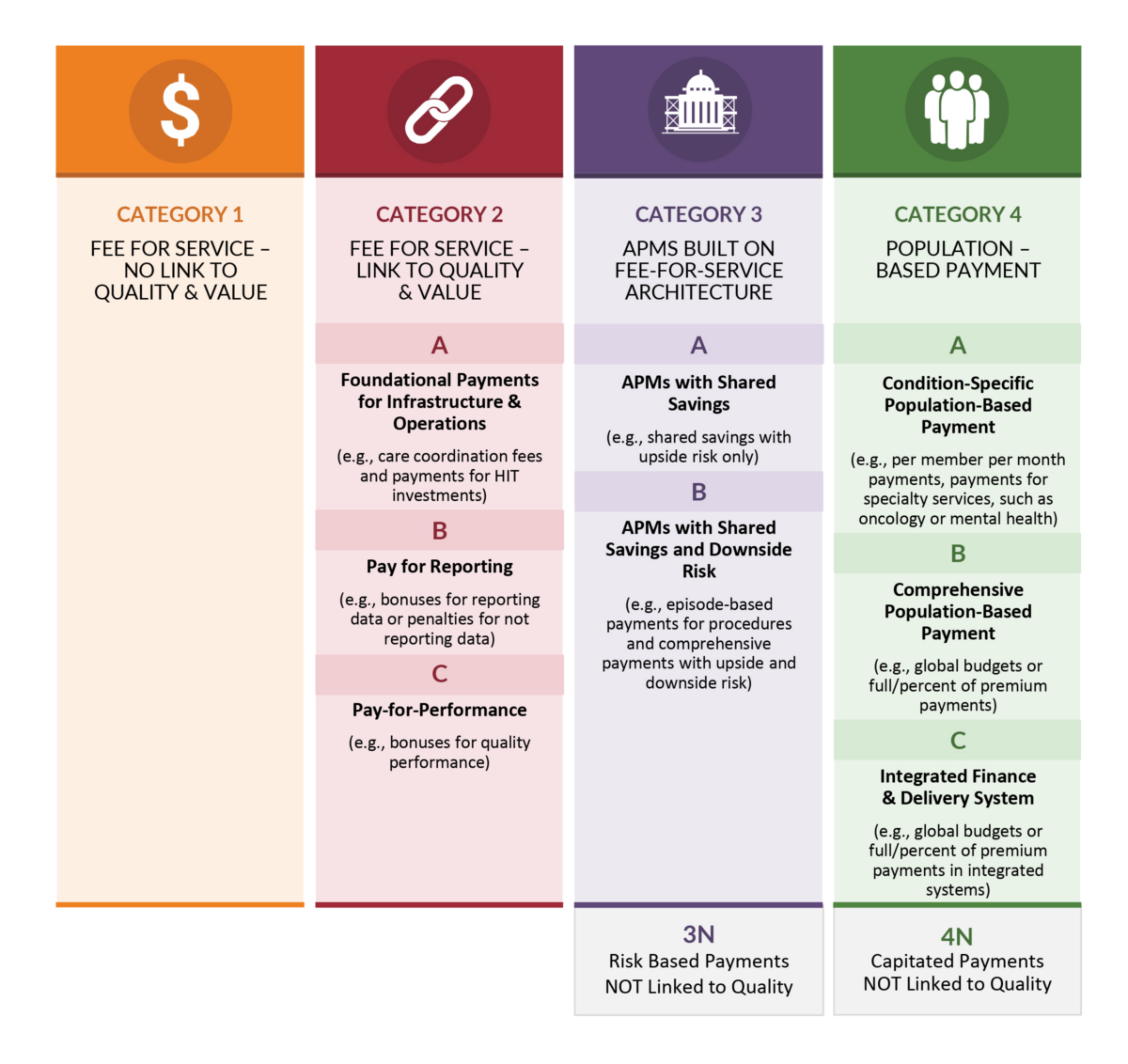
Improving predictability for providers through improved risk adjustment for complex patients, stronger incentive structures for Medicaid beneficiaries, and flexibility on waivers.
Providers who are successful in fee-for-service (FFS) may lack a compelling reason to transition to APMs but may be unable to compete with the person-centered care delivered by providers in APMs. Introducing APMs through multi-payer pilots in these markets (particularly for independent and smaller providers) may increase competition and reduce FFS entrenchment.
Reducing disparities and improving health equity through reallocation of resources to address SDoH (e.g., housing, food insecurity, transportation).
Mark McClellan, M.D., Ph.D., is Director and Robert J. Margolis, M.D., Professor of Business, Medicine, and Health Policy at Duke-Margolis Institute for Health Policy. He is a physician-economist who focuses on quality and value in healthcare, including payment reform, real-world evidence, and more effective drug and device innovation.
He is former administrator of the Centers for Medicare & Medicaid Services and former commissioner of the U.S. Food and Drug Administration, where he developed and implemented major reforms in health policy.
He is an independent director on the boards of Johnson & Johnson, Cigna, and Alignment Healthcare and is co-chair of the Health Care Payment Learning and Action Network Executive Forum.
Mark McClellan, MD, PhD, is Director and Robert J. Margolis, M.D., Professor of Business, Medicine and Policy at the Duke-Margolis Institute for Health Policy. He is a physician-economist who focuses on quality and value in health care, including payment reform, real-world evidence and more effective drug and device innovation. Dr. McClellan is at the center of the nation’s efforts to combat the pandemic, the author of COVID-19 response roadmap, and co-author of a comprehensive set of papers and commentaries that address health policy strategies for COVID vaccines, testing, and treatments, nationally and globally. He is former administrator of the Centers for Medicare & Medicaid Services and former commissioner of the U.S. Food and Drug Administration, where he developed and implemented major reforms in health policy. Dr. McClellan is an independent board member on the boards of Johnson & Johnson, Cigna, Alignment Healthcare, and PrognomIQ; co-chair of the Executive Forum for the Health Care Payment Learning and Action Network; and serves as an advisor for Arsenal Capital Group, Blackstone Life Sciences, and MITRE.
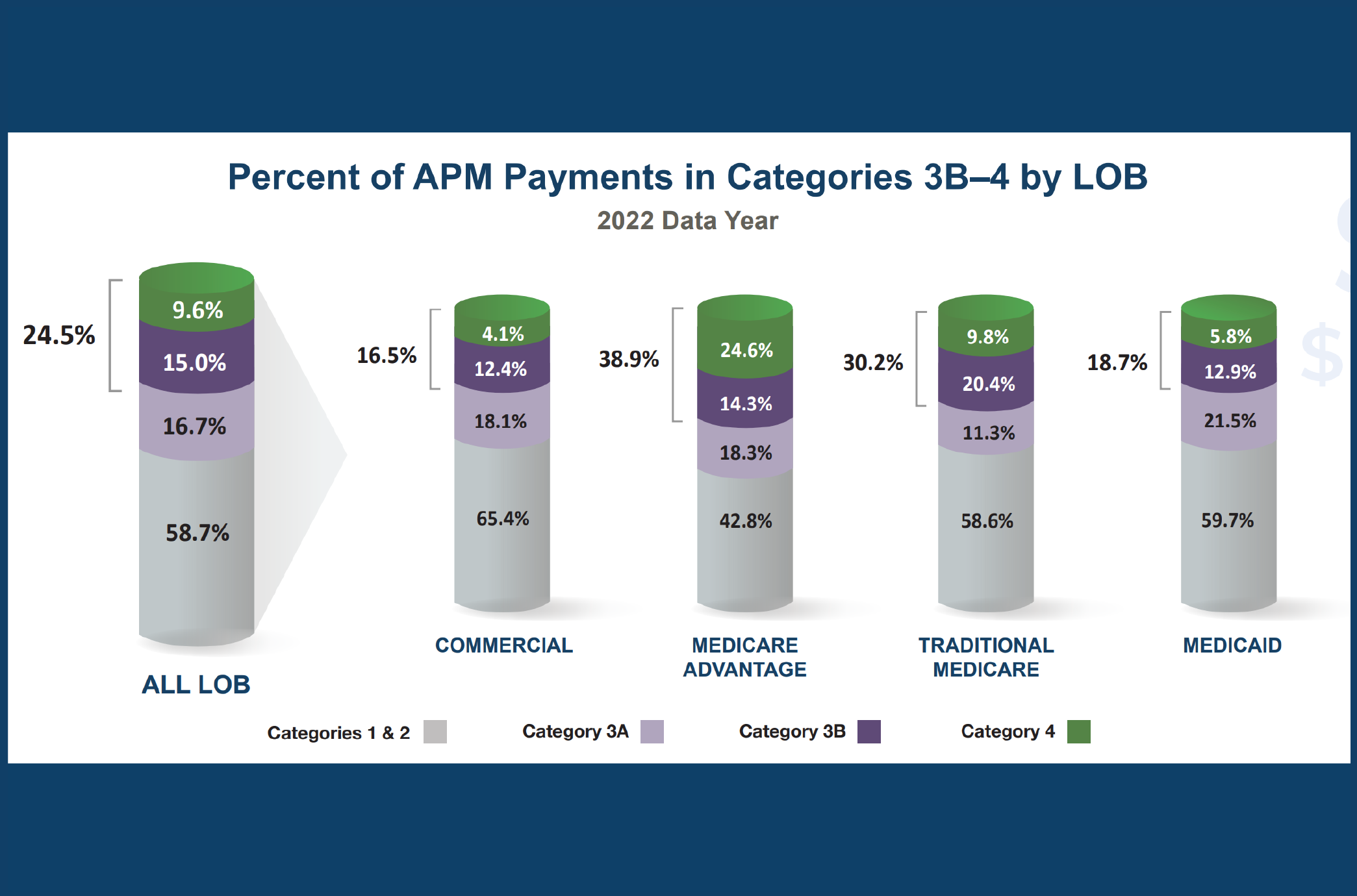
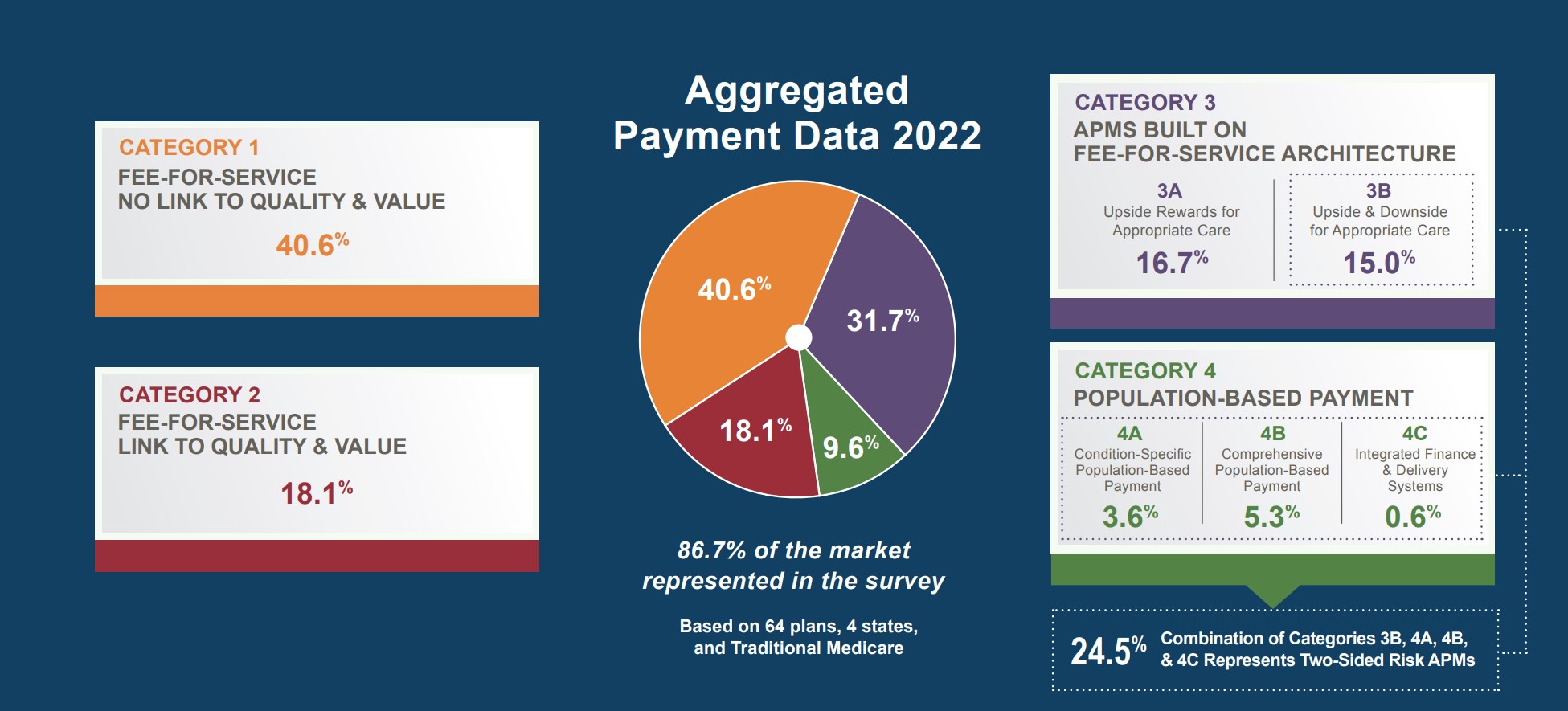
Measurement Track: Payment Reform
![]()
![]()
![]()
![]()
Capability: Analysis to identify alternative payment model opportunities
Definition:
Establish process to evaluate readiness to enter into alternative payment models. This process should include a financial analysis and business readiness assessment to evaluate likelihood of success and identify gaps for remediation. Identify the stakeholders across the organization who will need to be engaged in this process, such as payer contracting, clinical operations, care management and information technology.
Resources:
Mark Japinga is a Research Associate at the Duke-Margolis Center for Health Policy, based out of Washington, DC, and focusing on payment and delivery reform. He has led research initiatives and written issue briefs in areas such as specialty care models, multipayer initiatives, employer-sponsored health care, and state-level transformation. Prior to Margolis, he worked in a variety of positions in and around state politics, including for the Texas Legislature, the Wisconsin Legislature, and Stateside Associates. He is a graduate of Grinnell College and the University of Wisconsin-Madison.
Maria Ramirez Perez is a Program Manager with NC Medicaid’s Healthy Opportunities Pilots program and leads the program’s efforts with Network Leads and community-based organizations. Prior to her work with NC HOP, she also co-led the implementation of NC DHHS’s COVID-19 Support Services Program which helped connect households with social supports to safely quarantine or isolate.
Maria previously worked with Legal Aid of North Carolina where she represented clients in public benefits appeals. She also led regional implementation and outreach efforts to help North Carolinians gain access to clinical care and social supports through the Medical-Legal Partnership and Healthcare Navigator programs.
Maria earned her Master of Public Health from UNC Gillings School of Global Public Health. When she is not focused on addressing healthy opportunities, Maria is trying new recipes or exploring the outdoors. She has logged hundreds of miles hiking in the southeast.
Joe Castiglione is on the Industry Initiatives team at Blue Shield of California, where he works to scale and sustain health care innovation through industry collaboration and policy movement. His work focuses on building strategic partnerships that drive alignment on issues related to payment innovation, primary care, and health equity. Prior to Blue Shield, he led stakeholder engagement, as well as legislative and regulatory advocacy, in Washington, DC for the National Committee for Quality Assurance (NCQA). Joe lives in the Castro District of San Francisco, California. He has an MBA from UC Berkeley Haas School of Business and a BA in International Economics from the University of Texas at Austin.
Tara Smith is the primary care and affordability director at the Colorado Division of Insurance (DOI), where she helps lead the DOI’s payment system reforms to reduce health costs for consumers by increasing the utilization of primary care. She is responsible for recruiting, convening, and facilitating activities of the Colorado Primary Care Payment Reform Collaborative and for developing affordability standards and strategies to help ensure commercial insurance companies’ investments in primary care drive better value and quality for consumers.
Tara has been actively involved in efforts to reform the state’s health care systems throughout her career, including Colorado’s State Innovation Model (SIM), a four-year, $65 million initiative aimed at transforming health care delivery and payment structures through the integration of physical and behavioral health, along with the implementation of the Affordable Care Act’s health insurance marketplace reforms.
Alicia Berkemeyer is the executive vice president and chief health management officer for Arkansas Blue Cross and Blue Shield. She is responsible for all programs related to provider networks, medical management, provider compensation, quality– and value-based programs, primary care, and commercial pharmacy for Arkansas Blue Cross and Blue Shield, and its affiliates. Alicia joined Arkansas BCBS in 1989 and has held several positions in claims, customer service, sales and marketing, and pharmacy. She has more than 30 years of experience in the health care industry, with a focus on value–based care, primary care, and pharmacy. Alicia played an instrumental role in Arkansas being chosen as one of only seven regions in the United States to participate in the federal Comprehensive Primary Care initiative and assisted the state in receiving significant funding from the CMS Innovation Center in the form of a State Innovation Model grant. Alicia currently serves on the Cystic Fibrosis Board, the University of Arkansas Little Rock Business Advisory Council, and the Divine Mercy Clinic Board.
Kate Davidson, LCSW is the director of the learning and diffusion group (LDG) at the Center for Medicare and Medicaid Innovation (CMMI), within the Centers for Medicare & Medicaid Services (CMS). In this role, Ms. Davidson leads CMMI’s team focused on accelerating healthcare system transformation by leveraging improvement science within and across models, as well as leading the multi-payer alignment strategy for the Center through the Health Care Payment Learning and Action Network (HCPLAN). Prior to joining CMS, Ms. Davidson led Policy and Practice Improvement efforts at the National Council for Mental Wellbeing, where she managed payment reform, quality improvement, and workforce development initiatives in mental health and addiction prevention, treatment, and recovery organizations, and provided training and technical assistance to human services organizations, counties, and states. Ms. Davidson began her career in healthcare as a social worker researching, testing, and scaling interventions in community-based settings. Ms. Davidson has an MSW from Fordham University and a BA from Loyola College in Maryland.
Measurement Track: Quality
![]()
![]()
![]()
![]()
Capability: Encourage adoption of pay-for-performance
Definition:
Developing an incentive structure to demonstrate successful achievement of defined process and clinical/preventative measures, as well as earn shared savings and/or reward/bonus payments.
Resources:
Measurement Track: Quality
![]()
![]()
![]()
![]()
Capability: Reporting of quality outcomes (including specialty-oriented)
Definition:
Integration with the Data and Infrastructure Measurement Track for Enterprise Data Warehouse to increase the accuracy of the quality metrics generated and reported to regulators, the practicing providers, and key clients. Includes establishing the importance of data quality in driving business decisions and initiatives undertaken by the provider organization (e.g., communication campaigns to bring patients in for preventive screenings like diabetic eye and foot exams) to improve the outcomes achieved.
Resources:
Measurement Track: Quality
![]()
![]()
![]()
![]()
Capability: Provide transparent quality benchmarking methodology
Definition:
Methodology is shared with regulators and providers, and must be adjusted for population mix, risk (including social determinants of health), and market (e.g., mammogram rates may be lower in certain communities with low access to preventative care). Also includes participation in chronic condition clinical registries identifying and tracking care and outcomes.
Resources:
Measurement Track: Data and Infrastructure
![]()
![]()
![]()
![]()
Capability: Develop data strategy structure and governance
Definition:
Relevant data sets across financial, clinical, and operational domains have been identified and are in the process of being ingested into a single enterprise data warehouse or similar solution to enable data from disparate sources to be aggregated and used in analytics. A governance model has been established to drive standardized data definitions as part of a formal data management process and a formal intake process for analytics requests is established.
Resources:
Measurement Track: Data and Infrastructure
![]()
![]()
![]()
![]()
Capability: Implement member/patient portal (demographic)
Definition:
Implementation and usage of a patient portal to capture and communicate demographic data between the payer, provider, and member/patient.
Resources:
Measurement Track: Data and Infrastructure
![]()
![]()
![]()
Capability: Implement member/patient portals (lab, immunization, etc.)
Definition:
Establish an online portal for members and patients to perform basic tasks such as reviewing medical information, paying bills, and other administrative functions. Where applicable, consolidate instances of online portals that exist across the care continuum (e.g., separate portals for inpatient and outpatient services).
Resources:
Measurement Track: Health Equity Advancements
![]()
![]()
![]()
Capability: Enable access to telemedicine/remote monitoring
Definition:
The ability to monitor and actively manage certain clinical connection points of a patient’s health from their own home (e.g., blood pressure, weight, glucose levels) in order to capture declines in health before they are severe enough to need ER and/or hospital care.
Resources:
Measurement Track: Health Equity Advancements
![]()
![]()
![]()
![]()
Capability: Enable mobile/virtual health access outside of acute and ambulatory settings
Definition:
Ability of patients to keep track of their own health, connect with care delivery teams, and support resources by mobile communication channels and network technologies, extending beyond the times when they are in a care setting.
Resources:
Measurement Track: Data and Infrastructure
![]()
![]()
![]()
![]()
Capability: Develop technology infrastructure to support advanced consumer tools
Definition:
Ability to capture and incorporate data from remote patient monitoring devices, telehealth services, and consumer wearables (including phones, etc.).
Resources:
Measurement Track: Health Equity Advancements
![]()
![]()
![]()
![]()
Capability: Longitudinal care management approach inclusive of chronic disease management
Definition:
Holistic and dynamic long-term care management incorporating disease prevention and treatment. Includes digital care support and ongoing monitoring of health status outside of direct patient interventions. Patient values and preferences are incorporated into the care plan.
Resources:
Measurement Track: Health Equity Advancements
![]()
![]()
![]()
![]()
Capability: Incorporate member/patient preference to enhance communication engagement
Definition:
Assessing for preferred communication channels during each member/patient interaction and incorporating those preferences into ongoing communications. Engagement can be increased by customizing communications to the cultural norms of the members/patients (e.g., cultural food and social norms).
Resources:
Measurement Track: Health Equity Advancements
![]()
![]()
![]()
Capability: Incorporate propensity for member/patient engagement in the care model delivery
Definition:
Integrated with Data and Infrastructure Measurement Track. Identification of members/patients with higher probability of engagement/participation in care model, which causes patients to seek better quality of care and reduce costs. Knowing the likelihood of a members’/patients’ engagement allows the provider to use lower or higher cost interventions when appropriate (e.g., use text prompts with highly engaged members/patients, versus a face-to-face case manager meeting with a habitually low adherence patient).
Resources:
Measurement Track: Health Equity Advancements
![]()
![]()
![]()
![]()
Capability: Provide advanced consumer tools
Definition:
Decision-support tools available to members/patients to help understand essential data/background information, provide evidence-based education, and identify patient values and preferences influencing health care decisions.
Measurement Track: Health Equity Advancements
![]()
![]()
![]()
![]()
Capability: Deliver care with cultural competency
Definition:
Effectively deliver health care services that meet the social, cultural, and linguistic needs of members/patients. Contributes to the elimination of racial and ethnic health disparities. Examples include employing community health workers, training on cultural competence and cross-cultural issues, and creating policies that reduce barriers to care and promote engagement across cultures.
Resources:
Measurement Track: Health Equity Advancements
![]()
![]()
![]()
Capability: Access to nurse line
Definition:
A service for patients to ask basic health questions and address concerns about an illness or injury. Typically, available 24/7/365 as a resource to help decide where to get care and navigate to the right level of care at the right time (e.g., wait for the morning to go to members’/patients’ PCP versus going to the ER).
Measurement Track: Health Equity Advancements
![]()
![]()
![]()
![]()
Capability: Development of loyalty programs/incentives
Definition:
Rewards systems that can be used to encourage healthy lifestyle, focus on prevention measures, and navigating toward lower cost/higher quality health care.
Measurement Track: Health Equity Advancements
![]()
![]()
![]()
Capability: Conduct health risk assessments
Definition:
Instrument used to collect health information including biometrics, health status, risks, and habits to understand members’/patients’ needs and possible interventions to help them manage their health.
Measurement Track: Health Equity Advancements
![]()
![]()
![]()
![]()
Capability: Conduct member/patient surveys
Definition:
A process or systematic way to capture, document and analyze member/patient feedback or information (e.g., health risk assessments) to inform next phases for program and intervention design (e.g., establishing goals, expanding data collection and resources, etc.).
Measurement Track: Health Equity Advancements
![]()
![]()
![]()
![]()
Capability: Awareness of cultural diversity of the population served
Definition:
Includes capturing race, ethnicity, and language (REL) data to allow the customization of interventions to better engage the members/patients in the management of their health.
Resources:
Measurement Track: Health Equity Advancements
![]()
![]()
Capability: Development of health optimization and wellness initiatives
Definition:
Programs designed to support individuals to achieve the best possible health outcomes while also reducing costs, often with a preventative focus. Examples include smoking cessation, weight loss programs, and preventative health screening.
Measurement Track: Health Equity Advancements
![]()
![]()
![]()
Capability: Provider/payer integration on local, regional, and national community resources
Definition:
Active, bidirectional sharing of promising practices and collaboration on complex patient situations and population trends that need better management (e.g., increase in stent procedures, utilization of a new drug).
Resources:
Measurement Track: Health Equity Advancements
![]()
![]()
![]()
![]()
Capability: Population-specific identification of gaps in equitable access to services
Definition:
Focusing on specific underserved populations or populations with complex needs and conditions that experience the highest disparities in care allows for timely interventions and reduction in overall cost/improvement of outcomes.
Resources:
Measurement Track: Health Equity Advancements
![]()
![]()
![]()
Capability: Screening for social determinants of health barriers during member/patient interactions
Definition:
Incorporating routine health-related social need screening questions (e.g., related to food stability, housing security) during each interaction to assess for potential risks and provide person-centric interventions as needed to remove barriers to care and improved health.
Resources:
Measurement Track: Health Equity Advancements
![]()
![]()
![]()
Capability: Stratify and analyze current socioeconomic status data for potential health inequities
Definition:
Close alignment with Data and Infrastructure Measurement Track to ensure proper data is available and analyze that data to identify local populations with potential health inequities and the underlying causes (e.g., transportation, number of providers in market).
Resources:
Measurement Track: Health Equity Advancements
![]()
![]()
![]()
![]()
Capability: Longitudinal care management approach inclusive of chronic disease management
Sub-capability: Care management identification and stratification based on predictive analytics
Definition:
Incorporates identification of rising risk populations that have significant potential to decline in health based on predictive factors. Several risk scores are integrated in a composite score to identify the highest need members/patients.
Measurement Track: Health Equity Advancements
![]()
![]()
![]()
![]()
Capability: Longitudinal care management approach inclusive of chronic disease management
Sub-capability: Impact based prioritization of care management outreach
Definition:
Supports focusing on patients with modifiable risk factors that if controlled and minimized will improve health outcomes. Focusing on the most immediate and impactful interventions has a higher probability of member/patient’s adherence and health status improvement.
Resources:
Measurement Track: Health Equity Advancements
![]()
![]()
![]()
![]()
Capability: Identify care management activities and stratification based on clinical, claims, social drivers, and urgency of needs.
Definition:
Using multiple sources of data (e.g., medical, behavioral, and health equity risk scores, as well as recent admissions or ER visits) for a comprehensive 360-degree analysis of a member/patient’s needs and better whole-person care approach.
Resources:
Measurement Track: Health Equity Advancements
![]()
![]()
![]()
![]()
Capability: Identify care management activities and stratification based on clinical, claims, social drivers, and urgency of needs.
Sub-capability: Incorporate behavioral health, medication management and adherence programs in holistic approach.
Definition:
Team-based care with shared information systems to improve coordination and create individualized, person-centered care. May also include cross screening for common behavioral and physical health conditions to better integrate all care needs.
Resources:
Measurement Track: Health Equity Advancements
![]()
![]()
Capability: Care management identification and stratification based on claims-based analytics
Definition:
Analyzing healthcare claims and cost data to perform risk stratification. Data used to improve the care management approach by identifying patients and sub-populations that may need additional resources to prevent unintended hospital admissions, readmissions and repeated ED visits.
Measurement Track: Health Equity Advancements
![]()
![]()
![]()
Capability: Care management inclusive of ambulatory/outpatient level of care, specialty health conditions, and readmissions
Definition:
Care management activities include additional focus on the long-term needs of members/patients including preventative care, condition-specific education, and interventions to prevent readmission, help navigate patients to the right care, and empower members/patients to better self-manage their health.
Resources:
Measurement Track: Health Equity Advancements
![]()
![]()
![]()
Capability: Care management approach focusing on inpatient length of stay, level of care, care navigation and transition management
Definition:
Develop both member/patient support and care team education campaigns to reduce hospital admissions and Emergency Department (ED) visits, focus on short-term interventions, and identify the appropriate level of care.
Resources:
Measurement Track: Health Equity Advancements
![]()
![]()
![]()
![]()
Capability: Learning to leverage care management utilization metrics outcomes to track discrepancies and inequities for targeted populations
Definition:
Utilization metrics may include average length of stay, readmissions as a percentage of all admissions, range of ED visits/individual, days per thousand, and barriers to discharge, by population.
Resources:
Measurement Track: Multi-stakeholder Alignment & Design
![]()
![]()
![]()
![]()
Capability: Development of aligned measurement sets
Definition:
Inclusive of specialty and primary care. Takes into consideration local needs as well as national programs.
Resources:
Measurement Track: Multi-stakeholder Alignment & Design
![]()
![]()
![]()
Capability: Implement interoperable data exchange/electronic clinical quality measures
Definition:
Identify and implement mechanisms, such as health information exchanges, to improve the ability to share data across the care continuum and across independent organizations to enable greater transparency into gaps in care and establish longitudinal patient records. Consider the needs of both employed and affiliated providers in designing potential solutions to enable interoperability across the largest number of stakeholders possible.
Resources:
Measurement Track: Multi-stakeholder Alignment and Design
![]()
![]()
![]()
![]()
Capability: Align incentives across organizational leadership and provider network
Definition:
Cascading of incentives down to all providers within the organization supports knowledge of inclusion in quality measurement and performance monitoring. Promotes team-based framework of inter-disciplinary collaboration.
Resources:
Measurement Track: Multi-stakeholder Alignment and Design
![]()
![]()
![]()
Capability: Ability to conduct provider stratification
Definition:
Identification and stratification of providers serving historically underserved patient populations and/or populations with complex needs to find opportunities to target interventions at specific provider locations to maximize impact.
Resources:
Measurement Track: Multi-stakeholder Alignment and Design
![]()
![]()
![]()
Capability: Develop patient-centric coordinated partnerships
Definition:
Collaborate across primary and specialty care on coordinated patient-centered care delivery.
Resources:
Measurement Track: Multi-stakeholder Alignment and Design
![]()
![]()
![]()
![]()
Capability: Provider performance incentive alignment
Definition:
Evaluate existing provider compensation models and identify opportunities to establish variable compensation based on metrics other than volume. Socialize plans with provider leadership to gain buy-in and pilot the use of new compensation models with providers who see greater number of patients in alternative payment models. Utilize pilot learnings to develop enterprise-wide approach to transforming provider compensation to be better aligned with the financial and clinical outcomes sought in alternative payment models.
Resources:
Measurement Track: Multi-stakeholder Alignment and Design
![]()
![]()
![]()
![]()
Capability: Enhanced provider coordination across levels, intensity, and continuum of care
Definition:
Coordinated patient-centered care delivery incorporating all levels of care including home- and community-based providers.
Resources:
Measurement Track: Multi-stakeholder Alignment and Design
![]()
![]()
![]()
![]()
Capability: Identify organizational incentive-based performance
Definition:
Incentivize organizational stakeholders to collaborate and be held responsible for their role in moving towards an accountable care model.
Resources:
Measurement Track: Multi-stakeholder Alignment & Design
![]()
![]()
![]()
Capability: Create accountable care organization (ACO) for defined payment population
Definition:
Initiate a shared risk and incentive model for a specific patient population to facilitate movement toward value-based care payment models.
Measurement Track: Multi-stakeholder Alignment and Design
![]()
Investing stage supports investing in multi-stakeholder performance and consensus-generating groups that allow for facilitation, relationship-building, and multi-stakeholder ownership of and accountability for the achievement of health goals.
Measurement Track: Data and Infrastructure
![]()
![]()
![]()
![]()
Capability: Sending, receiving, and reconciling data from multiple/aggregated sources
Definition:
Ability to send and receive clinical, claims, and other various data (including SDOH). May also include Health Information Exchange (HIE), usage of APIs to share data between disparate systems, and other interoperable data exchange types.
Resources:
Measurement Track: Data and Infrastructure
![]()
![]()
![]()
![]()
Capability: Access to electronic health records (EHR) across and between organizations
Definition:
Ability of multiple types of users across the organization to access clinical data to develop corresponding analytics for care management and reporting.
Resources:
Measurement Track: Data and Infrastructure
![]()
![]()
![]()
Capability: Develop integrated electronic health records (EHRs)
Definition:
Inclusion of multiple care types – primary, specialty, behavioral health, acute, etc. – within the EHR for comprehensive member/patient and provider/coordinator view.
Resources:
Measurement Track: Data and Infrastructure
![]()
![]()
![]()
Capability: Create chronic disease registries with electronic health records (EHR) and claims-based data
Definition:
Participation in clinical registries is a critical component of quality outcomes reporting.
Resources:
Measurement Track: Data and Infrastructure
![]()
![]()
![]()
![]()
Capability: Develop quality, outcomes, financial, and utilization reporting
Definition:
Includes regular data sharing, of multiple types of data (e.g., clinical, claims, social determinants of health (SDOH)) between organizations throughout the performance year to support accurate and timely analysis for impactable interventions.
Measurement Track: Data and Infrastructure
![]()
![]()
![]()
![]()
Capability: Implement performance reporting by individual alternative payment model contract
Definition:
Ability to utilize data captured to see performance measures and metrics of a specific provider contract.
Resources:
Measurement Track: Data and Infrastructure
![]()
![]()
![]()
![]()
Capability: Leverage quality, financial, and utilization reporting
Definition:
Ability to utilize singular source of data captured for quality, financial, and utilization reporting individually and across contracts.
Resources:
Supports the collection and analysis of comprehensive population data for prescriptive analytics, predictive modeling, business intelligence, and risk stratification. Advancement in this area is a foundational dependency to successful progression in other Measurement Tracks.
Measurement Track: Quality
![]()
![]()
![]()
Capability: Encourage adoption of pay-for-reporting
Definition:
Track and encourage participation in pay-for-reporting programs which provide incentives for providers to report quality, cost, or other data to a commercial or government health plan, regardless of performance. Utilize these programs to familiarize providers with the types of measures which ultimately will be tied to payment rates or bonuses in the future and begin to take actions to remediate poor performance. Review performance data received from the Quality Payment Program and other CMS models which have elements of pay-for-reporting.
Resources:
Measurement Track: Quality
![]()
![]()
![]()
![]()
Capability: Medical policy transparency
Definition:
Make all medical policies available to the provider community online and in other formats as needed. A member/patient-focused version of the medical policies is available for their review as well.
Measurement Track: Quality
![]()
![]()
![]()
![]()
Capability: Improve outcomes through sharing and discussing quality metrics
Definition:
Application of quality performance results with provider groups to drive process and outcomes improvements across clinical, cost, and utilization metrics, and drive improvements with contracted metrics between providers and plans or CMS.
Measurement Track: Quality
![]()
![]()
![]()
![]()
Capability: Develop standardized medical policies across population
Definition:
Configuration of medical policies’ guidelines to be applicable for entire population instead of specific sub-populations. Eases burden on providers to determine applicability of medical policies for specific patient types.
Measurement Track: Quality
![]()
![]()
![]()
![]()
Capability: Identify low-value care
Definition:
Services that provide little or no benefit to patients, have potential to cause harm, incur unnecessary costs to patients, or waste limited health care resources. The identification of these types of services/care should be a data-driven process.
Resources:
Measurement Track: Quality
![]()
![]()
![]()
![]()
Capability: Develop organizational quality management program
Sub-capability: Quality improvement assessments
Definition:
Processes that include testing acceptance/adherence to new/revised practices, determining how the new practices are affecting the delivery of patient-centered care, and assessment of how much patient care is improving.
Measurement Track: Quality
![]()
![]()
![]()
![]()
Capability: Develop organizational quality management program
Definition:
Standardize processes and structure to reduce variation, achieve predictable results, and improve outcomes for patients, health care systems, and organizations. Structures may include technology, culture, and leadership.
Resources:
Emphasize ongoing quality monitoring and governance to drive support and a culture of evidence-based, quality-driven decision-making.
Measurement Track: Quality
![]()
![]()
![]()
![]()
Capability: Enhanced utilization, financial, quality, and outcomes reporting across sub-populations
Definition:
Aggregated from multiple populations/sub-populations to identify multi-dimensional ties between quality, financial, and utilization results.
Measurement Track: Quality
![]()
![]()
![]()
Capability: Aggregate quality reporting incorporating utilization, sites of service, and patient outcomes
Definition:
Inclusion of multiple sources and types of quality data for well-rounded measurement that captures the impact that quality initiative(s) had on all aspects of care.
Resources:
Measurement Track: Quality
![]()
![]()
![]()
![]()
Capability: Incorporation of patient-reported outcomes into performance reporting
Definition:
Measures developed to include outcome data collected directly from patients (e.g., patient-reported blood pressure or A1c through monitoring devices and programs).
Measurement Track: Quality
![]()
![]()
![]()
![]()
Capability: Collection of patient-reported outcomes (PROs)
Definition:
Report of the status of a patient’s health conditions that comes directly from the patient to a provider or the health plan, without interpretation of the patient’s response by a clinician or anyone else. Examples of patient self-reported data collection tools include Patient-Reported Outcomes Measurement Information System (PROMIS), Medicare Health Outcomes Survey, and FOTO Patient Outcomes.
Measurement Track: Quality
![]()
Aligning stage supports benchmarking quality performance results and executing on strategic initiatives to improve outcomes toward person-centered care. Supports aligning to core measure sets across industry/stakeholder groups.
Measurement Track: Quality
![]()
Investing stage supports establishing evidence-based quality goals with ongoing data collection for measuring improvement and progress toward goals.
Measurement Track: Payment Reform
![]()
![]()
![]()
![]()
Capability: Continuous improvement outputs based on insights and target performance
Definition:
Improvement initiatives are generated from understanding the actual performance to defined metrics and associated targets.
Resources:
Measurement Track: Payment Reform
![]()
![]()
![]()
![]()
Capability: Financial incentive alignment across organizational leadership and providers focused on accountable care
Definition:
Compensation and/or incentive opportunities align organizational goals to the level of individual provider/practitioner across clinical delivery and leadership teams to optimize improvement capture.
Resources:
Measurement Track: Payment Reform
![]()
![]()
![]()
![]()
Capability: Collaboration across organizational leadership (e.g., financial, contracting, and operations) to align metrics and performance management
Definition:
Review the existing bundled alternative payment model portfolio and develop performance metrics which take into consideration requirements for quality, cost, and other factors. Performance metrics should be included in organization-wide scorecards or other performance management programs to align incentives and goals. A selection of these measures may also be considered for use in provider compensation models.
Resources:
Measurement Track: Payment Reform
![]()
![]()
![]()
![]()
Capability: Leverage reports to identify opportunities to capture shared savings
Definition:
Document detailing focus areas for meeting defined target metrics to achieve shared savings’ potential.
Resources:
Measurement Track: Payment Reform
![]()
![]()
![]()
![]()
Capability: Develop financial risk management platform
Definition:
System to organize, track, and monitor organizational financial capture of bonuses to target opportunity for defined performance metrics.
Resources:
Measurement Track: Payment Reform
![]()
![]()
![]()
![]()
Capability: Management of population-based payment models
Definition:
All or much of a person’s overall care or care for related conditions is encompassed within a single payment. Encourages providers to deliver well-coordinated, high-quality, person-centered care within either a defined scope of practice, a comprehensive collection of care, or a highly integrated finance and delivery system.
Resources:
Measurement Track: Payment Reform
![]()
![]()
Capability: Create risk adjustment methodologies (risk methodology, benchmarking, etc.)
Definition:
Incorporate social and clinical risk adjustment, including risk methodologies and benchmarking, with clear goals and ability to track desired outcomes.
Resources:
Measurement Track: Payment Reform
![]()
![]()
Capability: Use/application of risk adjustment
Definition:
Adjusts payment incentives and quality performance through risk methodologies. Incorporates social and clinical risk inclusive of goal measurement while monitoring for adverse outcomes.
Resources:
Measurement Track: Payment Reform
![]()
![]()
Capability: Management of performance risk sharing
Definition:
Share bonuses or upside/downside payments across a group of providers, health systems and/or care delivery services.
Resources:
Measurement Track: Payment Reform
![]()
![]()
![]()
![]()
Capability: Enhance provider contracting (generating transparent model, payment model design)
Definition:
Enable data sharing between payers and providers. May include one-time infrastructure payments for care delivery transformation.
Resources:
Measurement Track: Payment Reform
![]()
![]()
![]()
Capability: Enhanced reporting of delegated and collaborative community services on member patient outcomes and plan/provider performance
Definition:
Promotes accountability and transparency of health equity interventions.
Measurement Track: Payment Reform
![]()
![]()
Capability: Network performance and reporting management
Definition:
Demonstration of a defined provider network’s performance to a set of pre-defined metrics with targets.
Measurement Track: Payment Reform
![]()
![]()
![]()
![]()
Capability: Leveraging multiple reports (integrated clinical, claims, quality, and financial data)
Definition:
Reporting includes information captured from electronic health records, claims-based records, quality analysis, and financial sources.
Supports the progression of advancing patient-centric financial arrangements to achieve accountable care.
Measurement Track: Payment Reform
![]()
Learning stage supports baseline performance and commitment to develop an understanding of alternative payment models and movement toward accountable care.
Measurement Track: Payment Reform
![]()
![]()
![]()
![]()
Capability: Implement pay-for-reporting
Definition: Gaining experience in alternative payment models through payments for reporting data or penalties for not reporting data.
Resources:
Measurement Track: Health Equity Advancements
![]()
![]()
![]()
Capability: Utilize member, patient, and family portal data appropriate to the population
Definition:
Includes capturing member/patient feedback data which connects back to Data and Infrastructure Measurement Track to assess the success of the interventions to change the behavior, health, and medical costs of the member/patient.
Resources:
Measurement Track: Health Equity Advancements
![]()
![]()
![]()
![]()
Capability: Coordinate cross-organization approach to address gaps in equitable access to services
Definition:
Collaborative approach to coordinate reporting and promising practice sharing to have greatest impact/change. Cross-functional efforts to define processes, roles, and responsibilities within the organization and community resources to help close gaps in access for specific members/patients.
Resources:
Measurement Track: Health Equity Advancements
![]()
![]()
![]()
![]()
Capability: Develop population health approach utilized across the health care ecosystem
Definition:
Comprehensive analysis of equity gaps impacting all including low, moderate, and rising risk populations while defining the extent of an issue by barrier (e.g., housing, food, transportation).
Resources:
Measurement Track: Health Equity Advancements
![]()
![]()
![]()
![]()
Capability: Develop community engagement and partnerships
Definition:
Includes active collaboration and alignment of community needs assessments between hospitals, Federally Qualified Health Centers (FQHCs), Certified Community Behavioral Health Clinics (CCBHCs), community action agencies, etc., to define initiatives at a community level to address population needs. Engagement and partnerships may be informally or formally organized under a charter, mission statement, or other governance structure.
Resources:
Measurement Track: Health Equity Advancements
![]()
![]()
![]()
![]()
Capability: Develop community resource directory for local community
Definition:
Consolidated collection of local resources available to internal organizational stakeholders to facilitate referrals and better support individuals’ social needs (e.g., meal delivery, housing, transportation).
Resources:
Measurement Track: Health Equity Advancements
![]()
![]()
![]()
![]()
Capability: Develop assessment approach for care access barriers
Definition:
Partner with community advisory boards and other governance structures to identify and mitigate barriers to care (e.g., transportation, childcare, etc., medication adherence) to improve community-enabled resource priorities and efforts.
Resources:
Measurement Track: Health Equity Advancements
![]()
![]()
Capability: Develop population-focused complex case management and transition management
Definition:
Inclusion of patients with multiple chronic co-morbidities with modifiable risks to promote supportive, trusting relationships between providers and patients, and empower patients to better manage their condition. Interventions include focused attention on adherence to medical treatments, condition education, navigating the health care ecosystem, and provider care coordination.
Resources:
Measurement Track: Health Equity Advancements
![]()
![]()
Capability: Care management identification and stratification based on encounter data
Definition:
Proactive identification of patients for care management services based on provider-collected clinical conditions diagnosed, as well as the proactive delivery of services and items to treat these conditions in advance of a deterioration in health status.
Resources:
Measurement Track: Multi-stakeholder Alignment & Design
![]()
![]()
![]()
![]()
Capability: Develop integrated approach and referral management to address underserved populations on shared partnership and resources
Definition:
Utilize a digital referral management platform to enable timely referrals and promote coordination between community resources/partnerships focused on resolving health inequities and disparities. Monitor referral patterns and dedicate resources to provide education to clinicians on when referrals are appropriate. Utilize quality and cost data to drive referral decisions based on specialty or patient condition.
Resources:
Measurement Track: Multi-stakeholder Alignment & Design
![]()
![]()
![]()
![]()
Capability: Create appropriate partnerships and initiatives to address the needs of historically underserved populations with complex needs
Definition:
Identify and establish partnerships which supplement existing service, capability or other known gaps to more comprehensively address the needs of historically underserved populations with complex needs. Partnerships could be evaluated based on findings from the community health needs assessment, applicability to the disease states most prevalent in the community, and/or ability to provide non-traditional health care services such as transportation to address known health care disparities more holistically.
Resources:
Measurement Track: Multi-stakeholder Alignment & Design
![]()
![]()
![]()
![]()
Capability: Organize/join network of local and diverse stakeholders to identify and design community health goals
Definition:
Assemble local stakeholders to start aligning on common goals and share individual organizational promising practices.
Resources:
Measurement Track: Multi-stakeholder Alignment and Design
![]()
![]()
![]()
![]()
Capability: Analysis of community organizations and partnerships for underserved populations
Definition:
Identify community-based organizations, or similar entities, which promote improvements in the health and well-being of individuals in local communities. Analyze these organizations to understand the shared populations served and identify where partnership opportunities may exist to promote patient education, provide additional support for underserved populations, and share data.
Resources:
Measurement Track: Multi-stakeholder Alignment and Design
![]()
![]()
![]()
![]()
Capability: Ability to assess current ecosystem (alignment framework inclusion in strategic planning)
Definition:
Gain an understanding of the various stakeholders that exist across the health care ecosystem which play a role in promoting and maintaining wellness beyond the traditional health care delivery assets. Utilize patient journey maps or other tools to educate clinicians, staff, and administrators on the role they play in the broader ecosystem.
Resources:
Measurement Track: Multi-stakeholder Alignment and Design
![]()
![]()
![]()
![]()
Capability: Develop multi-disciplinary education and coaching on value of accountable care
Definition:
All stakeholders understand the importance of accountable care and understand their role in achieving outcome targets.
Resources:
Measurement Track: Multi-stakeholder Alignment and Design
![]()
![]()
![]()
![]()
Capability: Implement provider performance reporting
Definition:
Create provider scorecards, dashboards, or other tools to track and monitor provider performance. Measures utilized should address quality, cost, access, and other relevant domains that are included in, or related to, current and planned alternative payment models. Providers should receive periodic feedback on their performance, including direction on how to improve. Consider publishing performance data within the organization to encourage sharing of promising practices.
Resources:
Measurement Track: Multi-stakeholder Alignment and Design
![]()
![]()
![]()
![]()
Capability: Develop strategy for market supply and analysis
Definition:
Determine market supply gaps within network of employed and independent primary and specialty provider groups.
Resources:
Measurement Track: Multi-stakeholder Alignment and Design
![]()
![]()
![]()
Capability: Develop strategy for provider network adequacy analysis
Definition:
Establish criteria and metrics for evaluating network adequacy on an ongoing basis, including capacity, timely access, specialties, and geographic coverage. Perform a preliminary analysis to identify gaps and establish a strategy for addressing those gaps over time.
Resources:
Measurement Track: Data and Infrastructure
![]()
![]()
![]()
Capability: Population risk stratification and registries
Definition:
Utilize multiple data sources (e.g., clinical, claims, SDOH, consumer behavior patterns) combined with public health registries to perform predictive analytics to identify/stratify individuals and populations with the highest addressable risk. Utilize various inputs and weights, which are periodically refined, to develop a composite risk score to compare relative risk of members/patients across the panel.
Resources:
Measurement Track: Data and Infrastructure
![]()
![]()
![]()
![]()
Capability: Comparative and benchmarked performance reporting across all alternative payment model contracts
Definition:
Utilization of multiple data sources (e.g., clinical, claims, SDOH) to report and analyze contracts individually, compared to others, and compared to benchmarks.
Resources:
Measurement Track: Data and Infrastructure
![]()
![]()
![]()
Capability: Implement hierarchical condition category/risk stratification
Definition:
Ability to utilize claims and clinical data to analyze conditions as well as apply risk and rating for basic identification of high and rising-risk members/patients.
Resources:
Measurement Track: Quality
![]()
![]()
![]()
Capability: Transformed utilization management with AI-assisted clinical reviews with provider/payer interoperability
Definition:
Using the latest AI capabilities to pre-populate authorization submissions with the mandated data elements. Includes implementation of FHIR API standards.
Resources:
Measurement Track: Quality
![]()
![]()
![]()
![]()
Capability: Develop utilization management approach
Definition:
Framework to evaluate medical necessity, appropriateness and efficiency of health care services, procedures, and facilities.
Resources:
Measurement Track: Quality
![]()
![]()
![]()
![]()
Capability: Promote evidence-based decisions and support
Definition:
Understanding the value and purpose of effective decision-making by leveraging data analysis and information. Putting support systems in place to support compliance and inter-rater reliability.
Resources:
Measurement Track: Quality
![]()
![]()
![]()
![]()
Capability: Reporting of patient-reported outcomes (PROs)
Definition:
Effective collection and analysis of patient-reported outcomes by the provider or health plan, including measurement of health disparities; timely collection and use of alternative collection methods (e.g., mobile devices).
Resources:
Measurement Track: Payment Reform
![]()
![]()
![]()
![]()
Capability: Implement shared savings payment model
Definition:
Participate in payment models which set a benchmark target for cost within a defined population, and evaluate performance based on whether the provider achieves the benchmark (subject to quality, minimum savings rates, or other factors). In this model, providers are not subject to any losses for failing to achieve the target, which allows for a lower-financial risk environment to gain experience in these types of arrangements.
Resources:
Measurement Track: Payment Reform
![]()
![]()
![]()
![]()
Capability: Implement pay-for-performance payment model
Definition:
Participate in alternative payment models that provide incentives based on performance in quality, cost, access and other measures. To the extent possible, work across health plans to standardize the measures used in these alternative payment models, and work with operational stakeholders to establish processes for tracking and monitoring performance on these measures. Include these measures in administrator and clinician goals.
Resources:
Measurement Track: Payment Reform
![]()
![]()
Capability: Integrated financial and clinical team actively engaged to incorporate clinical perspectives with data outputs to identify insights and target performance improvement opportunities
Definition:
Clinical and financial data are reviewed together to capture understanding of cost, utilization, quality, and outcomes relative to metric targets.
Resources:
Measurement Track: Payment Reform
![]()
![]()
![]()
![]()
Capability: Implement bundled payments
Definition:
Begin participation in episodic payment arrangements that set payment for managing the care for a defined diagnosis or procedure across a preset time period. Develop processes to analyze claims data to evaluate opportunities to reduce clinical variation within episodes. Develop clinical programs that are aligned to alternative payment models.
Resources:
Measurement Track: Multi-stakeholder Alignment and Design
![]()
![]()
![]()
![]()
Capability: Coordinated patient-centric partnerships that serve as foundation for multiple commercial and governmental payer products
Definition:
Applying promising practices identified from coordinated care delivery and incorporating into a standardized approach with payer products.
Measurement Track: Data and Infrastructure
![]()
![]()
![]()
![]()
Capability: Leverage interoperable data exchange
Definition:
May include the usage of a regional Health Information Exchange (HIE) or other tools that facilitate the exchange of multiple types and formats of data between organizations.
Resources:
Measurement Track: Data and Infrastructure
![]()
![]()
![]()
![]()
Capability: Leverage clinical natural language processing (cNLP) to optimize medical record data capture
Definition:
Utilization of cNLP to assist with comprehensive clinical data capture and categorization to inform population health risk stratification, input to chronic disease registries, and identify care gaps.
Measurement Track: Data and Infrastructure
![]()
![]()
Capability: Leverage claims system that accommodates alternative payment models (APMs)
Definition:
Implementation and utilization of a claims system which can process payments beyond fee-for-service, without manual workarounds.
Measurement Track: Data and Infrastructure
![]()
![]()
![]()
![]()
Capability: Implement electronic health records (EHR)
Definition:
Implementation and usage of an EHR to capture medical records and other clinical data for usage in reporting.
Measurement Track: Data and Infrastructure
![]()
![]()
![]()
![]()
Capability: Leverage employer and administrative services only (ASO) reporting
Definition:
Develop reporting specifically for self-insured entities, such as employer groups, where the health plan serves in an ASO capacity. Reporting should provide insights on utilization trends and patterns, areas of high expenditures, common health conditions, and cost containment strategies. Additional insights may be provided in areas such as employee engagement (e.g., utilization of preventative services), benchmarking, and pharmacy (e.g., use of generics vs. branded drugs).
Measurement Track: Data and Infrastructure
![]()
Aligning stage supports participation in broader data-sharing activities and patient/consumer engagement in their own care.
Measurement Track: Quality
![]()
![]()
![]()
![]()
Capability: Develop inclusive and equitable medical policies
Definition:
All policies include rationale for the mandate based on industry standards and evidence-based promising practices.
Measurement Track: Quality
![]()
![]()
![]()
![]()
Capability: Coordinate clinical quality and performance metrics across governmental and commercial health plans enabling synergistic improvements in health outcomes
Definition:
Develop comparisons of quality results from different organizations and/or populations to look for promising practices that can be applied to other organizations/populations.
Measurement Track: Health Equity Advancements
![]()
![]()
![]()
![]()
Capability: Identify care management activities and stratification based on clinical, claims, social drivers, urgency of needs
Sub-capability: Develop provider/payer coordinated plan of care
Definition:
Initial collaboration in development of patient plans of care that span the continuum of care, prioritize efforts, and support ongoing cross-functional communication on updates to support alignment.
Measurement Track: Health Equity Advancements
![]()
![]()
![]()
Capability: Enable online appointment and resource scheduling
Definition:
Giving patients the option to self-schedule appointments from a computer or mobile device to improve convenience, experience, and satisfaction.
Measurement Track: Health Equity Advancements
![]()
![]()
![]()
Capability: Omni-channel communication including mobile and digital designed with cultural diversity
Definition:
Focuses on offering and delivering a personalized and culturally sensitive communication experience using multiple communication tools including phone, email, mobile apps, and online platforms.
Measurement Track: Health Equity Advancements
![]()
![]()
![]()
![]()
Capability: Administer wellness and preventative screenings
Definition:
Used to screen for potential illnesses and maintenance of health. Screenings are inclusive of mammograms, colonoscopies, blood pressure, diabetes, cholesterol, weight loss, depression/anxiety, alcohol use, etc.
Measurement Track: Health Equity Advancements
![]()
![]()
![]()
![]()
Capability: Development of a health equity plan
Definition:
Includes engagement with community organizations to develop a list of priority activities, timelines, and responsibilities that addresses gaps voiced by community representatives with multiple community and state stakeholders.
Measurement Track: Health Equity Advancements
![]()
![]()
![]()
![]()
Capability: Investment in digital community resource directories
Definition:
Shared, electronic list of community organizations with which care team members/patients may partner to serve patients/individuals. Having shared digital community resource directories provide accurate and consistent information across all members/patients of the care teams. Ideally, organizations create or leverage regional and national platforms that allow for referral monitoring and are continually updated with the latest information on available services and resources.
Measurement Track: Health Equity Advancements
![]()
![]()
![]()
![]()
Capability: Interdisciplinary coordination and site of care
Definition:
Deliberate collaboration between multiple health specialties to provide holistic approach to care. Focused attention on most appropriate level and site of care based on performance and cost containment strategies. Integrated care leads to less confusion for the patient and better adherence and outcomes.
Dr. Peter Walsh joined the Colorado Department of Health Care Policy and Financing as the Chief Medical Officer on December 1, 2020. Prior to joining HCPF, Dr. Walsh served as a Hospital Field Representative/Surveyor at the Joint Commission, headquartered in Oakbrook Terrace, Illinois.
Dr. Walsh is an Aerospace Medicine Specialist, who provided primary care to aircrew and special operational personnel and their families during much of his 21-year active duty career in the U.S. Air Force. Upon retirement in 2006 he served as an Urgent Care Physician at the previous Memorial Health System in Colorado Springs between 2006 and 2008 and practiced at the Centura Center for Occupational Medicine in Colorado Springs, CO and Pueblo, CO between 2006 and 2009.
His prior positions include serving as the Chief Medical Officer, South State Operating Group of Centura Health, Corporate Chief Medical Executive for Centura Health in Denver, Colorado, and the VP of Medical Affairs at St. Francis Medical Center in Colorado Springs, Colorado.
Dr. Walsh received his B.A. at the University of Southern California, his M.D. from the Medical College of Ohio in Toledo, Ohio, and a M.P.H. from Harvard School of Public Health. He completed his residency in Aerospace Medicine at the USAF School of Aerospace Medicine at Brooks AFB, Texas.
Ryan Schwarz is chief of the Office of Payment and Care Delivery Innovation at MassHealth, Massachusetts’s Medicaid and CHIP program, and an internal medicine and pediatrics physician. Ryan oversees the Massachusetts 1115 demonstration with the Center for Medicare & Medicaid Services, including MassHealth’s Accountable Care Organization and Managed Care Organization programs providing care for ~1.5 million members, MassHealth’s primary care reform efforts, health equity incentives programs, and health-related social needs initiatives. Ryan previously served as the clinical lead for the Massachusetts COVID-19 Response Command Center. Prior to his time with Massachusetts state government, Ryan worked with multiple governments and health care systems globally, including as a technical adviser to the World Bank.
Ryan received his MD and MBA from Yale University, completed his internal medicine and pediatrics training at Harvard Medical School, and is a practicing internal medicine and pediatrics physician at Massachusetts General Hospital’s Chelsea Healthcare Center.
Elisa Wrede is the project manager for primary care in the Office of the Secretary at the New Mexico Human Services Department. She oversees the New Mexico Primary Care Council (PCC), which is working toward revolutionizing primary care in New Mexico. Her role includes creating primary care payment reforms in New Mexico Medicaid that move toward paying for quality and population health. Elisa’s work on PCC initiatives has gained national attention. The Center for Health Care Strategies selected New Mexico as one of five states to participate in a national learning collaborative to support approaches to advance health
equity in primary care payment models. In addition, the Center for Medicare & Medicaid Innovation sought out a partnership with New Mexico on aligning primary care payment models. Elisa previously worked in community engagement and corporate social responsibility helping to connect communities with volunteers and resources through grants and sponsorship. She enjoys thrifting, playing her mandolin, and creating art. Elisa lives in Santa Fe with her family and two cats.
Measurement Track: Health Equity Advancements
![]()
Learning stage, the organization can assess and evaluate health disparities impacting the population against a baseline.
Measurement Track: Health Equity Advancements
![]()
Investing stage, the organization can expand into baseline health disparities identification and provides and supports patients with access to community resources initiatives while successfully measuring outcomes.
Measurement Track: Health Equity Advancements
![]()
Aligning stage, the organization supports alignment of multiple internal and community resources, supports patients in accessing resources, and continues monitoring ongoing health equity initiatives and disparities.
Measurement Track: Health Equity Advancements
![]()
Transforming stage, the organization supports improved equity across all its components, supports community initiatives to improve access to clinical care and reduce the impediments to care, and demonstrates improved outcomes and access to care across all populations.
Supports an inclusive, equitable, and integrated care management framework that identifies opportunities to improve health outcomes for underserved populations. Please note that the Health Equity Measurement Track, and specifically the Care Management subcomponent, has significant integration and dependencies with the Data and Infrastructure Measurement Track, as access to timely and accurate data is paramount to driving equitable care management and equity overall.
Supports capturing and addressing social determinants of health concerns, and partnering with the community in shaping equity investments, interventions, and measurement outcomes to optimize equitable, high-value access to care.
Supports the activation and empowerment of members and patients to improve their own care using a range of communication mediums (e.g., text, chat, secure email, and phone).
Measurement Track: Multi-stakeholder Alignment & Design
![]()
![]()
![]()
![]()
Capability: Develop regional collaboration approach to drive alternative payment model movement
Definition:
Establish forums for organizations across the health care ecosystem, including providers, health plans, community-based organizations (CBOs), state/local governments, and employers, to come together to collectively address health care challenges.
Measurement Track: Multi-stakeholder Alignment & Design
![]()
![]()
![]()
![]()
Capability: Build qualitative indicators for multi-stakeholder network success
Definition:
Identify success indicators and set short-and long-term goals.
Measurement Track: Multi-stakeholder Alignment & Design
![]()
![]()
![]()
![]()
Capability: Conduct community health needs assessment focused on historically underserved populations with complex needs
Definition:
Targeted assessment focused on historically underserved populations with complex needs in the community to identify potential gaps and required interventions.
Supports the organization of stakeholders to partner, collaborate, and integrate on accountable care approaches to drive alternative payment model movement.
Measurement Track: Multi-stakeholder Alignment and Design
![]()
![]()
![]()
Capability: Develop network development strategy to improve adequacy gaps
Definition:
Create a strategy and actionable interventions to improve network adequacy using identified gaps from provider network adequacy analysis.
Supports the development of provider networks into accountable care partnerships.
Measurement Track: Multi-stakeholder Alignment and Design
![]()
Transforming stage supports transparent multi-stakeholder alignment and forward-thinking infrastructure that advances accountable care models and arrangements.
Measurement Track: Multi-stakeholder Alignment and Design
![]()
Aligning stage supports multi-stakeholder participation in advancing accountable care models and arrangements with measurable progress.
Measurement Track: Multi-stakeholder Alignment and Design
![]()
Learning stage supports identifying opportunities available to educate multiple stakeholders on the existing accountable care landscape.
Measurement Track: Data and Infrastructure
![]()
![]()
![]()
![]()
Capability: Enhanced usage of enterprise software
Definition:
Utilization of enterprise software such as data warehouses to capture, store, and analyze multiple types of data at once (e.g., clinical, claims, quality, financial data).
Measurement Track: Data and Infrastructure
![]()
![]()
![]()
Capability: EHR incorporates digital integration with community and social services
Definition:
Ability of EHR to capture and communicate with community or social services tools and systems for sharing of data and referrals.
Measurement Track: Data and Infrastructure
![]()
![]()
![]()
![]()
Capability: Enhanced member/patient portals
Definition:
Usage of the portal to further capture and communicate enhances/additional services and activities such as online scheduling or provider bidirectional messaging.
Measurement Track: Data and Infrastructure
![]()
![]()
![]()
![]()
Capability: Implement enterprise software approach
Definition:
Implementation and usage of several enterprise-wide software/tools such as data warehouse, clinical decision support, security, and privacy to enable the collection, analysis, and reporting needs in other Measurement Tracks.
Measurement Track: Data and Infrastructure
![]()
![]()
![]()
Capability: Leverage employer and administrative services only (ASO) reporting
Sub-capability: Insights identified in employer and ASO reports utilized for improved quality, outcomes, and utilization
Measurement Track: Data and Infrastructure
![]()
![]()
![]()
Capability: Analytics rules engine with multidimensional identification and stratification modeling
Definition:
Building on the initial Analytics Rules Engine to utilize multiple data sources (e.g., claims, clinical, social determinants of health (SDOH)) in the performance of advanced reporting and identification of members/patients from historically underserved populations with complex needs for care management and interventions.
Measurement Track: Data and Infrastructure
![]()
![]()
![]()
Capability: Leverage analytics rules engine
Definition:
Consumes raw data to apply and execute a defined logical rule set to create meaningful output that can be further analyzed to develop actionable next steps.
Measurement Track: Data and Infrastructure
![]()
![]()
![]()
![]()
Capability: Implement singular source of data capture
Definition:
Relevant source systems used to capture important data elements have been identified and are under the purview of the data management structure. Instances where the same data is being captured in multiple locations (e.g., different fields within the EHR) are being identified and a process exists to standardize the inputs received for use in reporting.
Measurement Track: Quality
![]()
![]()
![]()
![]()
Capability: Ongoing monitoring of low-value care
Definition:
Incorporating low-value care monitoring and analysis into ongoing quality performance reviews and comparisons of volumes of low-value services by provider/practice.
Measurement Track: Quality
![]()
![]()
![]()
![]()
Capability: Leverage quality standards and benchmarks for top performance
Definition:
Using top performance benchmarks and quality standards to show gaps in performance and to align quality improvement plan targets.
Measurement Track: Quality
![]()
![]()
![]()
![]()
Capability: Utilizes insights from reporting to support provider specific and system improvements
Definition:
Application of blinded quality performance results comparisons between individual providers to drive provider-specific process improvements.
Measurement Track: Quality
![]()
![]()
![]()
Capability: Leverage gold carding in utilization management
Definition:
Develop artificial intelligence (AI)-assisted utilization management programs and gold carding standards of performance and allow top performing practices a reprieve from authorization submission to increase clinical review efficiency and accuracy, as well as reduce administrative burden.
Measurement Track: Quality
![]()
![]()
![]()
Capability: Clinician leadership receives quality outcomes and participates in results’ interpretation and improvement efforts
Definition:
Ensuring clinical stakeholders participate in outcomes discussions to determine interventions and next steps.
Measurement Track: Quality
![]()
![]()
![]()
![]()
Capability: Develop approach to address low-value care
Definition:
Approach may include focus on appropriateness of care that is anchored in improving outcomes (evidence-based promising practices).
Measurement Track: Quality
![]()
![]()
![]()
![]()
Capability: Enhancements to utilization management to reduce barriers to care
Definition:
Includes continual re-evaluation of prior authorization list to eliminate low-value/non-standard sub-categories and electronic submissions.
Measurement Track: Quality
![]()
![]()
![]()
![]()
Capability: Develop medical policy review approach
Definition:
Collection and clinical review of medical records and related information for specific conditions/procedures against predefined guidelines and requirements.
Measurement Track: Quality
![]()
![]()
![]()
![]()
Capability: Develop organizational quality management program
Sub-capability: Measurement framework
Definition:
Awareness of the organizational approach/framework on quality measurement that will be used for consistent monitoring and comparison year over year.
Measurement Track: Quality
![]()
![]()
![]()
![]()
Capability: Develop key performance indicator management and alignment
Definition:
Aligning on what key performance indicators the organization will focus on as well as tools to monitor results with actionable interventions.
Supports advancing health IT ecosystem with progressive data exchange and communication across multiple stakeholders.
Measurement Track: Quality
![]()
![]()
![]()
Capability: Encourage provider-specific reporting incorporating quality, utilization, financial outcomes, and benchmark comparisons
Definition:
Ensuring that quality reporting includes multiple sources of measurement and comprehensive assessment within a defined provider network/group with comparisons across providers to identify promising practices and successful intervention methods.
Measurement Track: Quality
![]()
![]()
![]()
![]()
Capability: Engage and collaborate with provider leadership in reconciling perceived conflicts between clinical quality and governmental and health plan performance quality metrics
Definition:
Ensuring that provider/clinical stakeholders are included in quality measure definition/specification development, analysis, reporting, and resolving potential conflicts early in the performance review period in order to positively impact outcomes (e.g., different definitions and targets for diabetes management across HEDIS, provider, and health plan).
Measurement Track: Data and Infrastructure
![]()
Transforming stage supports advanced data collection, sharing infrastructure, and activities to measure progress on payment reform, quality, affordability, and equity.
Measurement Track: Data and Infrastructure
![]()
Investing stage supports investment in improved data collection, analytics, and measurement outcomes.
Measurement Track: Data and Infrastructure
![]()
Learning stage supports development of data management and governance necessary for infrastructure to support analytics and insights development.
Supports capturing and benchmarking quality reporting metrics across populations to monitor the progress and success of quality improvement initiatives or the need for additional quality intervention efforts.
Measurement Track: Quality
![]()
Transforming stage supports using standardized system-wide processes and tools to predict populations with gaps in care needs to drive interventions and improve patient experience as well as drive high-quality care and improved outcomes for all.
Measurement Track: Quality
![]()
Learning stage supports recognition of standard quality metrics and current state of quality performance.
Measurement Track: Payment Reform
![]()
![]()
![]()
![]()
Capability: Manage financial reconciliation
Definition:
Process of making financial payments consistent with payment methodology, typically at the end of a defined period, e.g., annually.
Measurement Track: Payment Reform
![]()
![]()
![]()
Capability: Development of contract management platform
Definition:
System to organize, track, and monitor contracting terms, performance metrics, and payment methodology across contracts with payers and providers.
Measurement Track: Payment Reform
![]()
![]()
![]()
![]()
Capability: Reporting of monitor targets and performance
Definition:
Includes stratified and risk adjusted performance measures.
Measurement Track: Payment Reform
![]()
![]()
![]()
![]()
Capability: Enhanced physician education and coaching (including provider network collaboration)
Definition:
Intersects with Multi-Stakeholder Alignment and Design Measurement Track. An important component of contract performance is first understanding the value proposition of accountable care, and educating physicians in the tenets of accountable care (e.g., emphasis on team-based care, strong physician/patient relationships, primacy of prevention, focus on outcomes, understanding and addressing social determinants of health).
Measurement Track: Payment Reform
![]()
![]()
![]()
![]()
Capability: Develop provider dashboards and portals
Definition:
Reporting tools displaying defined provider specific metrics and key performance indicators often accessed through a secure website.
Measurement Track: Payment Reform
![]()
![]()
![]()
![]()
Capability: Provide administrative and financial support
Definition:
Support resources available to capture and track alternative payment methodologies across commercial and governmental businesses.
Emphasize transparent monitoring of payment contract performance.
Measurement Track: Payment Reform
![]()
![]()
![]()
![]()
Capability: Enhance product and price transparency (episode-level pricing)
Definition:
Share pricing for episode level products and services per governmental standards and in a manner that enables informed decision-making between patient and provider.
Measurement Track: Payment Reform
![]()
![]()
![]()
![]()
Capability: Develop shared savings/losses payment model
Definition:
Participate in alternative payment models which set a benchmark target for cost within a defined population, and provide shared savings or losses based on whether the provider achieves the benchmark (subject to quality, minimum savings/losses rates, or other factors).
Measurement Track: Payment Reform
![]()
Transforming stage supports understanding of the impact population-based payment methodologies have on organizational financial performance and health.
Measurement Track: Payment Reform
![]()
Aligning stage supports increasingly advanced payment models which better align incentives of providers to address cost and quality outcomes to improve affordability.
Measurement Track: Payment Reform
![]()
Investing stage supports alternative payment model framework for outcome reimbursement.
Daniel Tsai, M.B.A., is the deputy administrator and director of the Center for Medicaid and CHIP services (CMCS) at the Centers for Medicare & Medicaid Services (CMS). He leads CMCS in addressing disparities in health equity and serving the needs of individuals and families who rely on these essential programs.
Before joining CMS, Daniel served in Massachusetts as the assistant secretary for MassHealth and as the state’s longest-serving Medicaid director in nearly two decades. His six-year tenure focused on building a robust and sustainable Medicaid program to ensure equitable coverage and improve health care delivery for two million individuals and families in the state.
Daniel also helped lead Massachusetts Medicaid through its most significant restructuring since the 1990s through its landmark 2016 Medicaid 1115 waiver. Under these reforms, MassHealth implemented one of the most at-scale shifts to value-based care in the nation. Through the waiver, MassHealth also launched a unique program committing significant investments for nutritional and housing supports to address the social determinants of health for high-cost, at-risk individuals. In addition, during his tenure, the agency made critical investments in strengthening community health centers, behavioral health, and home- and community-based services.
Having worked closely with organizations across almost every aspect of health care, including a diverse range of Medicaid programs and provider organizations, Daniel brings extensive experience across Medicaid, Medicare, and health care stakeholders. He has worked with stakeholders to design and implement innovative models for health care coverage, delivery, and payment. Daniel earned a Bachelor of Arts in applied mathematics and economics from Harvard University, summa cum laude.
Measurement Track: Data and Infrastructure
![]()
![]()
![]()
Capability: Population risk stratification and registries
Sub-capability: Analytics reporting includes insights generated from the addition of clinical, financial, and business considerations
Measurement Track: Data and Infrastructure
![]()
![]()
![]()
Capability: Population risk stratification and registries
Sub-capability: Value based contract insights identified across sub-populations utilized to improve quality, outcomes, utilization, and performance
Chiquita Brooks-LaSure is the Administrator for the Centers for Medicare and Medicaid Services (CMS), where she oversees programs including Medicare, Medicaid, the Children’s Health Insurance Program (CHIP), and the HealthCare.gov health insurance marketplace.
A former policy official who played a key role in guiding the Affordable Care Act (ACA) through passage and implementation, Brooks-LaSure has decades of experience in the federal government, on Capitol Hill, and in the private sector.
As deputy director for policy at the Center for Consumer Information and Insurance Oversight within the Centers for Medicare & Medicaid Services, and earlier at the Department of Health & Human Services as director of coverage policy, Brooks-LaSure led the agency’s implementation of ACA coverage and insurance reform policy provisions.
Earlier in her career, Brooks-LaSure assisted House leaders in passing several healthcare laws, including the Medicare Improvements for Patients and Providers Act of 2008 and the ACA, as part of the Democratic staff for the U.S. House of Representatives’ Ways and Means Committee.
Brooks-LaSure began her career as a program examiner and lead Medicaid analyst for the Office of Management and Budget, coordinating Medicaid policy development for the health financing branch. Her role included evaluating policy options and briefing White House and federal agency officials on policy recommendations regarding the uninsured, Medicaid, and the Children’s Health Insurance Program.
Elizabeth Fowler, Ph.D., J.D., is the deputy administrator and director of the Center for Medicare and Medicaid Innovation (CMS Innovation Center). Fowler previously served as executive vice president of programs at The Commonwealth Fund and vice president for Global Health Policy at Johnson & Johnson. Liz was special assistant to President Obama on healthcare and economic policy at the National Economic Council. In 2008-2010, she was chief health counsel to Senate Finance Committee Chair, Senator Max Baucus (D-MT), where she played a critical role developing the Senate version of the Affordable Care Act. She also played a key role drafting the 2003 Medicare Prescription Drug, Improvement and Modernization Act (MMA). Liz has over 25 years of experience in health policy and health services research. She earned her bachelor’s degree from the University of Pennsylvania, a Ph.D. from the Johns Hopkins Bloomberg School of Public Health, where her research focused on risk adjustment, and a law degree (J.D.) from the University of Minnesota. She is admitted to the bar in Maryland, the District of Columbia, and the U.S. Supreme Court. Liz is a Fellow of the inaugural class of the Aspen Health Innovators Fellowship and a member of the Aspen Global Leadership Network.
Jeff Micklos, J.D., is the executive director of the Health Care Transformation Task Force. An attorney by training, Jeff is the former executive vice president of Management, Compliance & General Counsel for the Federation of American Hospitals, a national trade association representing investor-owned hospitals. He is also a former partner in the Health Law department of the international law firm Foley & Lardner LLP. Jeff began his career as a litigator and regulatory counsel for the Health Care Financing Administration of the U.S. Department of Health and Human Services. Additionally, Jeff served in the Office of General Counsel of the Social Security Administration.
Jeff is a graduate of the Catholic University of America’s Columbus School of Law. He received a Bachelor of Arts from Villanova University. He resides in Washington, D.C., with his wife, Monica, and their four children.
Measurement Track: Multi-stakeholder Alignment & Design
![]()
![]()
![]()
![]()
Capability: Cohesive digital referral and management platform
Dr. Judy Zerzan-Thul is the Chief Medical Officer at Washington State Health Care Authority, Co-Chair of the LAN Executive Forum, and a general internal medicine physician. She leads the state of Washington’s Medicaid Transformation Project, where she collaborates with stakeholders to advance health equity and the innovative use of data. As Chief Medical Officer of the Washington State Health Care Authority, she administers the state’s Medicaid program. She also works to advance the LAN’s strategic objectives to drive equitable health outcomes and lower the total cost of care.
Dr. Zerzan-Thul specializes in value-based payment models and healthcare financing. Prior to her role as the Chief Medical Officer for Washington State, Dr. Zerzan-Thul was the Chief Medical Officer at the Colorado Department of Health Care Policy and Financing. She led the implementation of the Affordable Care Act (ACA) in Colorado. She has extensive experience designing and implementing health plans and benefits for Medicaid programs. Dr. Zerzan-Thul’s background also includes leadership positions in the Medicaid Medical Director’s Network. She has also served as a committee member and advisor for national organizations, including the Agency for Healthcare Research and Quality, the National Quality Forum, the National Committee for Quality Assurance, the National Academy for State Health Policy, the Patient-Centered Outcomes Research Institute, and the Centers for Medicare & Medicaid Services.
Dr. Zerzan-Thul holds a Doctor of Medicine from Oregon Health and Science University and received a Master of Public Health in Health Policy and Administration from the University of North Carolina. She completed the Robert Wood Johnson Clinical Scholars Program at the University of Washington/VA Puget Sound Health Care System in 2007. From 2008 to 2010, she was a non-residential Health and Aging Policy Fellow for the office of Senator John D. Rockefeller IV of West Virginia, where she supported public policy for the Affordable Care Act.
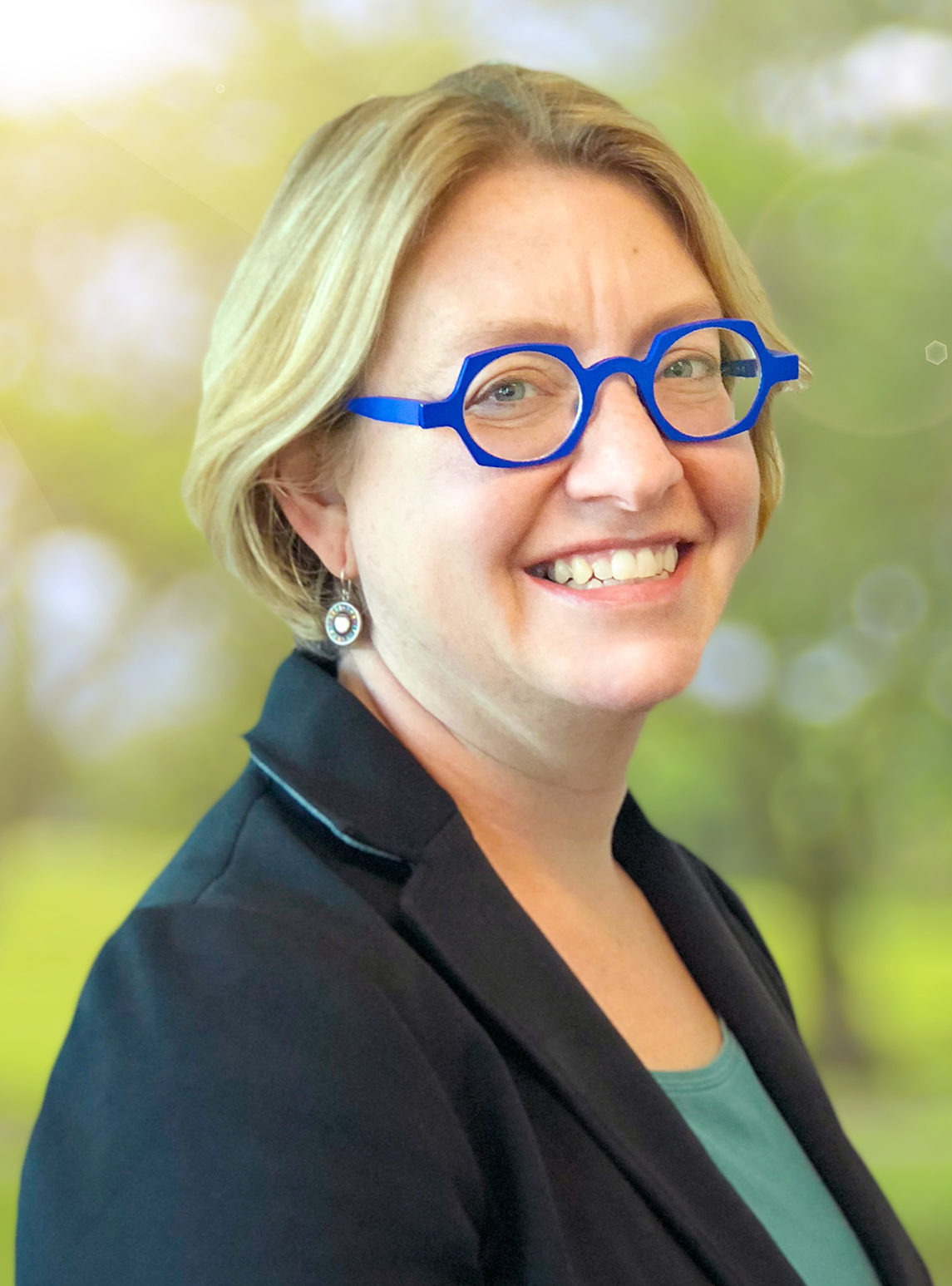
Dr. Judy Zerzan-Thul is the Chief Medical Officer at Washington State Health Care Authority, Co-Chair of the LAN Executive Forum, and a general internal medicine physician. She leads the state of Washington’s Medicaid Transformation Project, where she collaborates with stakeholders to advance health equity and the innovative use of data. As Chief Medical Officer of the Washington State Health Care Authority, she administers the state’s Medicaid program. She also works to advance the LAN’s strategic objectives to drive equitable health outcomes and lower the total cost of care.
Dr. Zerzan-Thul specializes in value-based payment models and healthcare financing. Prior to her role as the Chief Medical Officer for Washington State, Dr. Zerzan-Thul was the Chief Medical Officer at the Colorado Department of Health Care Policy and Financing. She led the implementation of the Affordable Care Act (ACA) in Colorado. She has extensive experience designing and implementing health plans and benefits for Medicaid programs. Dr. Zerzan-Thul’s background also includes leadership positions in the Medicaid Medical Director’s Network. She has also served as a committee member and advisor for national organizations, including the Agency for Healthcare Research and Quality, the National Quality Forum, the National Committee for Quality Assurance, the National Academy for State Health Policy, the Patient-Centered Outcomes Research Institute, and the Centers for Medicare & Medicaid Services.
Dr. Zerzan-Thul holds a Doctor of Medicine from Oregon Health and Science University and received a Master of Public Health in Health Policy and Administration from the University of North Carolina. She completed the Robert Wood Johnson Clinical Scholars Program at the University of Washington/VA Puget Sound Health Care System in 2007. From 2008 to 2010, she was a non-residential Health and Aging Policy Fellow for the office of Senator John D. Rockefeller IV of West Virginia, where she supported public policy for the Affordable Care Act.
Dr. Judy Zerzan-Thul is the Chief Medical Officer at Washington State Health Care Authority, Co-Chair of the LAN Executive Forum, and a general internal medicine physician. She leads the state of Washington’s Medicaid Transformation Project, where she collaborates with stakeholders to advance health equity and the innovative use of data. As Chief Medical Officer of the Washington State Health Care Authority, she administers the state’s Medicaid program. She also works to advance the LAN’s strategic objectives to drive equitable health outcomes and lower the total cost of care.
Dr. Zerzan-Thul specializes in value-based payment models and healthcare financing. Prior to her role as the Chief Medical Officer for Washington State, Dr. Zerzan-Thul was the Chief Medical Officer at the Colorado Department of Health Care Policy and Financing. She led the implementation of the Affordable Care Act (ACA) in Colorado. She has extensive experience designing and implementing health plans and benefits for Medicaid programs. Dr. Zerzan-Thul’s background also includes leadership positions in the Medicaid Medical Director’s Network. She has also served as a committee member and advisor for national organizations, including the Agency for Healthcare Research and Quality, the National Quality Forum, the National Committee for Quality Assurance, the National Academy for State Health Policy, the Patient-Centered Outcomes Research Institute, and the Centers for Medicare & Medicaid Services.
Dr. Zerzan-Thul holds a Doctor of Medicine from Oregon Health and Science University and received a Master of Public Health in Health Policy and Administration from the University of North Carolina. She completed the Robert Wood Johnson Clinical Scholars Program at the University of Washington/VA Puget Sound Health Care System in 2007. From 2008 to 2010, she was a non-residential Health and Aging Policy Fellow for the office of Senator John D. Rockefeller IV of West Virginia, where she supported public policy for the Affordable Care Act.
Ms. Nedhari brings more than 18 years of experience in community organizing, reproductive justice, and program development. She is a mother, licensed Certified Professional Midwife, Family Counselor, and the Co-founding Executive Director of Mamatoto Village. Aza is a fiercely dedicated woman who believes that by promoting a framework of justice, the reduction of barriers in maternal and child health begins to dissipate; giving rise to healthy individuals, healthy families, and healthy communities. Aza is pursuing her Doctorate in Human Services with a concentration in Organizational Leadership and Management with an eye towards the sustainability of Black led organizations and cultivating innovative models of perinatal care delivery and workforce development.
Timothy P. McNeill is the founder of Freedmen’s Health, a Washington, DC healthcare consulting firm specializing in implementation of innovative models of care. Mr. McNeill also serves as the co-chair of the Partnership to Align Social Care. The Partnership to Align Social Care is a multi-sectoral group of health plans, health systems, community-based organizations and Government liaisons that work together to identify and address priority issues that are essential to a fully aligned health and social care system that incorporates the vital voice of the community.
Mr. McNeill has started or expanded multiple sustainable health programs including two Medicare Shared Savings Program (MSSP) ACOs, an IPA made up of FQHCs and independent physicians, a network of community-based free clinics, managed the operations of a network of Federally Qualified Health Centers, and established multiple regional networks to deliver Long-Term Services and Supports, contracting with MCOs, in support of State Medicaid Waiver implementation.
Mr. McNeill is a Registered Nurse with a bachelor’s degree from Howard University and a Master of Public Health from Eastern Virginia Medical School. Mr. McNeill is also a retired U.S. Navy Nurse Corps Officer.
Sam oversees food programs and systems change work at Reinvestment Partners, an anti-poverty non-profit based in Durham NC. She manages a $10m produce prescription program portfolio; guides program evaluation with a focus on strategic impact; and contributes to advocacy that seeks to integrate non-medical health services into healthcare delivery.
Before joining Reinvestment Partners, Sam was the program evaluator and food systems lead for a SNAP-Education program at NC State University. She received an MS in Food Policy and Applied Nutrition from the Friedman School of Nutrition Science and Policy, and she brings a critical perspective to food work.
Mr. Joseph Strickland resides in southeast Alabama having lived in the Wiregrass region for most of his life. He holds a Master of Science degree from Troy University. Mr. Strickland serves as the Director of Home and Community Services at SARCOA Area Agency on Aging, where he has been employed for the past 22+ years. He is passionate about developing and implementing quality LTSS: Long Term Services and Supports, for the Aging population. He was instrumental in developing a model of delivery for LTSS case management that led to successful contracting with a managed care organization.
In addition, Mr. Strickland served as lead developer for a case management software system used by all AAAs in support of their Medicaid Waiver case management activities. The case management system now serves as the data warehouse, “system of record”, and centralized case management system for all Alabama AAA case management activities. The development and implementation of the case management system was pivotal in the Alabama AAA effort to demonstrate proficiency in case management activities as well as provide a platform to manage programs, staff, and enrollees.
In addition to his work in developing and managing the case management system used by the Alabama AAA network, Mr. Strickland also serves as the lead for organization efforts focused on National Committee for Quality Assurance (NCQA) Accreditation standards for CM-LTSS.
SARCOA was the first AAA in Alabama to become Accredited by the National Committee for Quality Assurance for CM-LTSS and was instrumental in leading all Alabama AAAs in their efforts to become accredited.
Alice Hm Chen, MD, MPH, serves as Chief Health Officer (CHO) for Centene Corporation. Dr. Chen is responsible for Centene’s strategies, policies, and programs in support of improving population health for Centene’s more than 26 million members.
Prior to joining Centene, Dr. Chen was Chief Medical Officer at Covered California, the state’s health insurance marketplace, where she was responsible for healthcare strategy focused on quality, equity and delivery system transformation. She previously served as Deputy Secretary for Policy and Planning and Chief of Clinical Affairs for the California Health and Human Services Agency, where she led signature health policy initiatives on affordability and access, and played a leadership role in the state’s response to the COVID-19 pandemic. Dr. Chen was also a professor of medicine at the University of California San Francisco School of Medicine, based at the Zuckerberg San Francisco General Hospital, where she served as its Chief Integration Officer and founding director of the eConsult program.
Dr. Chen received a Bachelor of Science in Environmental Biology from Yale University and has a Doctor of Medicine from the Stanford University School of Medicine. She also has a Master of Public Health in Health Care Management and Policy from Harvard School of Public Health. A primary care internist by training, she provides clinical care at Zuckerberg San Francisco General Hospital.
Since 2008, Leah Binder, M.A., M.G.A., has served as president and CEO of The Leapfrog Group, an award-winning national nonprofit based in Washington, D.C. Leapfrog represents employers and other purchasers of health care calling for improved safety and quality in hospitals. She is a regular contributor to Forbes.com, Harvard Business Review, and other publications and is consistently cited among the most influential people and top women in health care.
Through annual surveys, The Leapfrog Group collects data from hospitals and ambulatory surgery centers on the quality of care. Leapfrog also grades hospitals on how safe they are, a bold initiative that experts estimate has saved over 40,000 lives a year since 2017. Before joining Leapfrog, Leah was vice president for a nationally noted rural health system in Farmington, Maine. Prior to that, she served as a senior policy advisor in the New York City Office of the Mayor. She started her career at the National League for Nursing. Leah has a bachelor’s degree from Brandeis University and two master’s degrees from the University of Pennsylvania. She lives in the Washington, D.C., area with her husband and two sons.
Jeff Micklos, J.D., is the executive director of the Health Care Transformation Task Force. An attorney by training, Jeff is the former executive vice president of Management, Compliance & General Counsel for the Federation of American Hospitals, a national trade association representing investor-owned hospitals. He is also a former partner in the Health Law department of the international law firm Foley & Lardner LLP. Jeff began his career as a litigator and regulatory counsel for the Health Care Financing Administration of the U.S. Department of Health and Human Services. Additionally, Jeff served in the Office of General Counsel of the Social Security Administration.
Jeff is a graduate of the Catholic University of America’s Columbus School of Law. He received a Bachelor of Arts from Villanova University. He resides in Washington, D.C., with his wife, Monica, and their four children.
Rhonda M. Medows, M.D., is president of Population Health Management at Providence, one of the largest nonprofit health systems in the United States, and chief executive officer of Ayin Health Solutions, a population health management company launched by Providence.
She leads Providence’s Medicaid, Medicare, commercial, and employer population health strategies, as well as the organization’s value-based care, health plans, population health informatics, government programs, care management, contracting, and community health partnerships. Providence Population Health leads the mental health improvement strategy across Providence’s seven-state footprint.
Dr. Medows has extensive health care industry experience in both the private sector and government health programs including Medicare and Medicaid. She formally served on the U.S. Department of Health and Human Services Physician-Focused Payment Model Technical Advisory Council focused on developing new alternative payment models.
Prior to joining Providence, she served as an executive vice president and chief medical officer of UnitedHealth Group. While there, she led quality management and improvement initiatives and provided leadership and oversight of efforts to improve clinical quality and operational excellence. Until March 2010, Dr. Medows served as commissioner for the Georgia Department of Community Health and as Georgia’s state health officer, where she oversaw the state’s Medicaid and State Children’s Health Insurance (SCHIP) programs and ran the state employee benefit plan, public health department, public health emergency preparedness, rural health, and information technology.
Dr. Medows also served as secretary of the Florida Agency for Health Care Administrative, the state agency responsible for the Medicaid and SCHIP programs, health facility regulation, managed care quality, health information exchange, and public policy development. She also served as the chief medical officer for the Centers for Medicare & Medicaid Services southeast region.
Dr. Medows holds a bachelor’s degree from Cornell University and earned her medical degree from Morehouse School of Medicine in Atlanta, Georgia. She practiced medicine at Mayo Clinic and is board certified in family medicine. She is also a fellow of the American Academy of Family Physicians.
Sinsi Hernández-Cancio, JD, is a vice president at the National Partnership for Women & Families, where she leads the Health Justice team. She is a national health and health care equity policy and advocacy thought leader with 25 years of experience advancing equal opportunity for women and families of color, and almost 20 years advocating for increased health care access and improved quality of care for underserved communities. Sinsi is deeply committed to transforming our health care system to meet the needs of our rapidly evolving nation so we can all thrive together. She believes that our future prosperity depends on ensuring our health care system routinely provides excellent, comprehensive, culturally centered and affordable care for every single person, family and community, and that this requires the dismantling of structural inequities including racism, sexism, ableism, homophobia, transphobia, xenophobia and religious bigotry.
Sinsi is a recognized leader in the national health equity movement, a sought-after strategic advisor and a dynamic, inspiring speaker. She has presented at national events across the country and served on numerous advisory committees for organizations including the National Academy of Medicine, the National Committee for Quality Assurance, the Patient Centered Outcomes Research Institute, the Robert Wood Johnson Foundation, the National Center for Complex Health and Social Needs and the American Association of Pediatrics. She has published extensively and has appeared in national and state level English and Spanish television, radio and print media.
Sinsi’s extensive experience in health and health equity policy and advocacy spans the state government, labor and non-profit arenas. Prior to joining the National Partnership’s staff, she was the founding director of Families USA’s Center on Health Equity Action for System Transformation, where she led efforts to advance health equity and reduce disparities in health outcomes and health care access and quality by leveraging health care and delivery system transformation to reduce persistent racial, ethnic and geographic health inequities with an intersectional lens. Prior to that, she advised and represented two governors of Puerto Rico on federal health and human services policies, and she worked for the Service Employees International Union (SEIU) as a senior health policy analyst and national campaign coordinator for their Healthcare Equality Project campaign to enact the Affordable Care Act.
Born in San Juan, Puerto Rico, Sinsi is bilingual and bicultural. She earned an A.B. from Princeton University’s Woodrow Wilson School of Public and International Affairs and a J.D. from New York University School of Law, where she was an Arthur Garfield Hays Civil Liberties Fellow, and won the Georgetown Women’s Law and Public Policy Fellowship. She lives in Fairfax with her husband, teenage son and two rescue dogs. She loves sci-fi, board games and expressing her love for family and friends by feeding them.
Purva Rawal, Ph.D., is the chief strategy officer at the CMS Innovation Center at the Centers for Medicare and Medicaid Services. As part of the Senior Leadership team, she provides guidance and leadership on the execution of the Innovation Center’s strategy.
Previously, she was a principal at CapView Strategies, where she developed evidence-based public policy and business strategies for providers, health systems, life sciences companies, and coalitions. She also conducted policy research on health system transformation and sustainability issues. She is also an adjunct assistant professor at Georgetown University. In 2016, she published a book, The Affordable Care Act: Examining the Facts. Previously, Dr. Rawal served as professional staff on the Senate Budget Committee during the passage of the Affordable Care Act and as the health and social policy advisor to Sen. Joseph Lieberman (I-CT). She was also a director in the Health Insurance and Reform Practice at Avalere Health. She began her health policy career as a Christine Mirzayan Science and Technology Fellow at the National Academy of Sciences and as a Congressional Fellow for the Society for Research on Child Development and the American Association for the Advancement of Science. Dr. Rawal received her B.A. and Ph.D. from Northwestern University.
Dora Hughes, M.D., M.P.H., is the Chief Medical Officer at the CMS Innovation Center at the Centers for Medicare & Medicaid Services. She leads the Center’s work on health equity, provides clinical leadership and input on models, serves as the Innovation Center’s primary liaison with medical and clinical stakeholders, and provides leadership to CMMI’s clinician community. In addition, Dr. Hughes is part of the Innovation Center’s Senior Leadership Team, helping to provide enterprise-level leadership and strategic direction to the Center.
Previously, Dr. Hughes served as an Associate Research Professor of Health Policy & Management at the Milken Institute School of Public Health at The George Washington University, where her work focused on the intersection of clinical and community health, health equity, social determinants of health, healthcare quality and workforce. Prior to this role, Dr. Hughes was a Senior Policy Advisor at Sidley Austin, where she advised on regulatory and legislative matters in the life science industry. Additionally, Dr. Hughes served as the Counselor for Science & Public Health to Secretary Kathleen Sebelius at the U.S. Department of Health & Human Services. In this role, she helped implement the Affordable Care Act and provided oversight and guidance to the Public Health Service Act authorized agencies and Food and Drug Administration.
Dr. Hughes began her career in health policy as Senior Program Officer at the Commonwealth Fund, and subsequently was Deputy Director for the Health, Education, Labor, and Pensions Committee under Senator Edward M. Kennedy. She then served as the Health Policy Advisor to former Senator Barack Obama.
Dr. Hughes received a B.S. from Washington University, M.D. from Vanderbilt and M.P.H. from Harvard. She completed internal medicine residency at Brigham & Women’s Hospital.
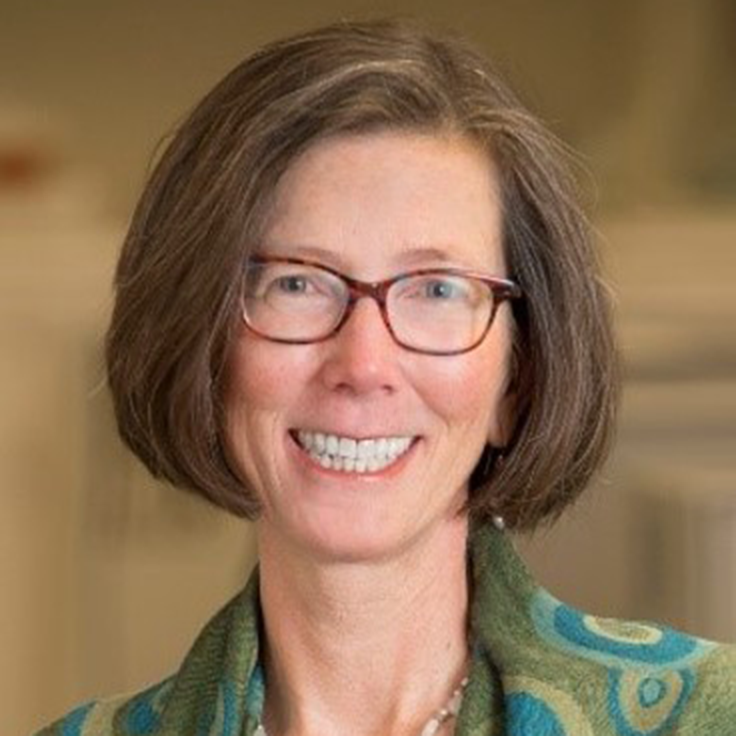 Emily DuHamel Brower, M.B.A., is senior vice president of clinical integration and physician services for Trinity Health. Emphasizing clinical integration and payment model transformation, Ms. Brower provides strategic direction related to the evolving accountable healthcare environment with strong results. Her team is currently accountable for $10.4B of medical expense for 1.6M lives in Medicare Accountable Care Organizations (ACOs), Medicare Advantage, and Medicaid and Commercial Alternative Payment Models.
Emily DuHamel Brower, M.B.A., is senior vice president of clinical integration and physician services for Trinity Health. Emphasizing clinical integration and payment model transformation, Ms. Brower provides strategic direction related to the evolving accountable healthcare environment with strong results. Her team is currently accountable for $10.4B of medical expense for 1.6M lives in Medicare Accountable Care Organizations (ACOs), Medicare Advantage, and Medicaid and Commercial Alternative Payment Models.
Ms. Brower joined Trinity Health from Atrius Health in Massachusetts, where she last served as vice president of Population Health. There, she built and executed the essential capabilities required to achieve strong financial and clinical outcomes within integrated care models under value-based reimbursement, particularly for publicly insured populations.
Prior to her career at Atrius Health, Ms. Brower spent 15 years in leadership roles at Urban Medical Group, a Massachusetts nonprofit healthcare organization specializing in the care of medically complex, chronically ill populations across a community-based, long-term care continuum. During that time, Ms. Brower launched a Program of All-inclusive Care for the Elderly (PACE) program and other innovative, capitated contracts for medically complex populations and served as Principal Investigator for a multi-year research project analyzing cost and quality outcomes to support payment reform.
Ms. Brower received her B.A. from Smith College and her M.B.A. from the New York University Stern School of Business.
 Mr. James Sinkoff is the Deputy Executive Officer and Chief Financial Officer for Sun River Health (formerly known as Hudson River HealthCare), and the Chief Executive Officer of Solutions 4 Community Health (S4CH); an MSO serving FQHCs and private physician practices.
Mr. James Sinkoff is the Deputy Executive Officer and Chief Financial Officer for Sun River Health (formerly known as Hudson River HealthCare), and the Chief Executive Officer of Solutions 4 Community Health (S4CH); an MSO serving FQHCs and private physician practices.
Sun River Health cares for over 240,000 general medicine, dental, behavioral health, mental health, agricultural, public housing, homeless, developmentally disabled, HIV and substance abuse patients and families generating nearly 780,000 patient encounters in over 43 clinical sites in both rural and urban settings in 10 counties of the Hudson Valley, 2 counties on Long Island and all of NYC. Sun River Health provides a full range of primary care, behavioral and mental healthcare services including but not limited to pediatrics, internal medicine, family medicine, OB/GYN, dentistry, urgent care, MAT and specific specialty care such as cardiology, endocrinology, and ophthalmology. Over 95,000 patients are managed under a variety of risk-based contacts as well as 11,000 MSSP ACO patients.
Mr. Sinkoff has worked in all sectors of the healthcare industry starting his career with Ernst & Young as an auditor and then as a senior management consultant to hospitals, physician practices, long term care facilities, and home health agencies. In the late ‘90s, he became the director of managed care financing for Berkshire Health Systems. Subsequently, he became the Chief Financial Officer for Fidelis Care New York (now Centene). Mr. Sinkoff was the Chief Executive Officer of Whitney M. Young Jr. Health Center in Albany, New York, before joining Sun River Health and Solutions 4 Community Health in late 2009.
As the DEO, Mr. Sinkoff oversees all aspects of Sun River Health’s service delivery system; clinical, financial and operational. He has been invited to share his thoughts on many topics including value-based systems of care, health equity, IT, interoperability, LEAN and Emotionally Intelligent management. Mr. Sinkoff is a coach to a number of clients seeking to grow and achieve their professional aspirations.
Mr. Sinkoff was an appointed member of the NYSDOH Transparency, Evaluation and HIT Workgroup. He is a member of the board and an executive committee member of the Health Care Transformation Task Force, formerly a part of the Levitt Group. He is a member serving the Robert Wood Johnson Foundation to Improve Health Equity led by the University of Chicago, the Institute for Medicaid Innovation, and the Center for Health Care Strategies. He is a member of the legislative, public policy and sub-committee on health center financing of the National Association of Community Health Centers. He is a member of the board of Amida Care, an HIV and Special needs plan. Mr. Sinkoff is the former chair of the board of the Community Healthcare Association of New York.
 Victor is the Chief Medical Officer for TennCare, Tennessee’s Medicaid Agency. At TennCare, Victor leads the medical office to ensure quality and effective delivery of medical, pharmacy, and dental services to its members. He also leads TennCare’s opioid epidemic strategy, social determinants of health, and practice transformation initiatives across the agency. Prior to joining TennCare, Victor worked at Evolent Health supporting value-based population health care delivery. In 2013, Victor served as a White House Fellow to the Secretary of Health and Human Services. Victor completed his Internal Medicine Residency at Emory University still practices clinically as an internist in the Veteran’s Affairs Health System.
Victor is the Chief Medical Officer for TennCare, Tennessee’s Medicaid Agency. At TennCare, Victor leads the medical office to ensure quality and effective delivery of medical, pharmacy, and dental services to its members. He also leads TennCare’s opioid epidemic strategy, social determinants of health, and practice transformation initiatives across the agency. Prior to joining TennCare, Victor worked at Evolent Health supporting value-based population health care delivery. In 2013, Victor served as a White House Fellow to the Secretary of Health and Human Services. Victor completed his Internal Medicine Residency at Emory University still practices clinically as an internist in the Veteran’s Affairs Health System.
 Dr. Brandon G. Wilson, DrPH, MHA (he, him, his) joined Community Catalyst as the Director of the Center for Consumer Engagement in Health Innovation, where he leads the Center in bringing the community’s experience to the forefront of health systems transformation and health reform efforts, in order to deliver better care, better value and better health for every community, particularly vulnerable and historically underserved populations. The Center works directly with community advocates around the country to increase the skills and power they have to establish an effective voice at all levels of the health care system. The Center collaborates with innovative health plans, hospitals and providers to incorporate communities and their lived experience into the design of systems of care. The Center also works with state and federal policymakers to spur change that makes the health system more responsive to communities. And it provides consulting services to health plans, provider groups and other health care organizations to help them create meaningful structures for engagement with their communities.
Dr. Brandon G. Wilson, DrPH, MHA (he, him, his) joined Community Catalyst as the Director of the Center for Consumer Engagement in Health Innovation, where he leads the Center in bringing the community’s experience to the forefront of health systems transformation and health reform efforts, in order to deliver better care, better value and better health for every community, particularly vulnerable and historically underserved populations. The Center works directly with community advocates around the country to increase the skills and power they have to establish an effective voice at all levels of the health care system. The Center collaborates with innovative health plans, hospitals and providers to incorporate communities and their lived experience into the design of systems of care. The Center also works with state and federal policymakers to spur change that makes the health system more responsive to communities. And it provides consulting services to health plans, provider groups and other health care organizations to help them create meaningful structures for engagement with their communities.
Dr. Wilson joined the Center, following his tenure in federal service as a Senior Public Health Advisor with the Centers for Medicare and Medicaid Services (CMS) Office of Minority Health, where he led strategic initiatives to implement the Biden/Harris Administration’s priorities on health equity for underserved communities, and developed a health equity business case portfolio. He most recently received the CMS Impact Award from CMS Administrator Chiquita Brooks-LaSure for advancing health equity and accessibility in COVID-19 for persons living with disabilities. Prior to joining CMS OMH, Dr. Wilson led a $250 million portfolio in the CMS Innovation Center’s Accountable Health Communities Model and the Health Care Innovation Awards. At CMMI, he spearheaded the Health Equity Working Group, which laid the foundation for CMMI’s health equity focus in its 10-year strategy refresh. He later directed culture of patient safety quality improvement projects for the NIH Clinical Center Office of the Director, by reducing medication errors in the inpatient oncology pharmacy department. He also headed recruitment and retention approaches for increasing minority screening, enrollment, and retention in preventative and therapeutic vaccine clinical trials and participation in the Community Advisory Board at NIH. For his exceptional commitment and dedication in identifying a solution for a global infectious disease threat by advancing a malaria vaccine through a clinical trial, Dr. Wilson received awards from NIH’s Director, Dr. Francis Collins and NIAID’s Director, Dr. Anthony Fauci.
Dr. Wilson brings a wealth of knowledge, skills, and abilities in advocacy, health policy, and research from national policy organizations as the National Association of People with AIDS. Dr. Wilson completed his Master’s in Health Systems Management at George Mason University and his Doctor of Public Health at Morgan State University. He also holds Public Health faculty appointments at Purdue University and the UNC Gillings School of Global Public Health, where he teaches courses in health economics and policy, cultural competence and communications for health professionals, community health assessments, and healthcare marketing. His research interests include using patient centered and indigenous models of care, health economics outcomes research, policy analysis, and community-based participatory and action research to eliminate health disparities and advance health equity in underserved and disinvested communities.
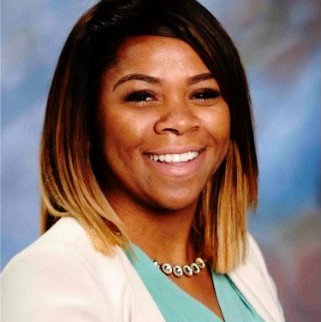 Tamara Ward is the SVP of Insurance Business Operations at Oscar Health, where she leads the National Network Contracting Strategy and Market Expansion & Readiness. Prior to Oscar she served as VP of Managed Care & Network Operations at TriHealth in Southwest Ohio. With over 15 years of progressive health care experience, she has been instrumental driving collaborative payer provider strategies, improving insurance operations, and building high value networks through her various roles with UHC and other large provider health systems. Her breadth and depth of experience and interest-based approach has allowed her to have success solving some of the most complex issues our industry faces today. Tam is passionate about driving change for marginalized communities, developing Oscar’s Culturally Competent Care Program- reducing healthcare disparities and improving access for the underserved population. Tamara holds a B.A. from the University of Cincinnati’s and M.B.A from Miami University.
Tamara Ward is the SVP of Insurance Business Operations at Oscar Health, where she leads the National Network Contracting Strategy and Market Expansion & Readiness. Prior to Oscar she served as VP of Managed Care & Network Operations at TriHealth in Southwest Ohio. With over 15 years of progressive health care experience, she has been instrumental driving collaborative payer provider strategies, improving insurance operations, and building high value networks through her various roles with UHC and other large provider health systems. Her breadth and depth of experience and interest-based approach has allowed her to have success solving some of the most complex issues our industry faces today. Tam is passionate about driving change for marginalized communities, developing Oscar’s Culturally Competent Care Program- reducing healthcare disparities and improving access for the underserved population. Tamara holds a B.A. from the University of Cincinnati’s and M.B.A from Miami University.
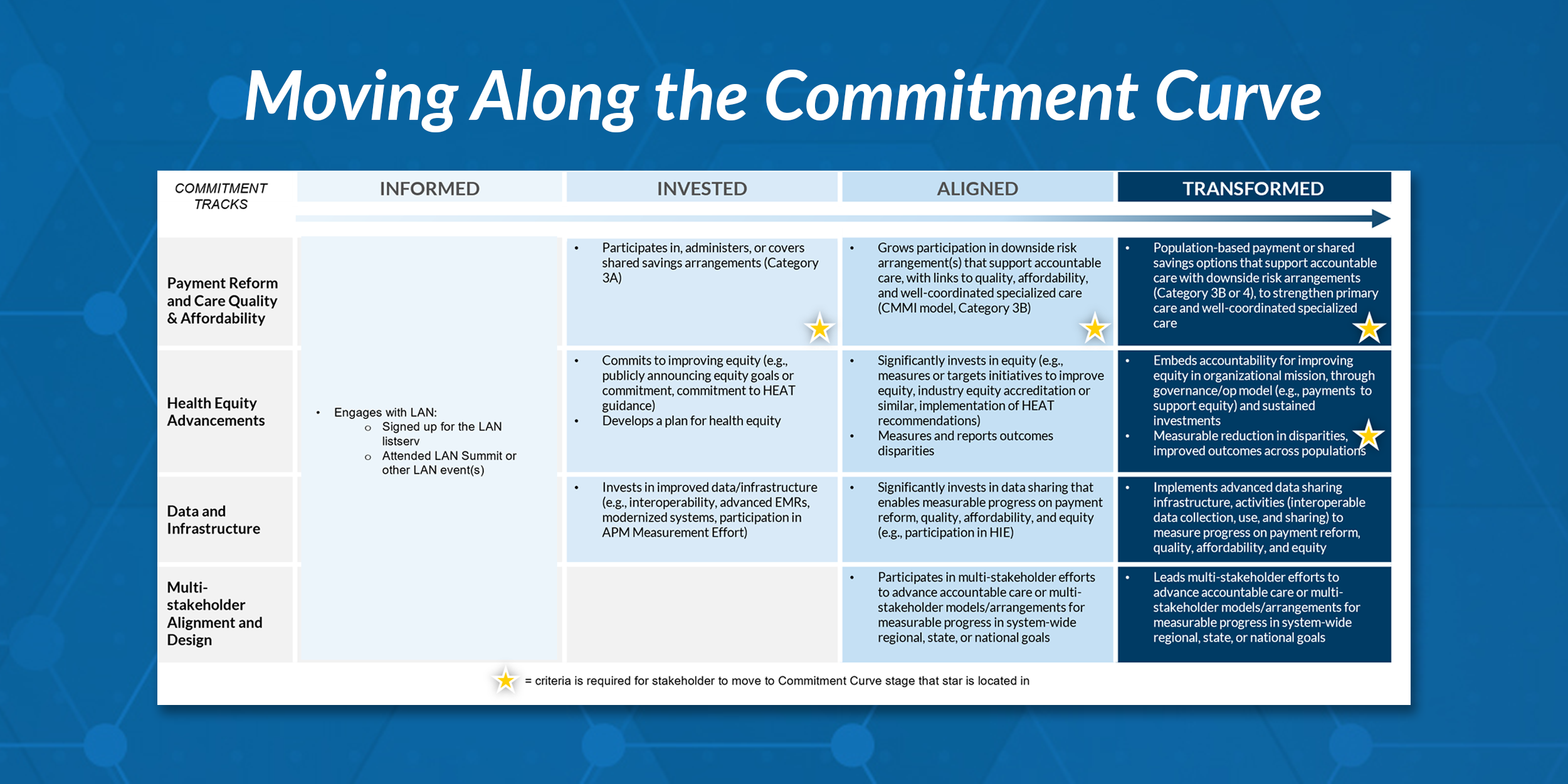
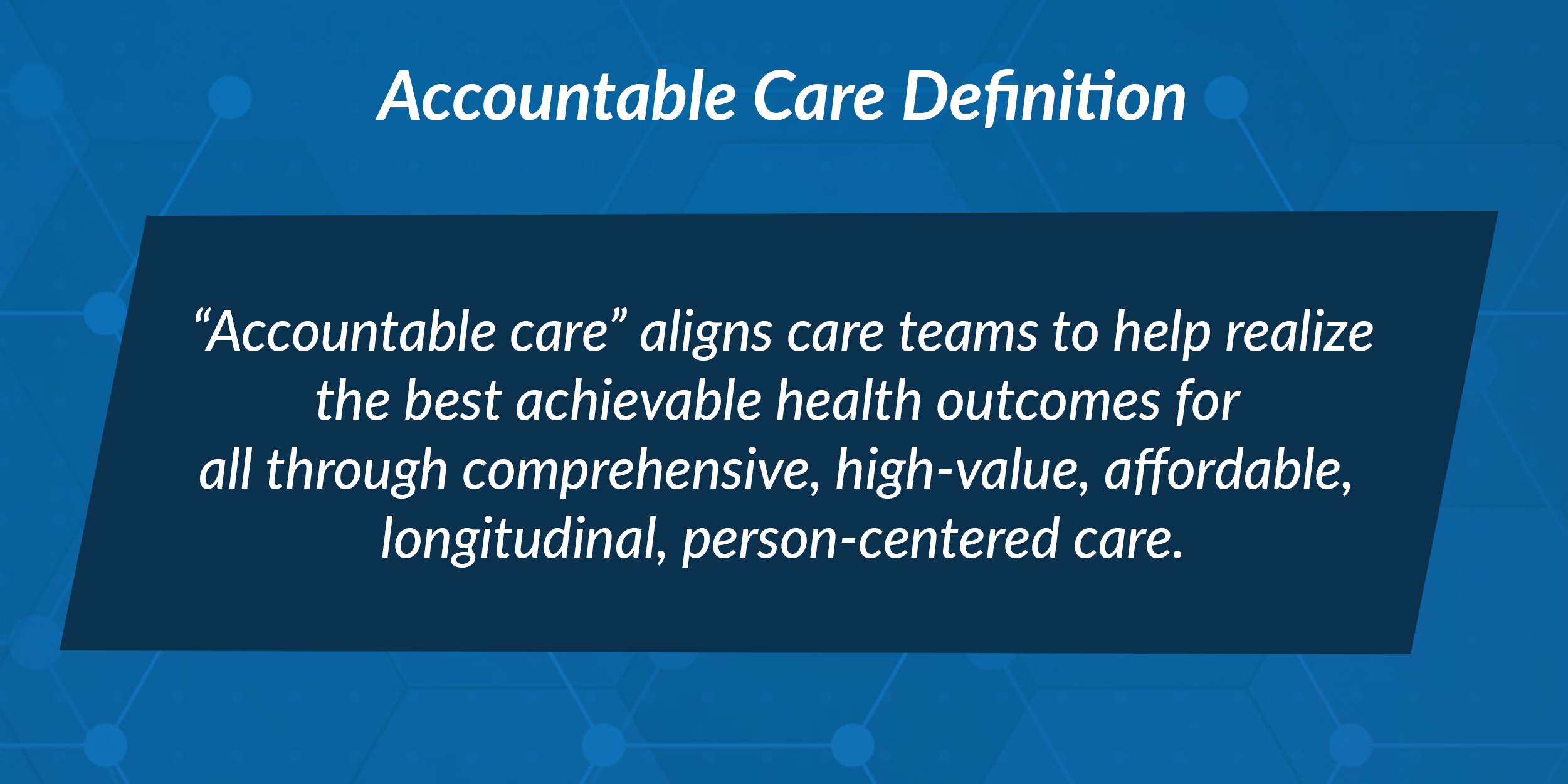
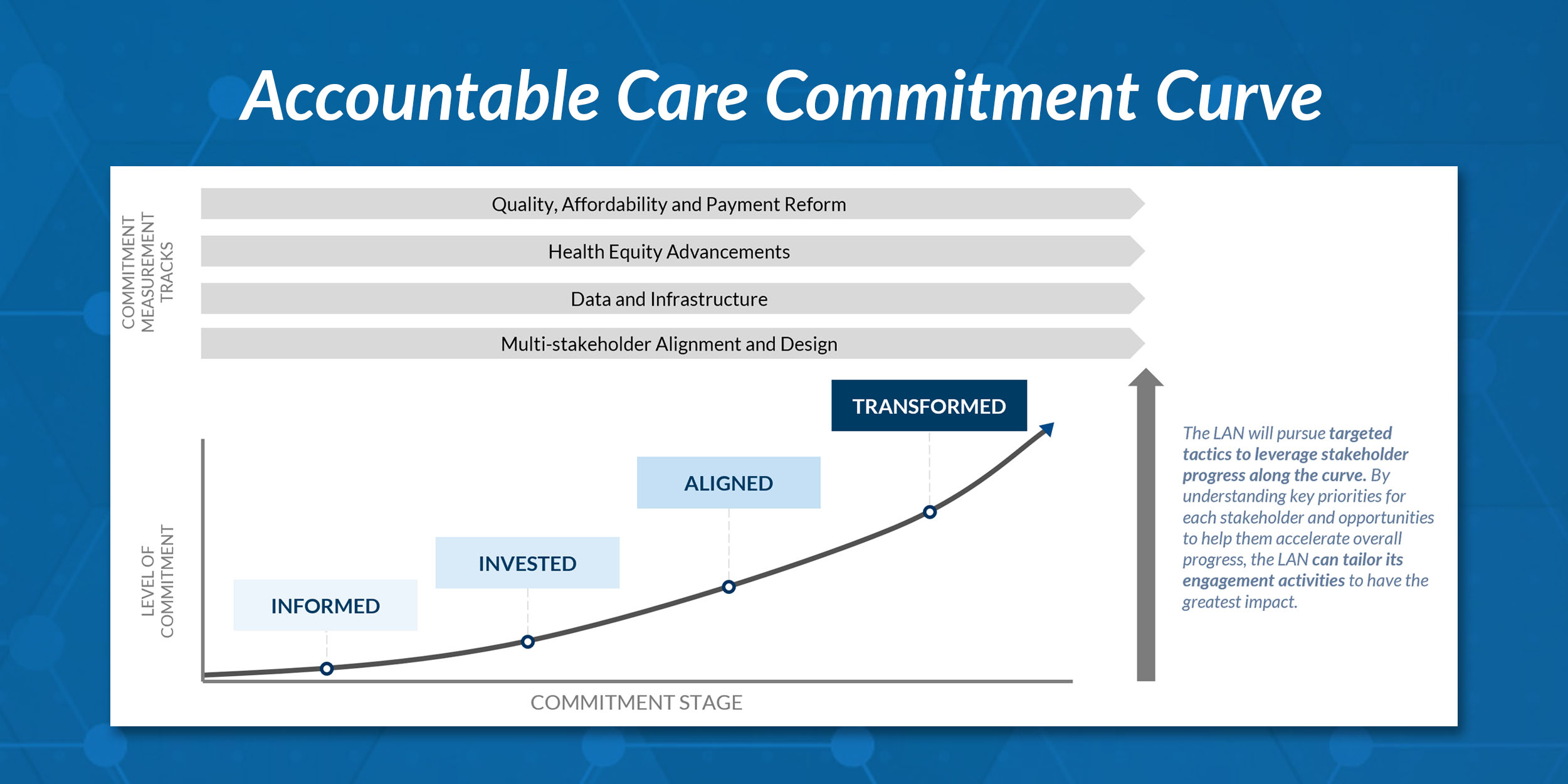
[ht_message mstyle=”info” title=”” show_icon=”” id=”” class=”” style=”” ]
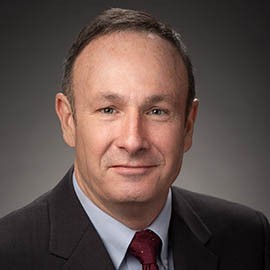 Dr. Peter Walsh joined the Colorado Department of Health Care Policy and Financing as the Chief Medical Officer on December 1, 2020. Prior to joining HCPF, Dr. Walsh served as a Hospital Field Representative/Surveyor at the Joint Commission, headquartered in Oakbrook Terrace, Illinois.
Dr. Peter Walsh joined the Colorado Department of Health Care Policy and Financing as the Chief Medical Officer on December 1, 2020. Prior to joining HCPF, Dr. Walsh served as a Hospital Field Representative/Surveyor at the Joint Commission, headquartered in Oakbrook Terrace, Illinois.
Dr. Walsh is an Aerospace Medicine Specialist, who provided primary care to aircrew and special operational personnel and their families during much of his 21-year active-duty career in the U.S. Air Force. Upon retirement in 2006 he served as an Urgent Care Physician at the previous Memorial Health System in Colorado Springs between 2006 and 2008 and practiced at the Centura Center for Occupational Medicine in Colorado Springs, CO and Pueblo, CO between 2006 and 2009.
His prior positions include serving as the Chief Medical Officer, South State Operating Group of Centura Health, Corporate Chief Medical Executive for Centura Health in Denver, Colorado, and the VP of Medical Affairs at St. Francis Medical Center in Colorado Springs, Colorado.
Dr. Walsh received his B.A. at the University of Southern California, his M.D. from the Medical College of Ohio in Toledo, Ohio, and a M.P.H. from Harvard School of Public Health. He completed his residency in Aerospace Medicine at the USAF School of Aerospace Medicine at Brooks AFB, Texas.

Dr. William Shrank is Humana’s Chief Medical Officer (CMO). He leads the Integrated Health Solutions team that consists of several key clinical areas of the business. Dr. Shrank oversees Humana’s senior-focused, purpose driven, primary care organization, and guides the implementation of Humana’s integrated care delivery strategy, with an emphasis on advancing the company’s clinical capabilities. He launched Humana’s health equity department, Humana’s population health strategy (the Bold Goal), and the Humana Healthcare Research team. Across all divisions, Dr. Shrank promotes the idea of Humana as a learning organization and has dedicated his team to rapid learning – where meaningful insights are generated accurately and quickly, and enhance Humana’s ability to continually evolve to improve the health and health outcomes of those we serve.
Dr. Shrank is a member of the Management Team, which sets the firm’s strategic direction, and reports and to President and Chief Executive Officer, Bruce Broussard. Additionally, Dr. Shrank serves on the Board of National Committee for Quality Assurance and is co-chair of the Clinical Transformation Taskforce for the Health Care Payment Learning and Action Network.
Dr. Shrank joined Humana in April 2019 having previously been employed by the University of Pittsburgh Medical Center (UPMC) as CMO, Insurance Services Division from 2016 to 2019. At UPMC, Dr. Shrank was responsible for clinical operations, policy and quality for approximately 3.5 million members in government and commercial lines of business.
Prior, Dr. Shrank served as SVP, Chief Scientific Officer, and CMO of Provider Innovation at CVS Health from 2013 to 2016. From 2011 to 2013, Dr. Shrank served as Director, Research and Rapid[1]Cycle Evaluation Group, for the Center for Medicare and Medicaid Innovation, part of the Centers for Medicaid and Medicare Services.
Dr. Shrank began his career as a practicing physician with Brigham and Women’s Hospital and as an Assistant Professor at Harvard Medical School.
Dr. Shrank completed his medical degree from Cornell University Medical College, his residency in internal medicine at Georgetown University and his fellowship in Health Policy Research at the University of California, Los Angeles. He also earned a Master of Science degree in Health Services from the University of California, Los Angeles and a Bachelor of Arts degree from Brown University.
.

Mat Spaan, MPA, has worked with the state of Minnesota since 2008 in implementing and developing health policy and payment reform initiatives, with his most recent work managing care delivery and payment activities within the state’s Medicaid program. Since 2013, one of his primary roles is as lead on Minnesota’s Medicaid ACO demonstration, known as the Integrated Health Partnerships (IHP) program, and the development of value-based purchasing in Medicaid.
Mat’s previous state projects have included the development of the state’s All-Payer Claims Database and planning director overseeing the creation of a hospital and physician clinic cost and quality comparison tool. Prior to joining the state, he’s held several interesting positions in the private and nonprofit sectors, including as a manager with a national health advocacy organization, organizer for a neighborhood arts and economic development nonprofit in New Orleans, and as a boat captain on Lake Michigan. Mat earned his Master of Public Administration degree from the University of New Orleans.
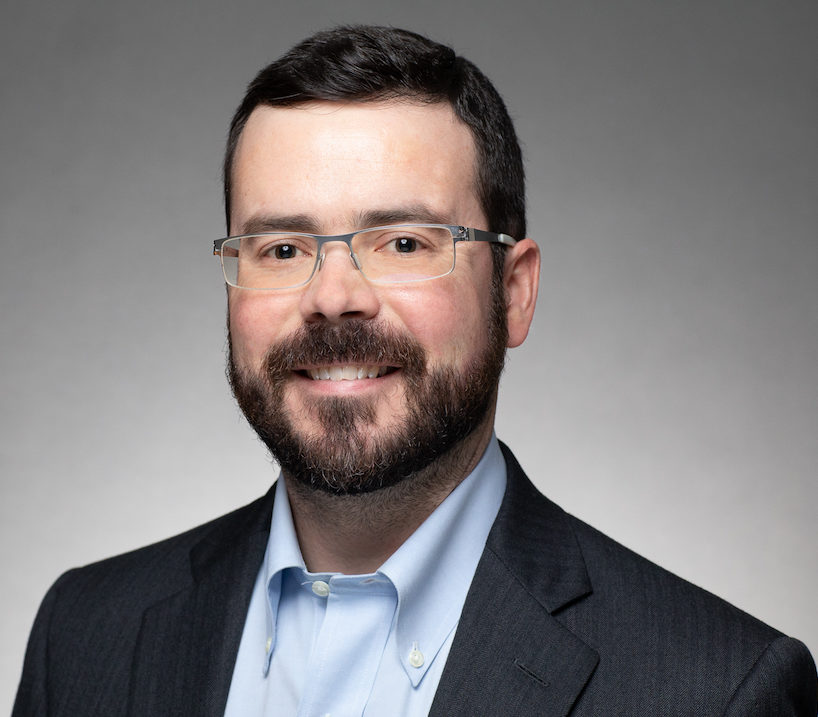
Dr. Mark Friedberg is Senior Vice President of Performance Measurement and Improvement for our company, the largest private health plan in Massachusetts and one of the largest independent, not-for-profit Blue Cross Blue Shield plans in the country. We serve more than 3 million members and more than 20,000 employers and are consistently rated among the nation’s best health plans for overall member satisfaction and quality.
Mark is responsible for all activities related to measuring and improving the performance of our provider network, including quality and equity metrics used in our value-based contracts such as our Alternative Quality Contract. He also oversees data analytics related to our own performance, ensuring we meet or exceed state and federal standards as well as HEDIS, NCQA and CMS quality measures.
Before joining our company in 2019, Mark was a researcher at the RAND Corporation, a leading policy research organization, where he led multiple projects to measure, evaluate and improve health system performance.
He is a general internist who provides primary care at Brigham and Women’s Hospital, where he completed his residency and fellowship. Mark works at the Brigham a half day each week.
Mark has an M.D. from Harvard Medical School, a Master of Public Policy from the Harvard Kennedy School of Government, and a Bachelor of Arts from Swarthmore College. He is also a part-time assistant professor of medicine at Harvard Medical School. Mark enjoys music, food, and beach trips with his family.
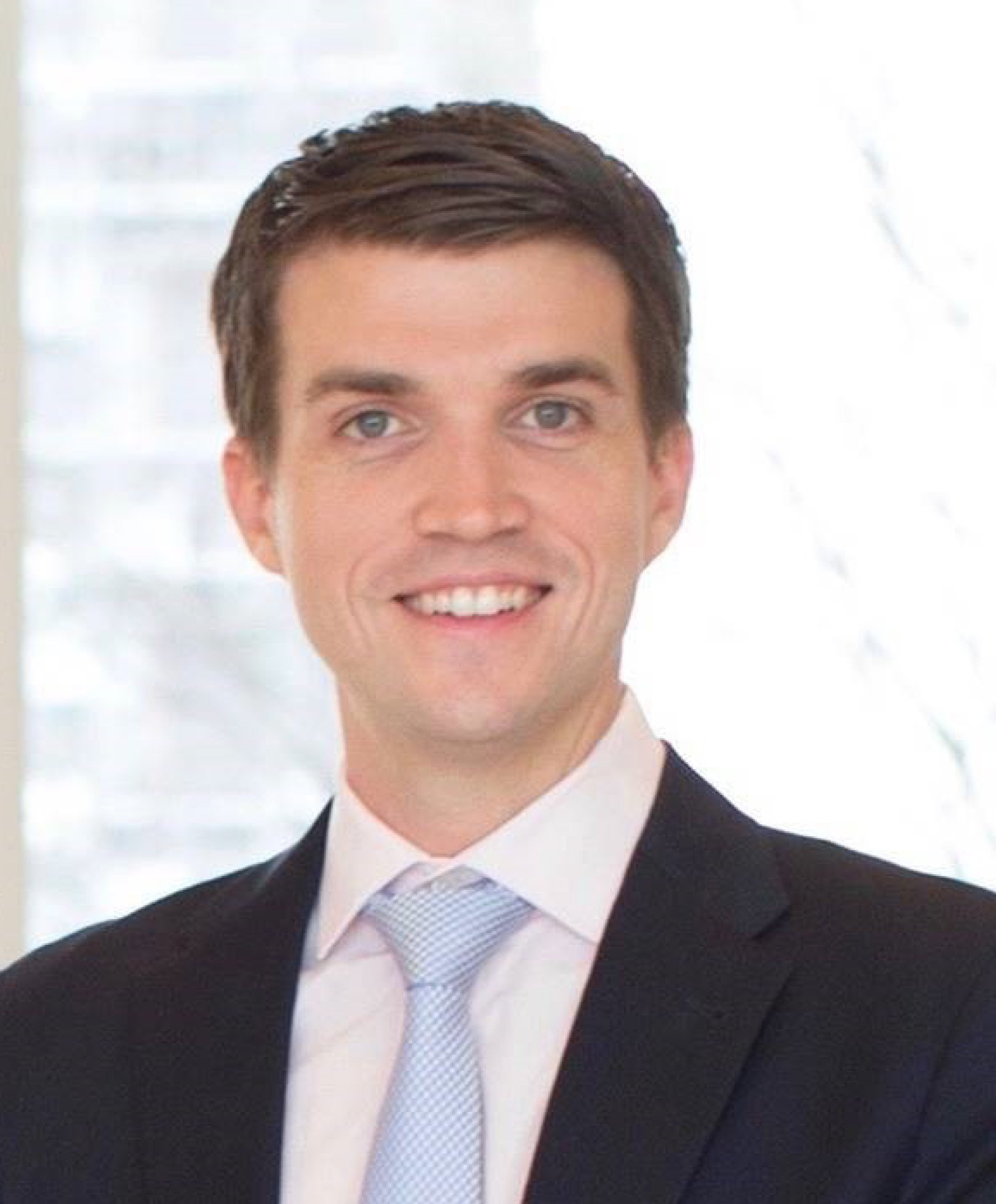
Brian W. Powers, MD, MBA is Deputy Chief Medical Officer at Humana. In this role, he works across the organization to support rapid learning and evaluation of Humana’s integrated care delivery strategy; to lead research in payment and delivery innovation; and to drive physician engagement, alignment, advocacy, and education across the company. Prior to Humana, he led population health strategy and analytics for CareMore and Aspire Health, both care delivery subsidiaries of Anthem. In prior roles, he was responsible for initiatives to improve health care quality and value at Mass General Brigham, the National Academy of Medicine, and the Massachusetts Health Policy Commission. An accomplished researcher, Dr. Powers is an Assistant Professor of Medicine at the Tufts University School of Medicine, has published peer-reviewed studies in venues such as JAMA, Science, and the New England Journal of Medicine, and serves as Deputy Editor of Healthcare: The Journal of Delivery Science and Innovation. He holds an MD from Harvard Medical School, an MBA from Harvard Business School, and an AB from Bowdoin College. He completed his clinical training in internal medicine and primary care at Brigham and Women’s Hospital and is a practicing internist.
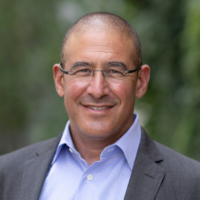
Marc Harrison, M.D., President and CEO of Intermountain Healthcare, is a pediatric critical care physician with a proven track record as a top operation executive on a global scale. He is a national and international thought leader on transformation and innovation—ranking in Fortune’s Top 50 World’s Greatest Leaders in 2019. He also ranked third on Modern Healthcare’s 100 Most Influential People in Healthcare in 2020.
Dr. Harrison is leading Intermountain’s 41,000 employees—who are all called caregivers—to embrace bold new approaches to improve health, re-define value-based care, and serve people in new ways. For example, Intermountain launched Civica Rx, a not-for-profit generic drug manufacturer and distributor, to make generic medications more available and affordable in hospitals across the nation. Intermountain is also a founding member of the Utah Alliance for the Determinants of Health, which is a collaboration of community partners designed to proactively address forces that affect people’s health well before they come to a clinic or a hospital.
Dr. Harrison also served as CEO of Cleveland Clinic Abu Dhabi, Chief of International Business Development at Cleveland Clinic, and Chief Medical Operations Officer at Cleveland Clinic.
He received his undergraduate degree from Haverford College and his medical degree from Dartmouth Medical School, completed a pediatric residency and pediatric care fellowship at Intermountain’s Primary Children’s Hospital, and completed a Master of Medical Management at Carnegie Mellon University.
Dr. Harrison is an all-American triathlete and represented the U.S. at the 2014 World Championships. He is also a two-time cancer survivor with his sights currently on completing an Ironman.

Marshall H. Chin, M.D., M.P.H., the Richard Parrillo Family Professor of Healthcare Ethics in the Department of Medicine at the University of Chicago, is a practicing general internist and health services researcher who has dedicated his career to reducing health disparities through interventions at individual, organizational, community, and policy levels.
Dr. Chin co-chairs the CMS HCP-LAN Health Equity Advisory Team. He also co-directs the Robert Wood Johnson Foundation Advancing Health Equity: Leading Care, Payment, and Systems Transformation program and collaborates with teams of state Medicaid agencies, Medicaid managed care organizations, and frontline healthcare organizations to implement payment reforms to support and incentivize care transformations that advance health equity. He also partners with eight urban and rural communities to integrate medical and social care to reduce diabetes disparities through the Merck Foundation Bridging the Gap program.
Dr. Chin is a graduate of Harvard College and the University of California at San Francisco School of Medicine, and he completed residency and fellowship training in general internal medicine at Brigham and Women’s Hospital, Harvard Medical School. He is a former President of the Society of General Internal Medicine, and he was elected to the National Academy of Medicine in 2017.
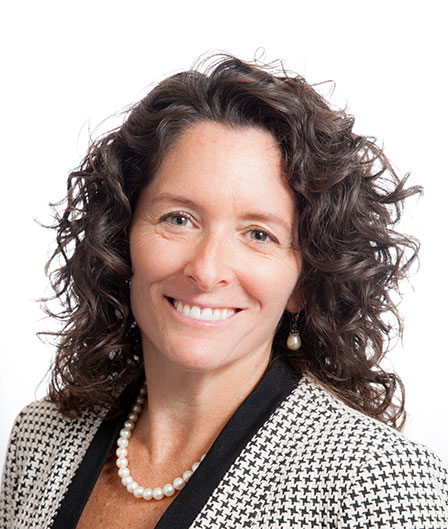
Christina Severin is a leading health care executive with more than 20 years of experience and numerous accomplishments in managed care, delivery systems, health insurance, Accountable Care Organizations, quality, public policy, and public health. She has led Community Care Cooperative (C3) since the organization’s launch in 2016, leveraging the proven best practices of ACOs throughout the country, building the organization on the collective strengths of its health centers, and growing the organization to better serve MassHealth members throughout the commonwealth. Christina’s prior leadership experience includes serving as President and Chief Executive Officer of Beth Israel Deaconess Care Organization and as President of Network Health, a nonprofit Massachusetts health plan.

Elizabeth Kasper is the Special Policy Advisor for Alternative Payment Models at North Carolina Medicaid. In this role, she works with external and internal stakeholders to support the design and implementation of value-based payment models and policies that advance NC Medicaid’s priorities. Liz’s 20-year career in health policy and health services research has also included work on health quality and public health measures, federally qualified health centers, Medicaid clinical policy, and pharmaceutical regulation and reimbursement. Liz holds a Master of Science in Public Health from the University of North Carolina at Chapel Hill and a BA from Oberlin College.

Dr. Palav Babaria was appointed Chief Quality Officer and Deputy Director of Quality and Population Health Management of the California Department of Health Care Services beginning in March 2021. Prior to joining DHCS, she served as Chief Administrative Officer for Ambulatory Services at the Alameda Health System (AHS) where she was responsible for all outpatient clinical operations, quality of care, and strategy for primary care, specialty care, dental services, and integrated and specialty behavioral health, as well as executive sponsor for value-based programs including the Medi-Cal 1115 Waiver. She also previously served as Medical Director of K6 Adult Medicine Clinic, where she managed a large urban hospital-based clinic, overseeing all practitioners, improving quality of care, and patient safety programs. In addition, she served on the Clinical Advisory Committee with the California Association of Public Hospitals/Safety Net Institute. She also has over a decade of global health experience and her work has been published in the New England Journal of Medicine, Academic Medicine, Social Science & Medicine, L.A. Times, and New York Times. Dr. Babaria received her bachelor’s degree from Harvard College, as well as her MD and Master’s in health science from Yale University. She completed her residency training in internal medicine and global health fellowship at the University of California, San Francisco.
Test
Dr. Chris Chen is Chief Executive Officer of ChenMed, a premier physician-led, technology-enabled healthcare organization. A champion for equitable health outcomes, ChenMed is transforming the care of underserved, overlooked seniors.
Dr. Chen is a bold innovator leading a revolution in healthcare through a global full-risk model; custom-designed physician training programs; and a proprietary technology platform, purpose-built for value-based care. He has led ChenMed to remarkable outcomes – equalized health inequities, 30-50% fewer hospitalizations, and high net promoter scores.
Since becoming ChenMed’s CEO in 2009, Dr. Chen has built the decades-old, highly successful ChenMed model into a scalable organization now spanning dozens of cities across many states.
ChenMed’s unique approach, proprietary technological capabilities, and results have led it to be named to Newsweek’s “Most Loved Workplaces” list, Fortune Magazine’s “Change the World” list, as well as earning recognition by the White House, the Department of Health and Human Services, and the U.K. National Health System. ChenMed has also been featured in publications such as Modern Healthcare, Health Affairs, Forbes, The Economist, Wall Street Journal, New England Journal of Medicine, The Guardian, and Medical Economics – which named ChenMed, “Best Primary Care System in the U.S.”
Under Dr. Chen’s leadership, ChenMed has also won multiple best places to work awards, including being certified a “Great Place to Work®” by the Great Place to Work Institute in 2021 and honored as the only primary care medical practice on the IDG Insider Pro and Computerworld “Best Place to Work in IT” list.
Brought up in South Florida, Dr. Chen graduated from the University of Miami’s Honors Program in Medicine. He went on to complete his medical training at Beth Israel Deaconess, a Harvard University teaching hospital, after which he completed a fellowship in cardiology at Cornell University Medical College in Manhattan, New York. A board-certified cardiologist, Dr. Chen sees patients at the company’s Miami Gardens, Florida medical center.
Marc Harrison, M.D., president and CEO of Intermountain Healthcare, is a pediatric critical care physician and recognized national and international leader in healthcare transformation. His leadership has placed him on Fortune’s Top 50 World’s Greatest Leaders in 2019 and regularly on Modern Healthcare’s Most Influential People in Healthcare.
Dr. Harrison leads Intermountain’s 59,000 employees—called caregivers—to reimagine operations and ways to keep people and communities healthier. Together, their mission-driven approach fuels their vision to build a model health system that delivers the best and most equitable outcomes by providing high-quality, more affordable care that is accessible to everyone.
To support this, Dr. Harrison has embraced unconventional, public-private partnerships to confront some of the most pressing systemic challenges facing the communities and industry. Under his leadership, Intermountain partnered with 1,400 hospitals nationwide to launch Civica Rx, a nonprofit generic drug manufacturer and distributor, to make generic medications—to include insulin in 2024—more accessible and far more affordable. Intermountain is also a founding member of the Utah Alliance for the Determinants of Health, which is a collaboration of community partners proactively addressing forces that affect people’s health often before they get sick. Also, Intermountain is partnering with an international genomics leader and more than 100,000 volunteers to advance medical breakthroughs that will help prevent and treat genetic diseases for people around the globe.
In Dr. Harrison’s first five years leading Intermountain, the company’s primary service area grew from focusing mainly on Utah communities to serving people throughout the Mountain West through a disciplined growth strategy and significant investments in telehealth and rural health. His leadership style has helped make Intermountain a magnet for healthcare innovation. This includes spurring new partnerships leading the national movement toward value-based care, advancing clinical education, and establishing a new Digital Hippocratic Oath to improve hospital data interoperability and secure patient privacy rights.
On his popular podcast, A Healthier Future, Dr. Harrison interviews leaders from an array of industries and backgrounds to explore how we can work together to improve health. He is among the most influential healthcare leaders on LinkedIn (320,000 followers)—regularly engaging in conversations about his team, health innovation, family, and leadership.
Before leading Intermountain, Dr. Harrison served as CEO of Cleveland Clinic Abu Dhabi, chief of international business development at Cleveland Clinic, and chief medical operations officer at Cleveland Clinic. He received his undergraduate degree from Haverford College, his medical degree from Dartmouth Medical School, completed a pediatric residency and pediatric critical care fellowship at Intermountain’s Primary Children’s Hospital, and a Master of Medical Management at Carnegie Mellon University.
Dr. Harrison is an all-American triathlete and represented the U.S. at the 2014 World Championships. He is also a two-time cancer survivor, with his sights currently on completing an Ironman. He is also a loving husband and proud father of three adult children.
Dr. William Shrank is Humana’s Chief Medical Officer (CMO). He leads the Integrated Health Solutions team that consists of several key clinical areas of the business. Dr. Shrank oversees Humana’s senior-focused, purpose driven, primary care organization, and guides the implementation of Humana’s integrated care delivery strategy, with an emphasis on advancing the company’s clinical capabilities. He launched Humana’s health equity department, Humana’s population health strategy (the Bold Goal), and the Humana Healthcare Research team. Across all divisions, Dr. Shrank promotes the idea of Humana as a learning organization and has dedicated his team to rapid learning – where meaningful insights are generated accurately and quickly, and enhance Humana’s ability to continually evolve to improve the health and health outcomes of those we serve.
Dr. Shrank is a member of the Management Team, which sets the firm’s strategic direction, and reports and to President and Chief Executive Officer, Bruce Broussard. Additionally, Dr. Shrank serves on the Board of National Committee for Quality Assurance and is co-chair of the Clinical Transformation Taskforce for the Health Care Payment Learning and Action Network.
Dr. Shrank joined Humana in April 2019 having previously been employed by the University of Pittsburgh Medical Center (UPMC) as CMO, Insurance Services Division from 2016 to 2019. At UPMC, Dr. Shrank was responsible for clinical operations, policy and quality for approximately 3.5 million members in government and commercial lines of business.
Prior, Dr. Shrank served as SVP, Chief Scientific Officer, and CMO of Provider Innovation at CVS Health from 2013 to 2016. From 2011 to 2013, Dr. Shrank served as Director, Research and Rapid[1]Cycle Evaluation Group, for the Center for Medicare and Medicaid Innovation, part of the Centers for Medicaid and Medicare Services.
Dr. Shrank began his career as a practicing physician with Brigham and Women’s Hospital and as an Assistant Professor at Harvard Medical School.
Dr. Shrank completed his medical degree from Cornell University Medical College, his residency in internal medicine at Georgetown University and his fellowship in Health Policy Research at the University of California, Los Angeles. He also earned a Master of Science degree in Health Services from the University of California, Los Angeles and a Bachelor of Arts degree from Brown University.
Marshall H. Chin, M.D., M.P.H., is the Richard Parrillo Family Professor of Healthcare Ethics in the Department of Medicine at the University of Chicago, Co-Chair of the Centers for Medicare and Medicaid Services Health Care Payment Learning and Action Network Health Equity Advisory Team, and Co-Director of the Robert Wood Johnson Foundation Advancing Health Equity: Leading Care, Payment, and Systems Transformation National Program Office. Dr. Chin is a practicing general internist and health services researcher who has dedicated his career to reducing health disparities through interventions at individual, organizational, community, and policy levels. Through Advancing Health Equity he collaborates with teams of state Medicaid agencies, Medicaid managed care organizations, frontline healthcare organizations, and communities to discover best practices for advancing health equity by fostering payment reform and sustainable care models to eliminate health and healthcare disparities. He also applies ethical principles to reforms to reduce health disparities, discussions about a culture of equity, and what it means for health professionals to care and advocate for their patients. Dr. Chin is a former President of the Society of General Internal Medicine and was elected to the National Academy of Medicine in 2017.
Marc Harrison, M.D., president and CEO of Intermountain Healthcare, is a pediatric critical care physician with a proven track record as a top operations executive on a global scale. He is a national and international thought leader on transformation and innovation—ranking in Fortune’s Top 50 World’s Greatest Leaders in 2019. He also ranked third on Modern Healthcare’s 100 Most Influential People in Healthcare in 2020.
Dr. Harrison is leading Intermountain’s 41,000 employees —who are all called caregivers—to embrace bold new approaches to improve health, re-define value-based care, and serve people in new ways. For example, Intermountain launched Civica Rx, a not-for-profit generic drug manufacturer and distributor, to make generic medications more available and affordable in hospitals across the nation. Intermountain is also a founding member of the Utah Alliance for the Determinants of Health, which is a collaboration of community partners designed to proactively address forces that affect people’s health well before they come to a clinic or a hospital.
Dr. Harrison also served as CEO of Cleveland Clinic Abu Dhabi, chief of international business development at Cleveland Clinic, and chief medical operations officer at Cleveland Clinic.
He received his undergraduate degree from Haverford College, his medical degree from Dartmouth Medical School, completed a pediatric residency and pediatric care fellowship at Intermountain’s Primary Children’s Hospital, and a Master of Medical Management at Carnegie Mellon University.
Dr. Harrison is an all-American triathlete and represented the U.S. at the 2014 World Championships. He is also a two-time cancer survivor, with his sights currently on completing an Ironman.
Emily DuHamel Brower, M.B.A., is senior vice president of clinical integration and physician services for Trinity Health. Emphasizing clinical integration and payment model transformation, Ms. Brower provides strategic direction related to the evolving accountable healthcare environment with strong results. Her team is currently accountable for $10.4B of medical expense for 1.6M lives in Medicare Accountable Care Organizations (ACOs), Medicare Advantage, and Medicaid and Commercial Alternative Payment Models.
Ms. Brower joined Trinity Health from Atrius Health in Massachusetts, where she last served as vice president of Population Health. There, she built and executed the essential capabilities required to achieve strong financial and clinical outcomes within integrated care models under value-based reimbursement, particularly for publicly insured populations.
Prior to her career at Atrius Health, Ms. Brower spent 15 years in leadership roles at Urban Medical Group, a Massachusetts nonprofit healthcare organization specializing in the care of medically complex, chronically ill populations across a community-based, long-term care continuum. During that time, Ms. Brower launched a Program of All-inclusive Care for the Elderly (PACE) program and other innovative, capitated contracts for medically complex populations and served as Principal Investigator for a multi-year research project analyzing cost and quality outcomes to support payment reform.
Ms. Brower received her B.A. from Smith College and her M.B.A. from the New York University Stern School of Business.
Dr. William Shrank is Humana’s Chief Medical Officer. His responsibilities include implementing Humana’s integrated care delivery strategy, with an emphasis on advancing the company’s clinical capabilities and core objective of improving the health outcomes of our members. He leads Humana’s Care Delivery Organization, clinical operations, and the Bold Goal population health strategy. Dr. Shrank most recently held the position of Chief Medical and Corporate Affairs Officer (July 2019-July 2021) during which time he reorganized and advanced our government affairs division. He is a member of the Management Team, which sets the firm’s strategic direction, and reports and to President and Chief Executive Officer, Bruce Broussard. Additionally, Dr. Shrank serves on the Board of National Committee for Quality Assurance and is co-chair of the Clinical Transformation Taskforce for the Health Care Payment Learning and Action Network. Dr. Shrank joined Humana in April 2019, having previously been employed by the University of Pittsburgh Medical Center (UPMC) where he served as Chief Medical Officer, Insurance Services Division from 2016 to 2019. At UPMC, Dr. Shrank was responsible for clinical operations, policy and quality for approximately 3.5 million members in Medicare, Medicaid, behavioral health, Managed Long Term Services & Supports and commercial lines of business. He also developed and evaluated population health programs to further advance the medical center’s mission as an integrated delivery and financing system. Previously, Dr. Shrank served as Senior Vice President, Chief Scientific Officer, and Chief Medical Officer of Provider Innovation at CVS Health from 2013 to 2016. Prior to joining CVS Health, Dr. Shrank served as Director, Research and Rapid-Cycle Evaluation Group, for the Center for Medicare and Medicaid Innovation, part of the Centers for Medicaid and Medicare Services from 2011 to 2013, where he led the evaluation of all payment and health system delivery reform programs and developed the rapid-cycle strategy to promote continuous quality improvement. Dr. Shrank began his career as a practicing physician with Brigham and Women’s Hospital in Boston and as an Assistant Professor at Harvard Medical School. His research at Harvard focused on improving the quality of prescribing and the use of chronic medications. He has published more than 250 papers on these topics. Dr. Shrank received his medical degree from Cornell University Medical College, and completed his residency in internal medicine at Georgetown University and his fellowship in Health Policy Research at the University of California, Los Angeles. He also earned a Master of Science degree in Health Services from the University of California, Los Angeles and a Bachelor of Arts degree from Brown University.
Karen Dale is the Market President for AmeriHealth Caritas’ Medicaid managed care organization in Washington, D.C. In addition to her role as Market President, Dale was appointed to AmeriHealth Caritas’ newly created position of Chief Diversity, Equity, and Inclusion Officer. Having held multiple positions of leadership during the past two decades, Dale has worked with a broad group of stakeholders to address policies and other key factors impacting the delivery of health care services. In addressing the range of needs experienced by the nation’s vulnerable populations, Dale has cultivated a focus that has helped AmeriHealth Caritas concurrently innovate, while meeting the highest levels of quality and service. These efforts include the use of digital tools to aid in the management of chronic diseases, peer-to-peer outreach using community health workers and peer specialists, and the use of a human-centered design member engagement approach. Dale’s vision is notably reflected in key programs addressing Black maternal health, racism, housing, transportation, violence interruption, and food insecurity. In addition, her philosophy that healthcare must evolve into a health ecosystem that promotes, wellness, without barriers, starting where people are, has led to several collaborative relationships with providers, community partners, philanthropists, and businesses to implement sustainable, scalable solutions with high impact.
Ms. Dale was a member of the Leadership Greater Washington Class of 2003. She serves as a board member for both Volunteers of America National Services and the Volunteers of America National Board, as well as the Access to Justice Commission.
Ms. Dale holds a Master of Science degree in psychiatric mental health nursing from The Catholic University, Washington, D.C., and a Bachelor of Science degree in nursing from George Mason University, Fairfax, Virginia.
Andrea Gelzer, MD, MS, FACP has had the roles of senior vice president medical affairs and corporate chief medical officer at AmeriHealth Caritas for more than a decade. At AmeriHealth Caritas, she has been responsible for the development of the company’s integrated care management model, deployed new approaches to alternative/value-based provider payment, developed many innovative population health management strategies for vulnerable populations and built corporate infrastructure to sustain significant growth. She serves as the key clinical spokesperson and policy advocate for the company.
Dr. Gelzer currently serves on several influential industry committees Health and Human Service (HHS) Health Care Payment Learning and Action Network (LAN) Care Transformation Forum (CTF), the Core Quality Measures Collaborative (CQMC) Steering Committee, and the executive committee for the Gravity Project. She is a member of the Board of Directors for the American Telemedicine Association (ATA) and is the immediate past Chairman of the Board of Directors of HealthShare Exchange (HSX), Philadelphia’s regional health information exchange. Dr. Gelzer earned her undergraduate degree from Tufts University, her doctor of medicine from St. George’s University, and a master’s degree in preventive medicine/administrative medicine at the University of Wisconsin, Madison. She is certified by the American Board of Internal Medicine and by the American Board of Preventive Medicine in clinical informatics.
Frederick Isasi, J.D., M.P.H., is executive director of Families USA (FUSA), one of the nation’s leading nonpartisan, nonprofit health care advocacy organizations established to ensure that all people receive high-quality, affordable, consumer-centered care.
A national thought-leader and subject matter expert on the social issues and solutions related to driving value and equity into health care and providing high-quality coverage, Isasi draws on decades of experience in the health care industry, public policy, and law. In doing so, he advances a pragmatic and intersectional policy agenda for achieving better health at lower costs and reducing systemic inequities in the American health system.
Under Isasi’s leadership, FUSA advocates for issues such as fair drug pricing, racial equity, maternal and child health, and ending surprise medical bills. He also works to strengthen and protect policies such as the Affordable Care Act (ACA), Medicaid, Medicare, the Children’s Health Insurance Program (CHIP), and Oral Health for All.
Isasi founded FUSA’s National Center for Coverage Innovation to help state and federal policymakers and consumer leaders develop and implement pragmatic, nonpartisan approaches to expand and improve health care coverage. He also founded and directs FUSA’s Center on Health Equity Action for System Transformation, the only national entity exclusively dedicated to developing and advancing patient-centered health system transformation policies designed to reduce racial, ethnic, and geographic inequities.
Isasi’s work and experience flow from his life-long commitment to achieving high-quality, affordable health care for all. That passion stems from growing up in North Carolina as the son of Cuban immigrants. He saw first-hand the health care barriers families in poverty, people of color, people with language barriers, and rural communities generally experienced.
Isasi’s passion for change drove his extensive academic accomplishments. He was a Powers-Knapp Scholar at the University of Wisconsin, where he earned a B.S. in Cellular Biology. He earned a Master of Public Health from the University of North Carolina and was inducted into both the Delta Omega and the Frank Porter Graham honor societies. He obtained a J.D. from the Duke University School of Law, where he was a Pamela B. Gann Scholar and a staff editor of the Duke Journal of Gender Law and Policy.
After receiving his Masters in Public Health, Isasi worked as a senior policy advisor at the District of Columbia Primary Care Association, working on issues such as the Master Tobacco Settlements and Medicaid reimbursement. After law school, Frederick joined the international law firm Powell Goldstein (now called Bryan Cave LLP) as a health care attorney with a practice that focused on representing public hospitals and health systems, immigrant health care issues and state Medicaid programs.
Isasi then joined New Mexico Democratic Sen. Jeff Bingaman’s staff, serving as senior legislative counsel for health care to the Senate Finance Committee and the Committee on Health, Education, Labor, and Pensions. Isasi was Senator Binagaman’s principal negotiator throughout closed-door, bipartisan negotiations. He was also the Senator’s advisor and chief negotiator for the CHIP Reauthorization Act of 2009. And he directed Bingaman’s efforts to address Medicare and health care challenges systematically caused by low-income, cultural and racial disparities.
Upon leaving his Senate position, Isasi became vice president for health policy at the Advisory Board Company, a leading international organization that advises 3,100 hospitals, health systems, provider groups, and payers. He founded its health Policy Department. Under Isasi’s leadership, the company leveraged the power of health system data and developed evidence-based policy solutions for modern health care challenges. He also bolstered the company’s work with policymakers in Congress, the Obama Administration, and the states to improve health care transformation efforts across the nation.
After leaving the Advisory Board, Isasi led the health division at the bipartisan National Governors Association’s (NGA) Center for Best Practices. He worked directly with governors of both parties and served as the organization’s national voice on health care delivery and payment reform, improving Medicaid and health exchange planning and oversight. He also directed technical assistance for states as they navigated changes to their health care systems due to national policy shifts.
Isasi frequently testifies on health policy issues in both the Senate and House of Representatives. His public, private, and advocacy work gives Isasi deep expertise in Medicaid, Medicare, private health insurance, health equity, payment, and delivery reform, and the social determinants of health as they intersect with health care quality and payment and equity issues. A skilled communicator able to explain complex issues clearly, he is a sought-after national speaker on health care affordability issues, Medicaid, state health care innovation, health system transformation, and behavioral health.
Isasi has served on a myriad of panels and boards at institutions such as the National Academy of Medicine, the Brookings Institution, the National Committee for Quality Assurance, Duke University’s Margolis Center for Health Policy, Catalyst for Payment Reform, the Health Care Payment Learning & Action Network and Bipartisan Policy Center. He is regularly featured in national outlets, including The New York Times, NBC, Bloomberg, The Wall Street Journal, and The Washington Post.
A Cuban-American, Isasi is a proud member of the LGBTQ+ community and resides in Washington, D.C.
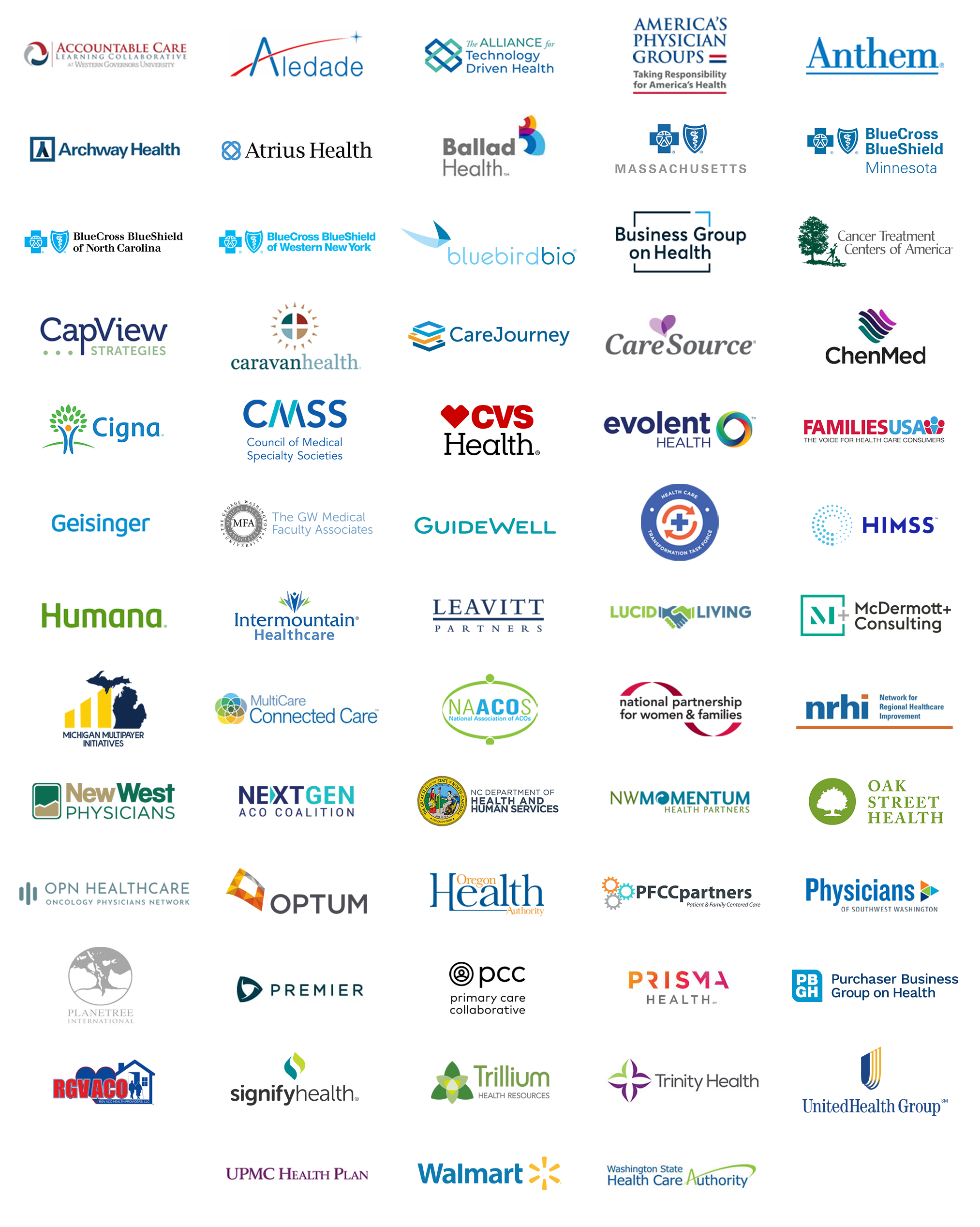
Focusing on appropriateness, care variation, and person-centered care for all patients through dissemination of best practices.
Ensuring providers adopt timely data and analytics capabilities, combining multiple data sources (e.g., electronic health record and claims data), to enable successful participation in value-based payment models.
Providing patients and caregivers with cost, quality, and appropriateness of care data in an actionable, easily understood, and accessible manner. Ensuring that electronic data can be easily shared meeting advanced technology standards (e.g., HL7 FHIR) to improve care delivery.
